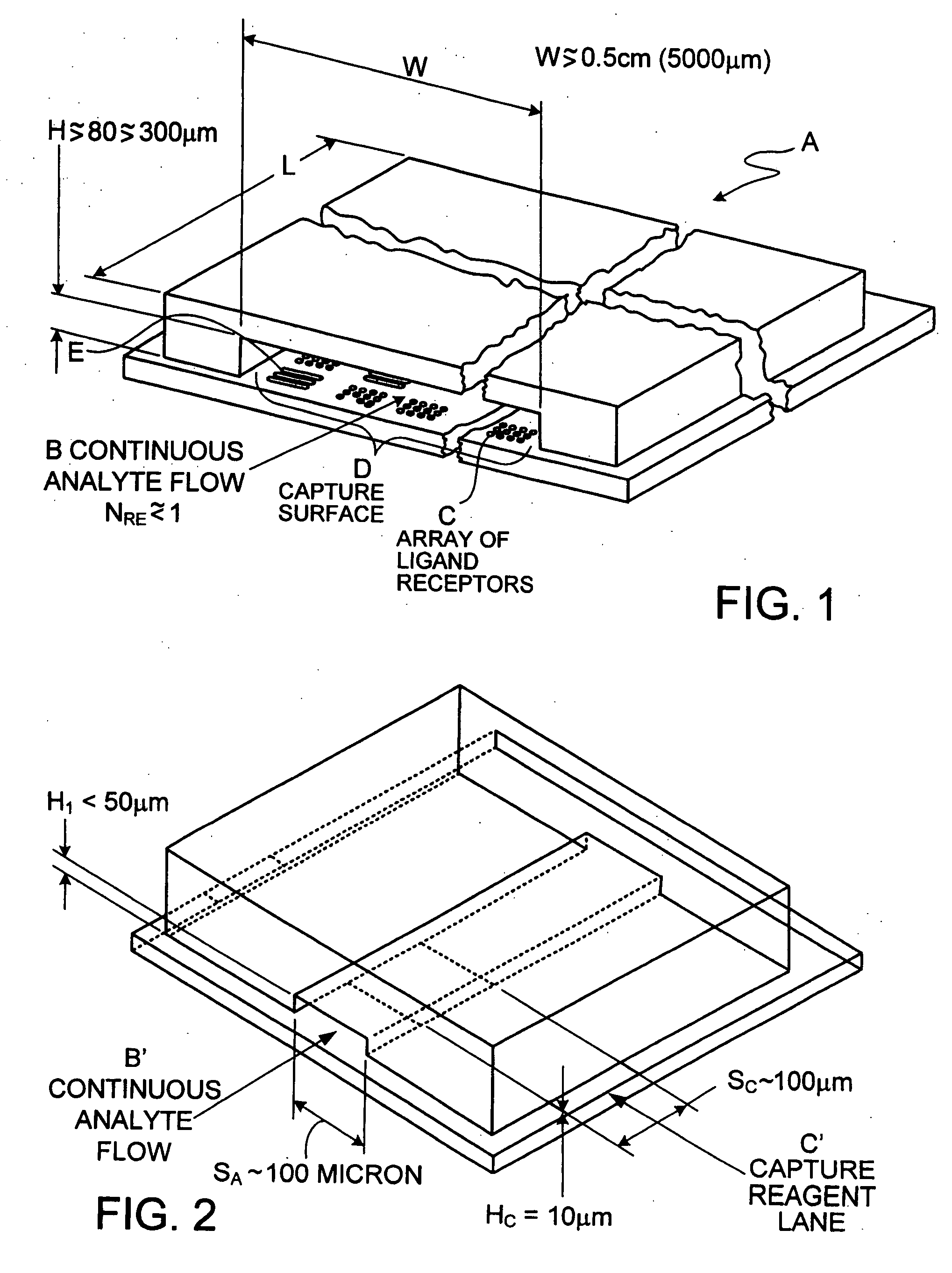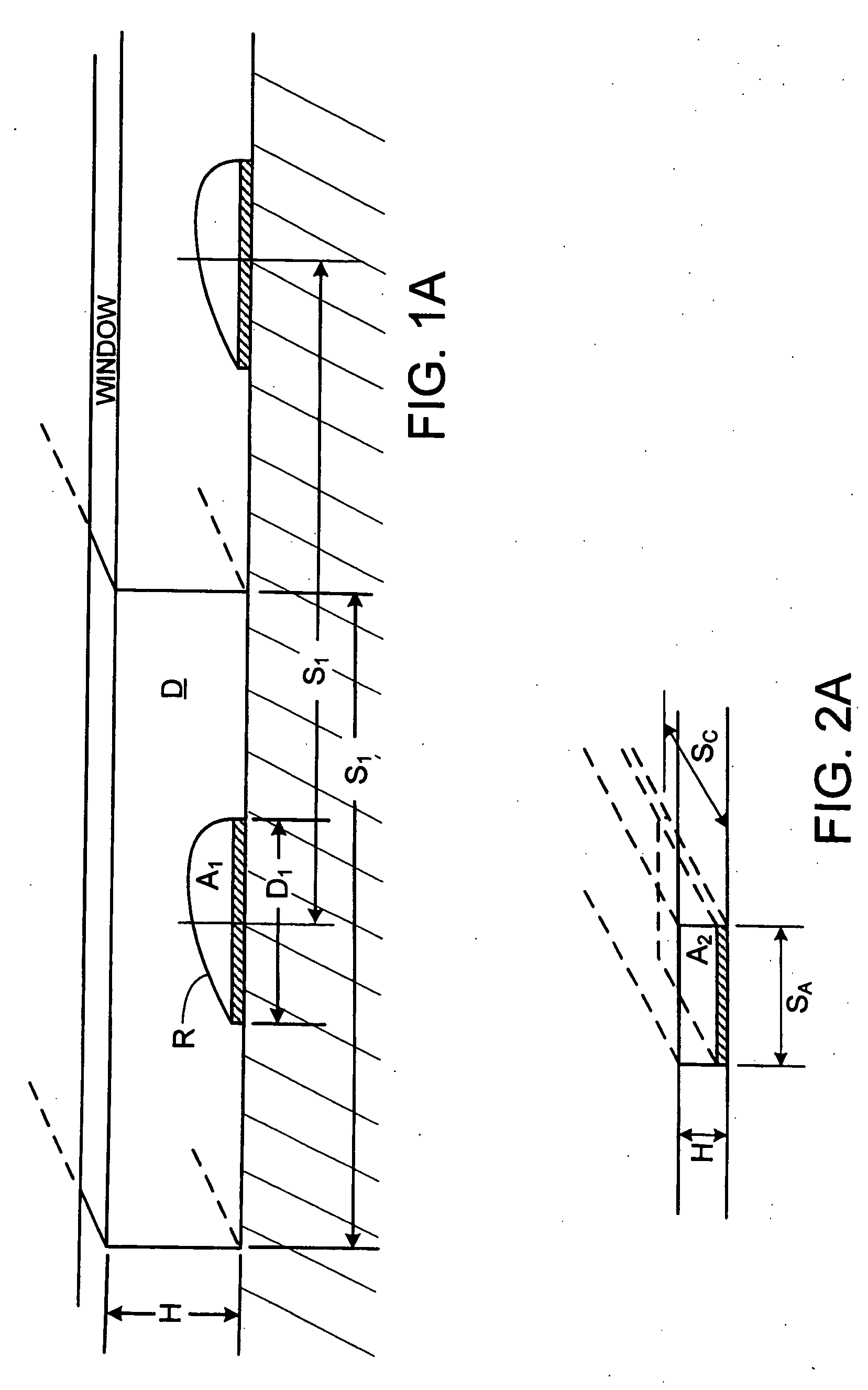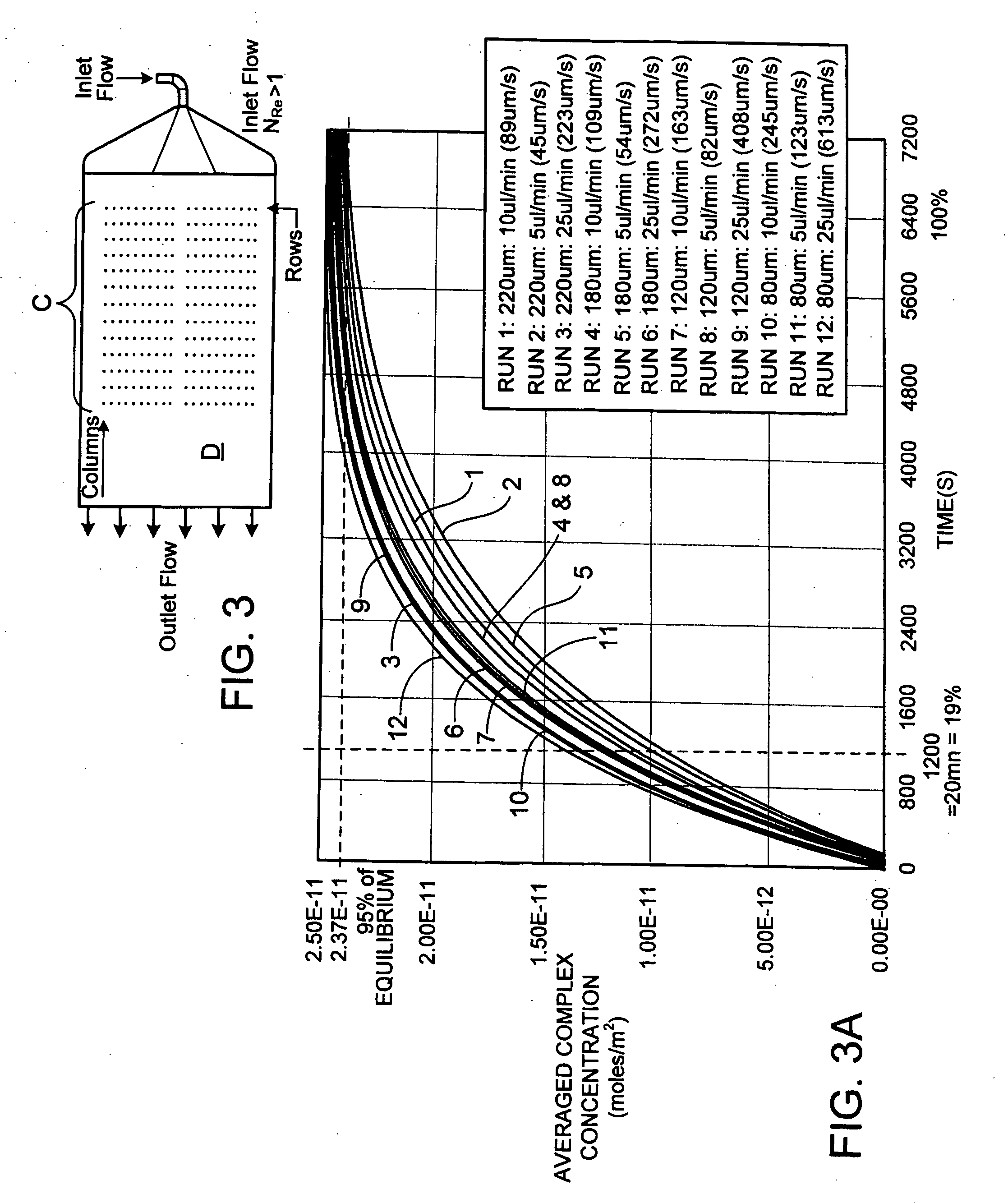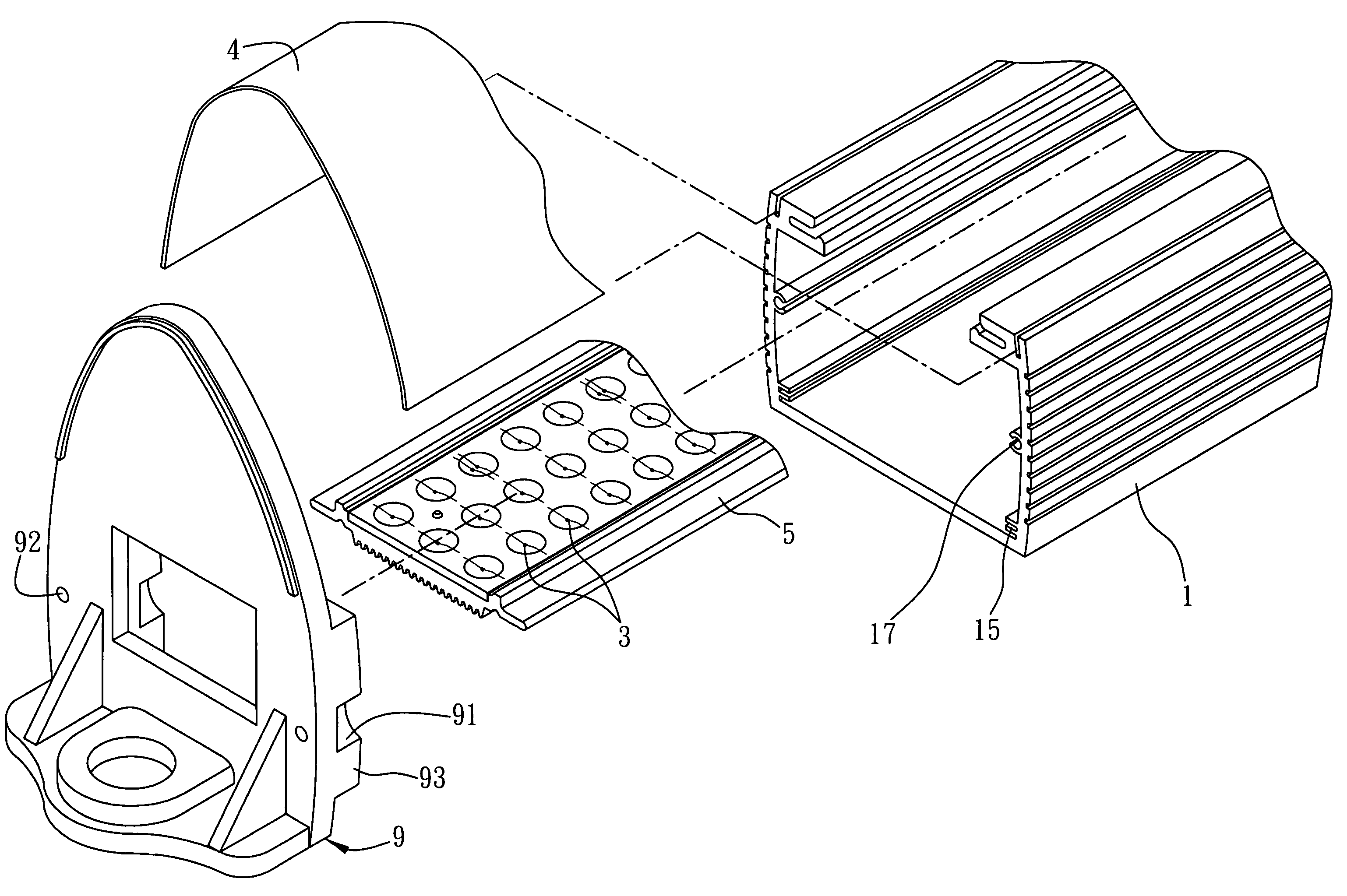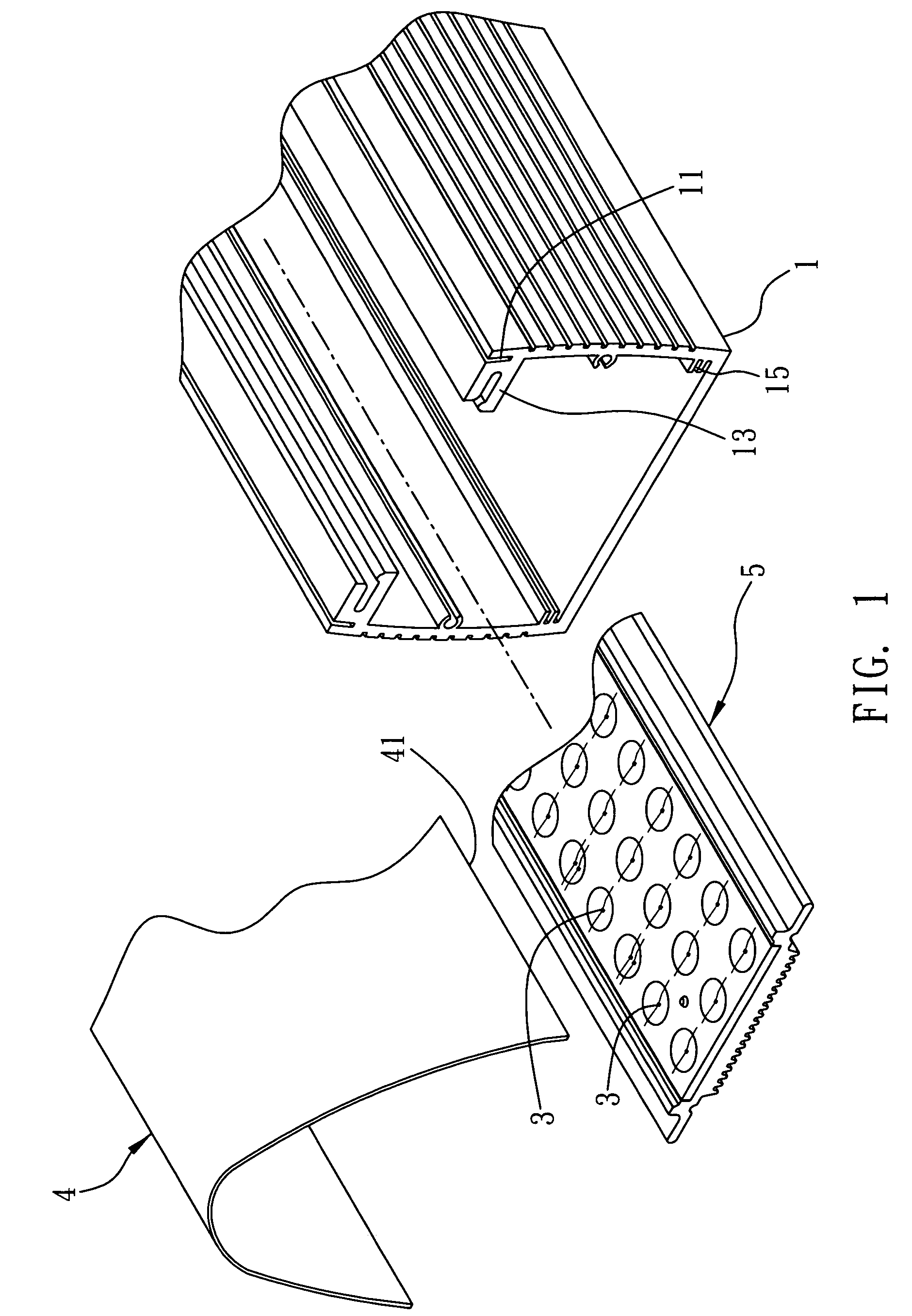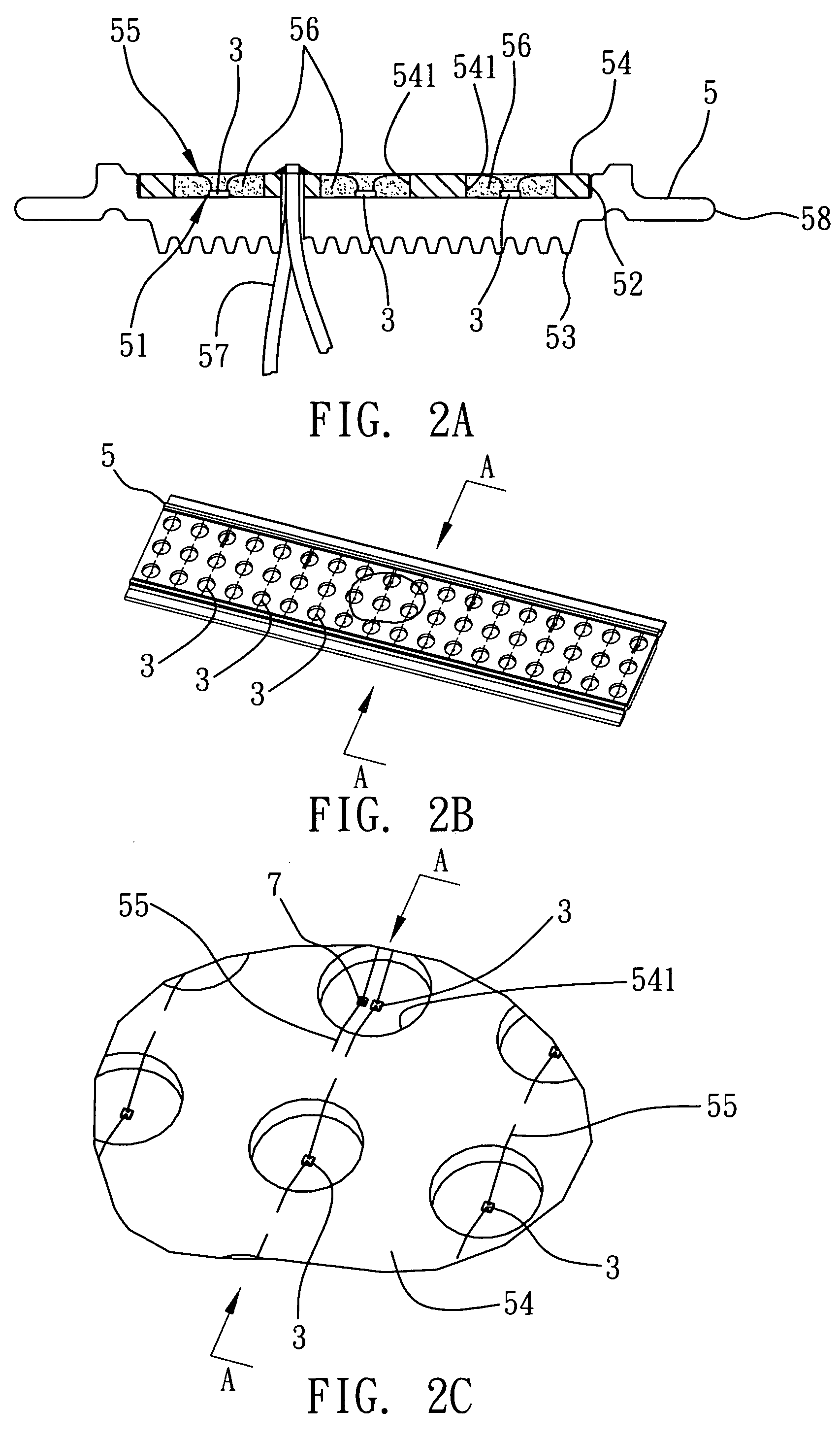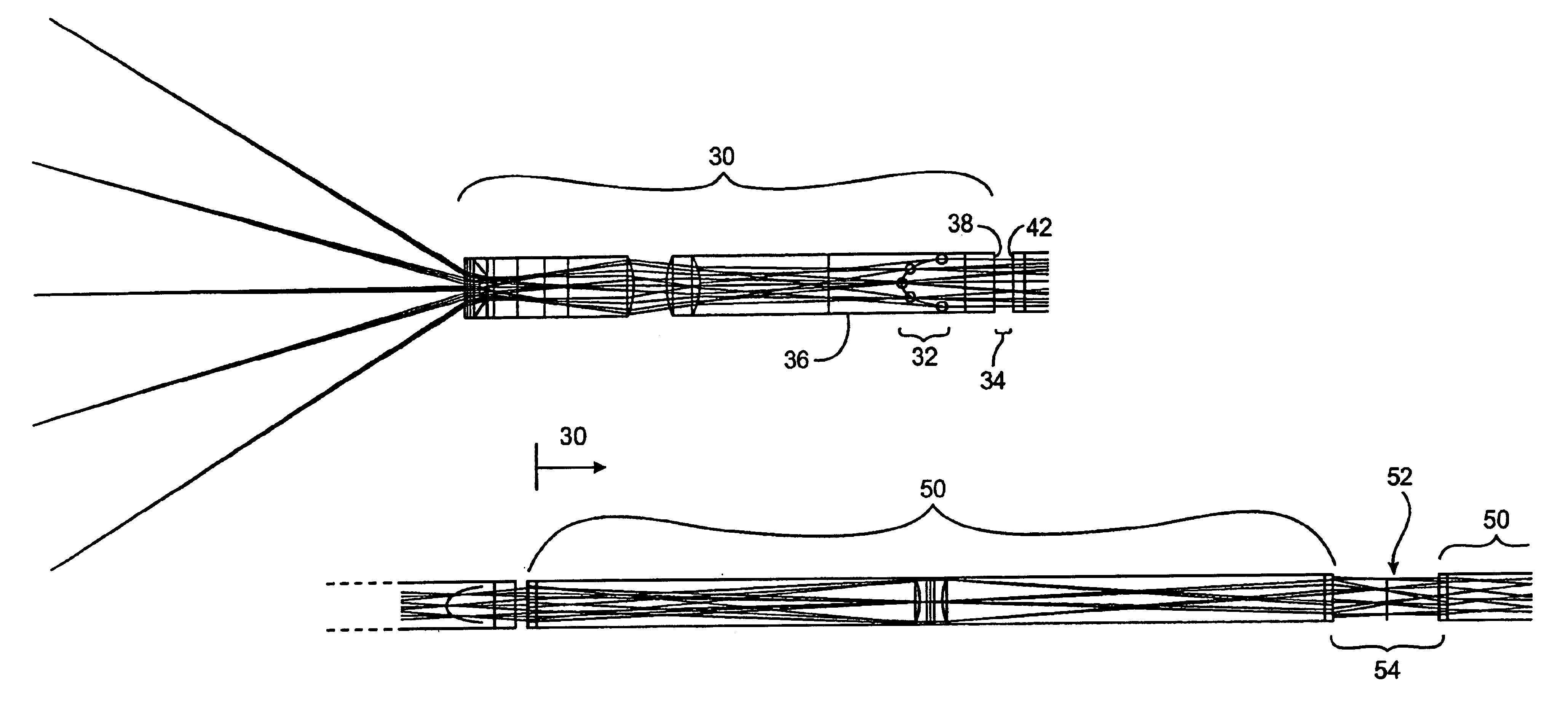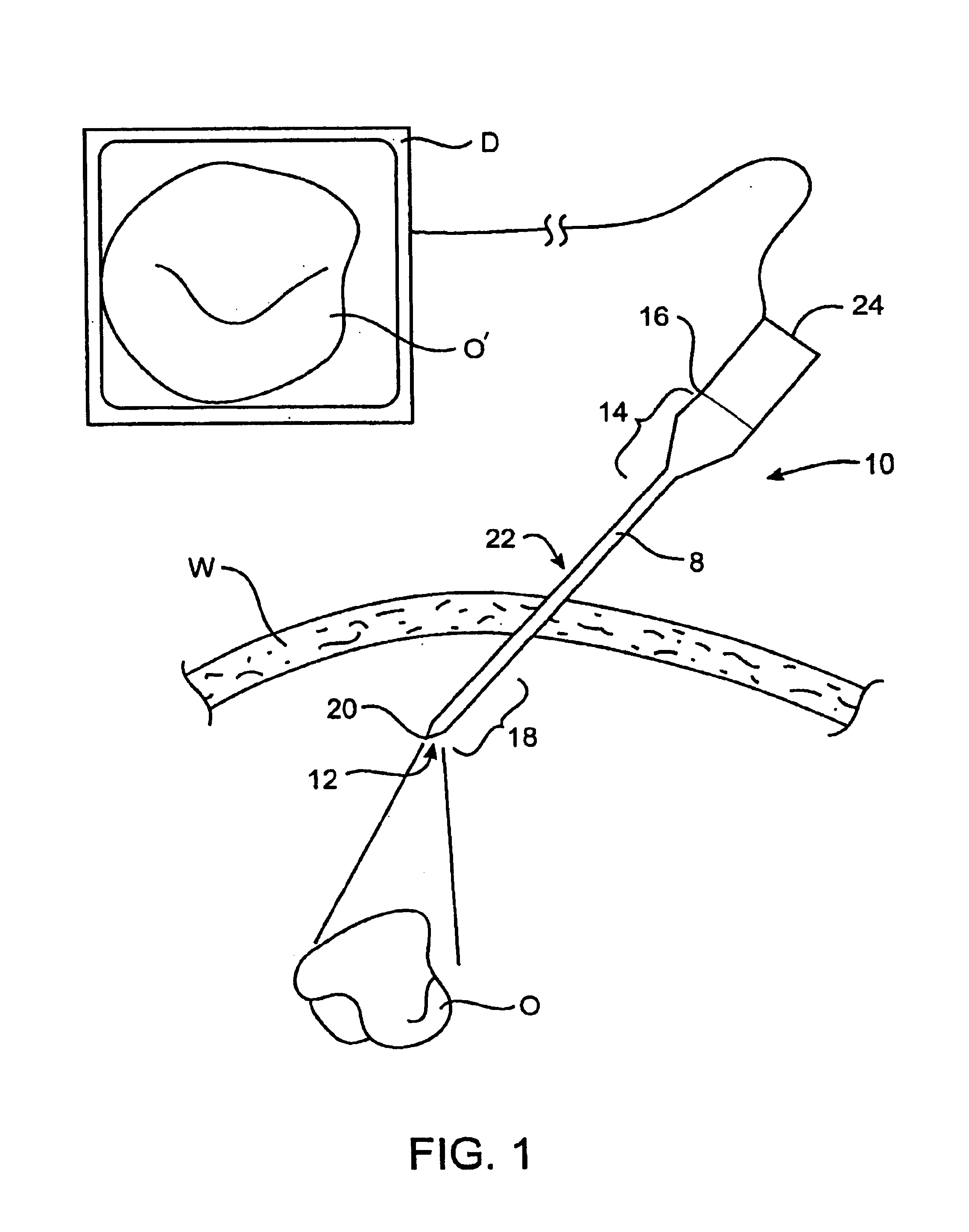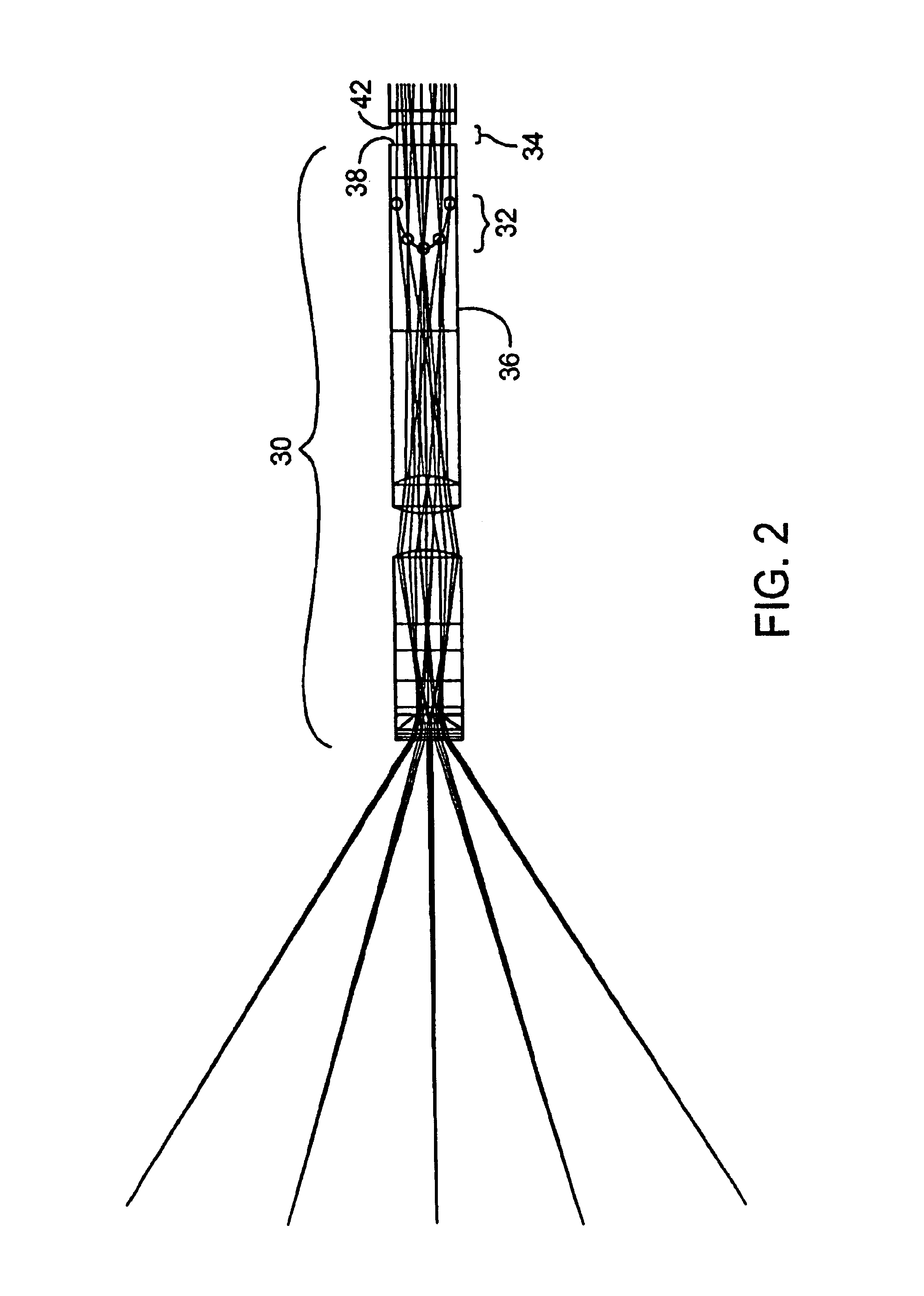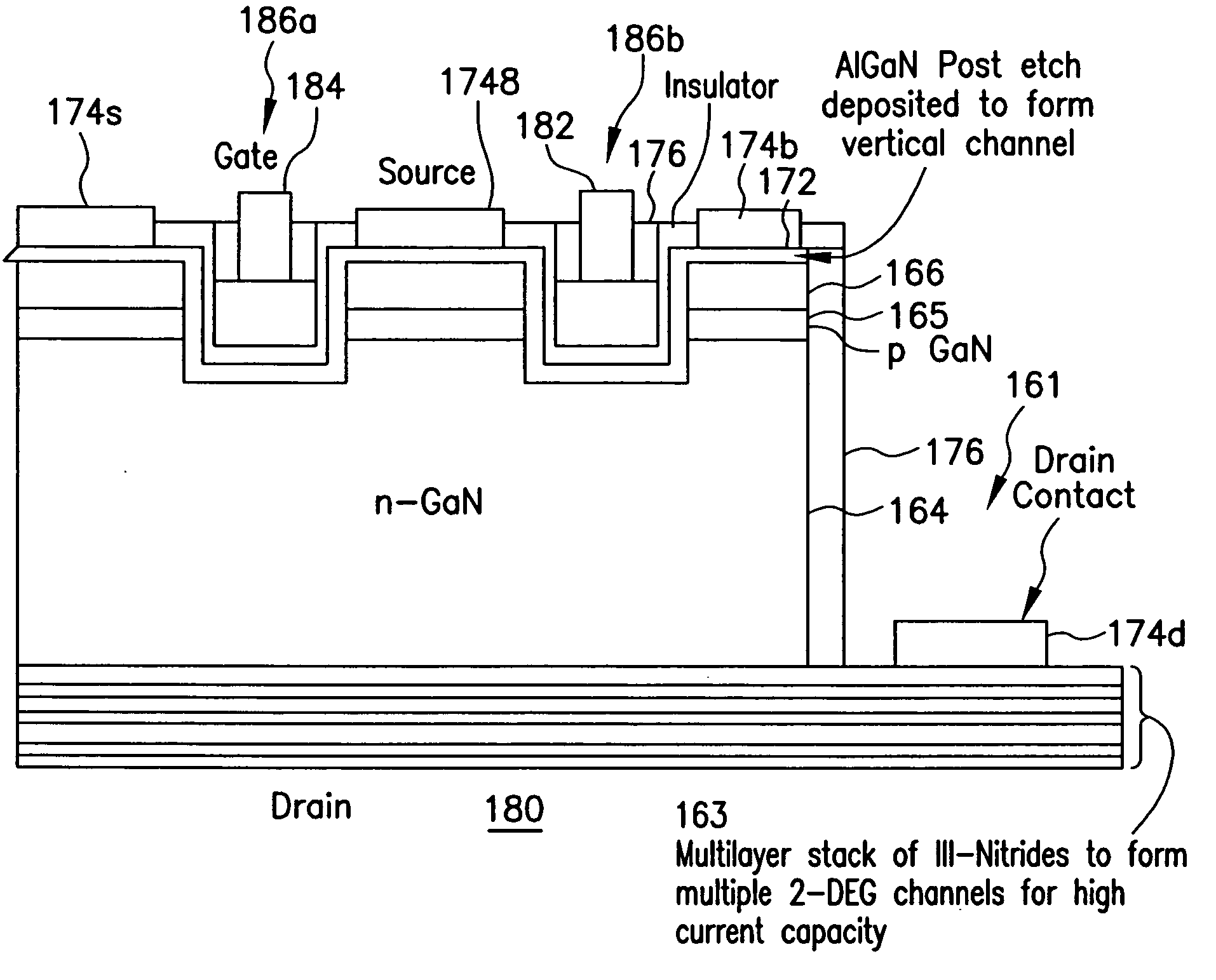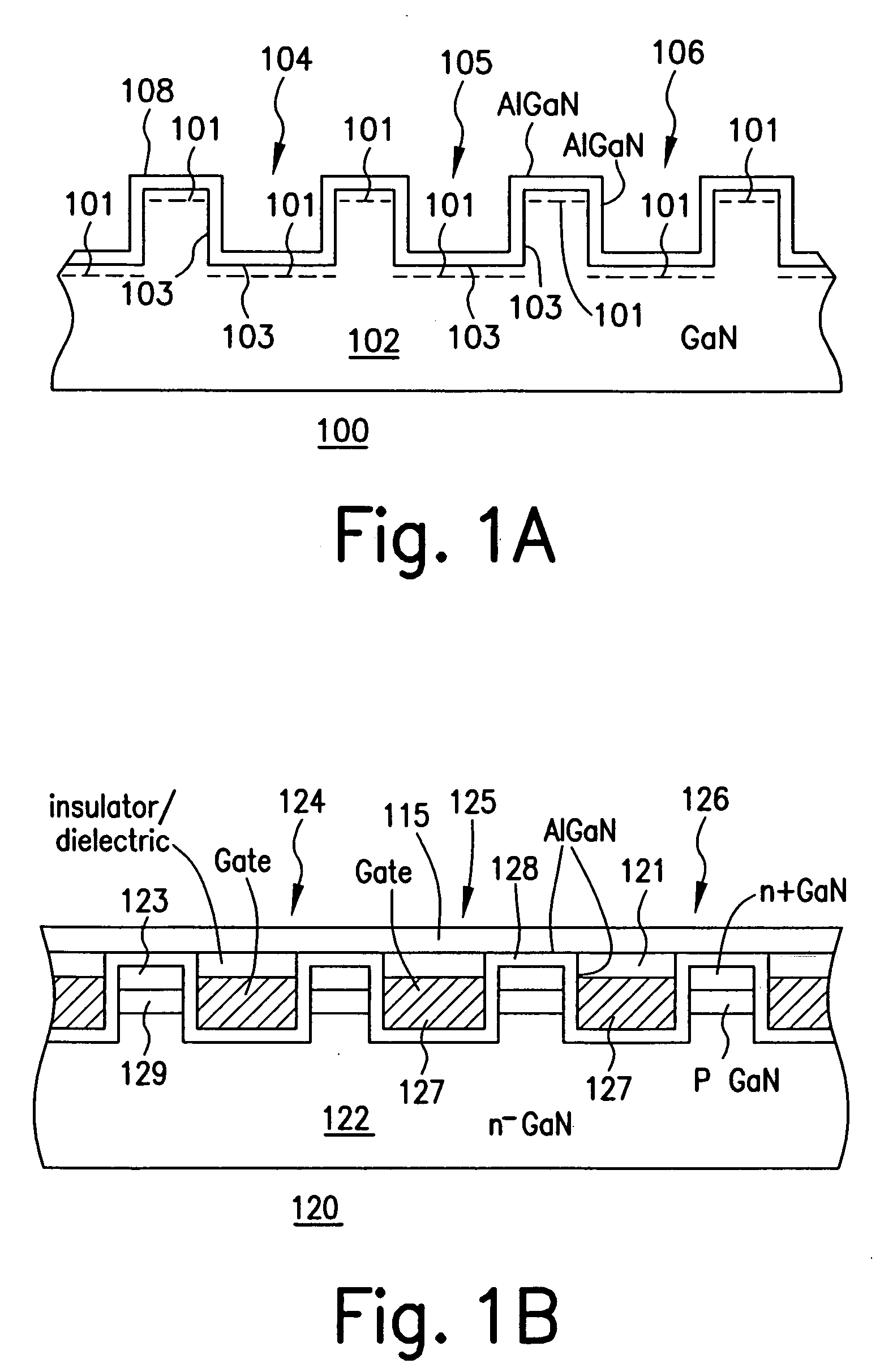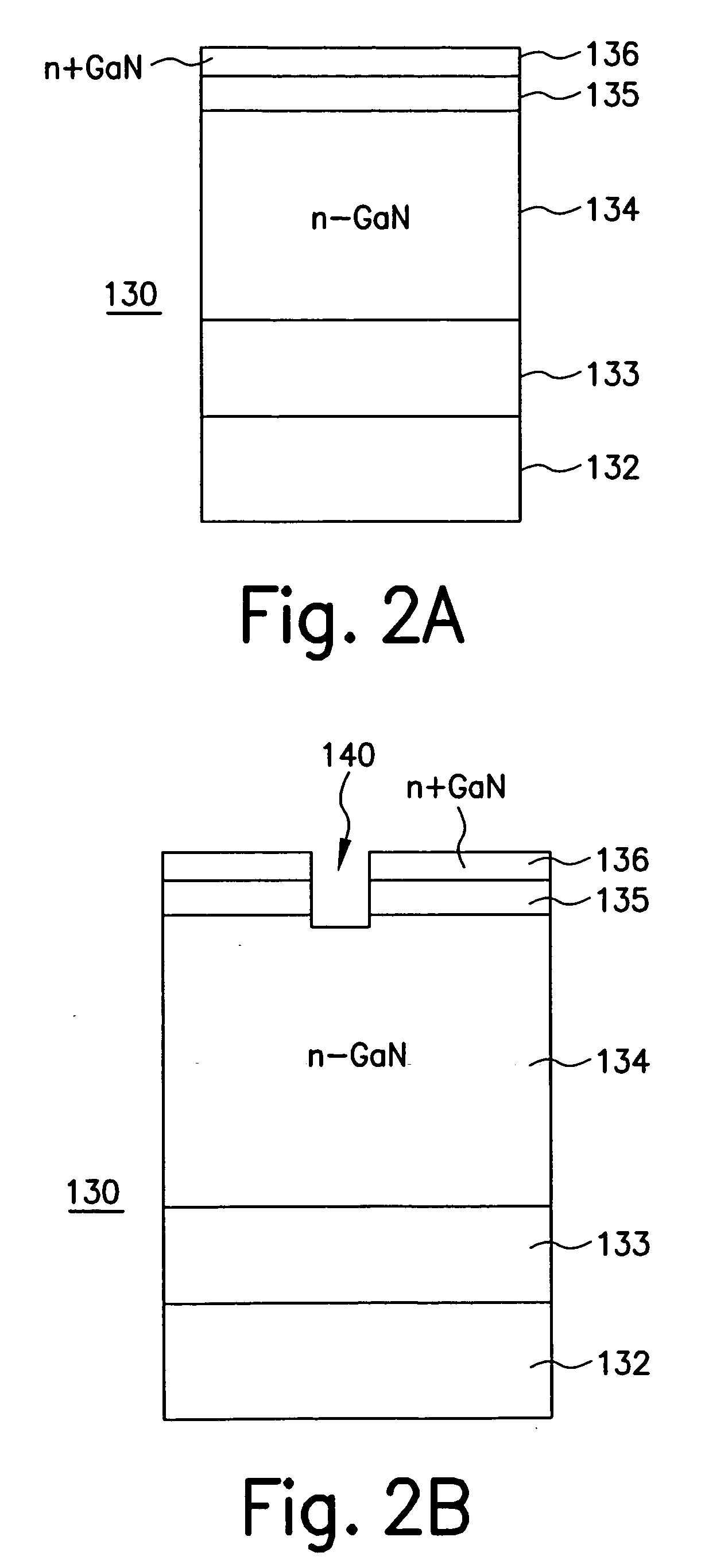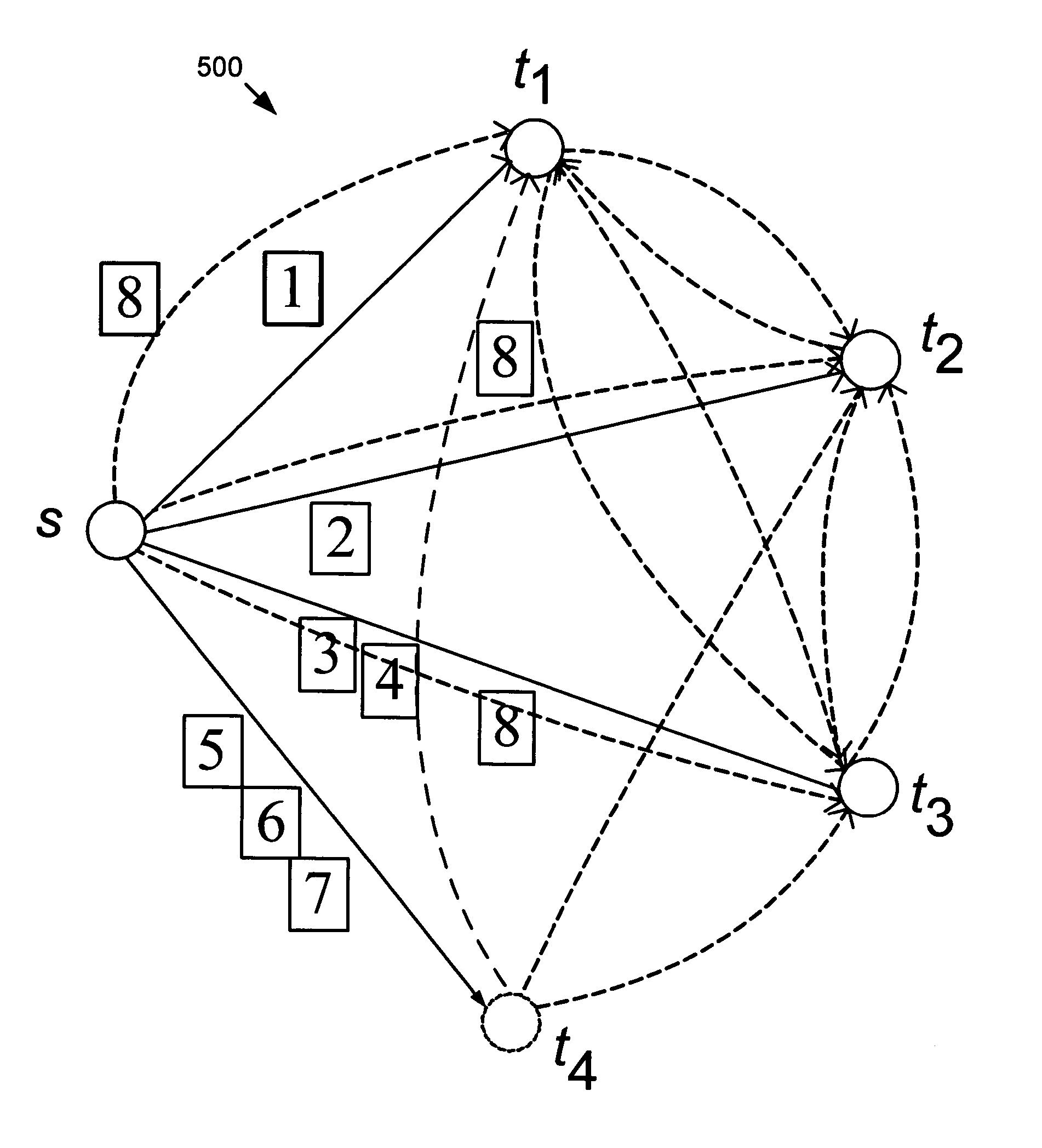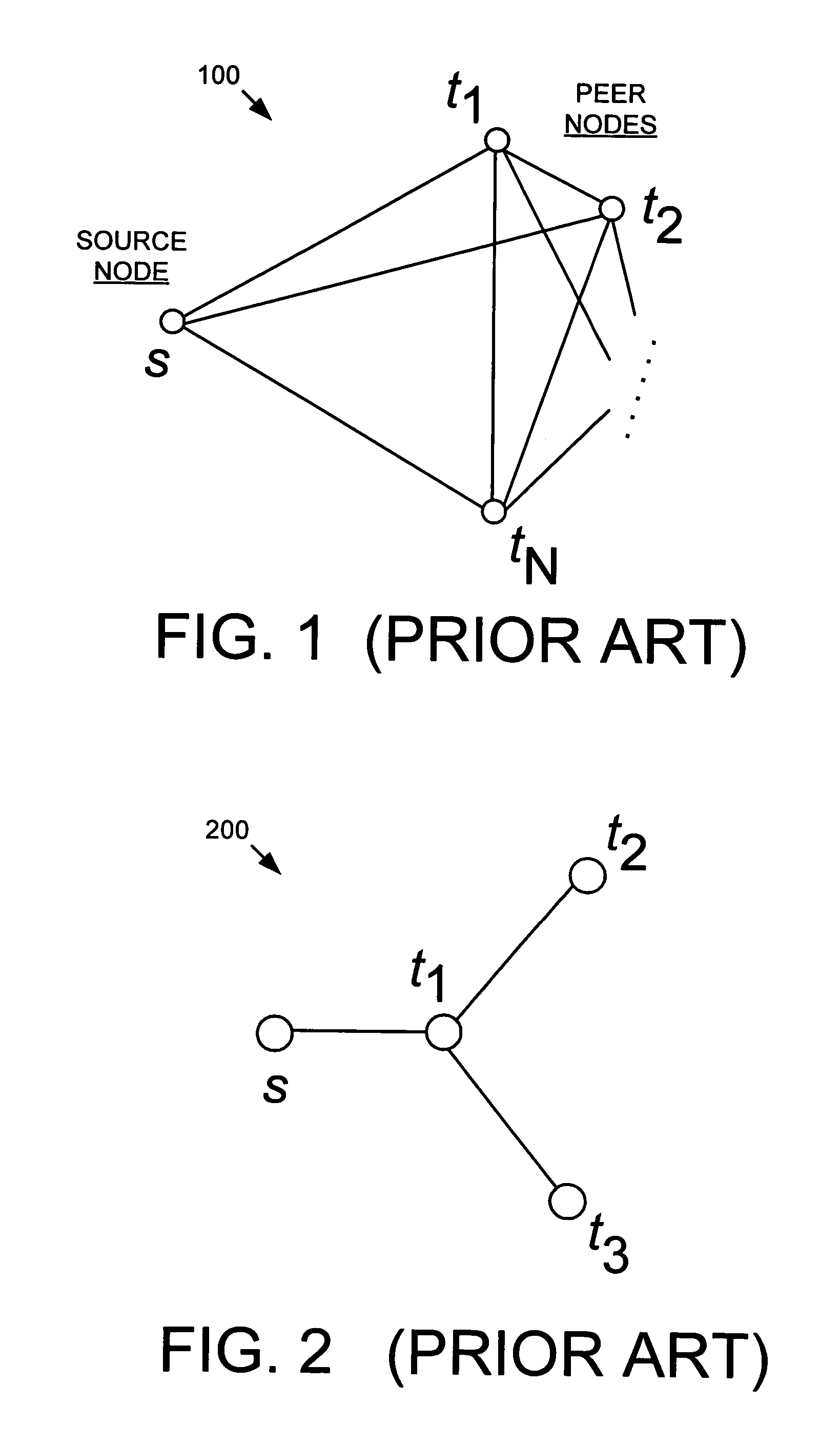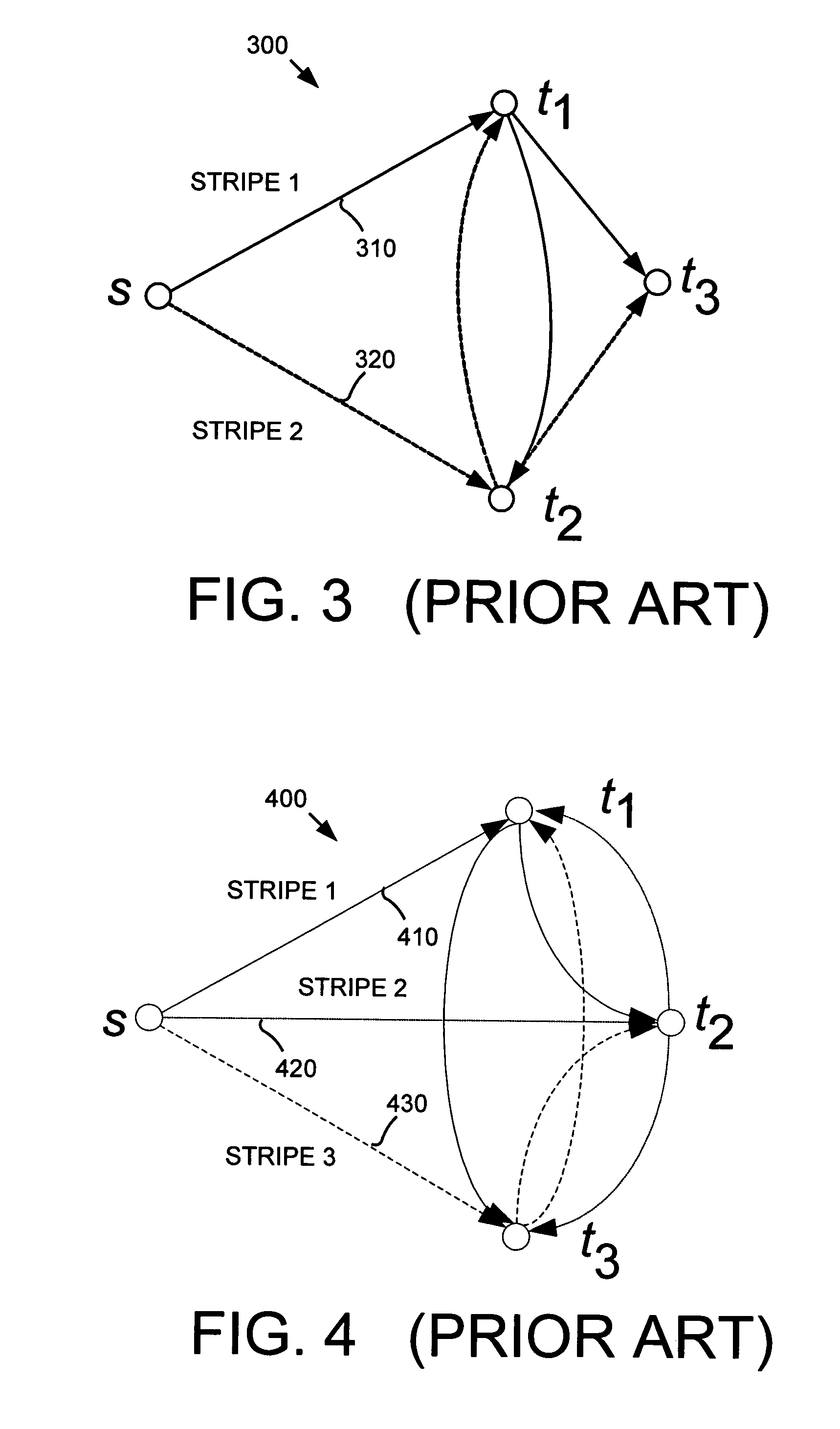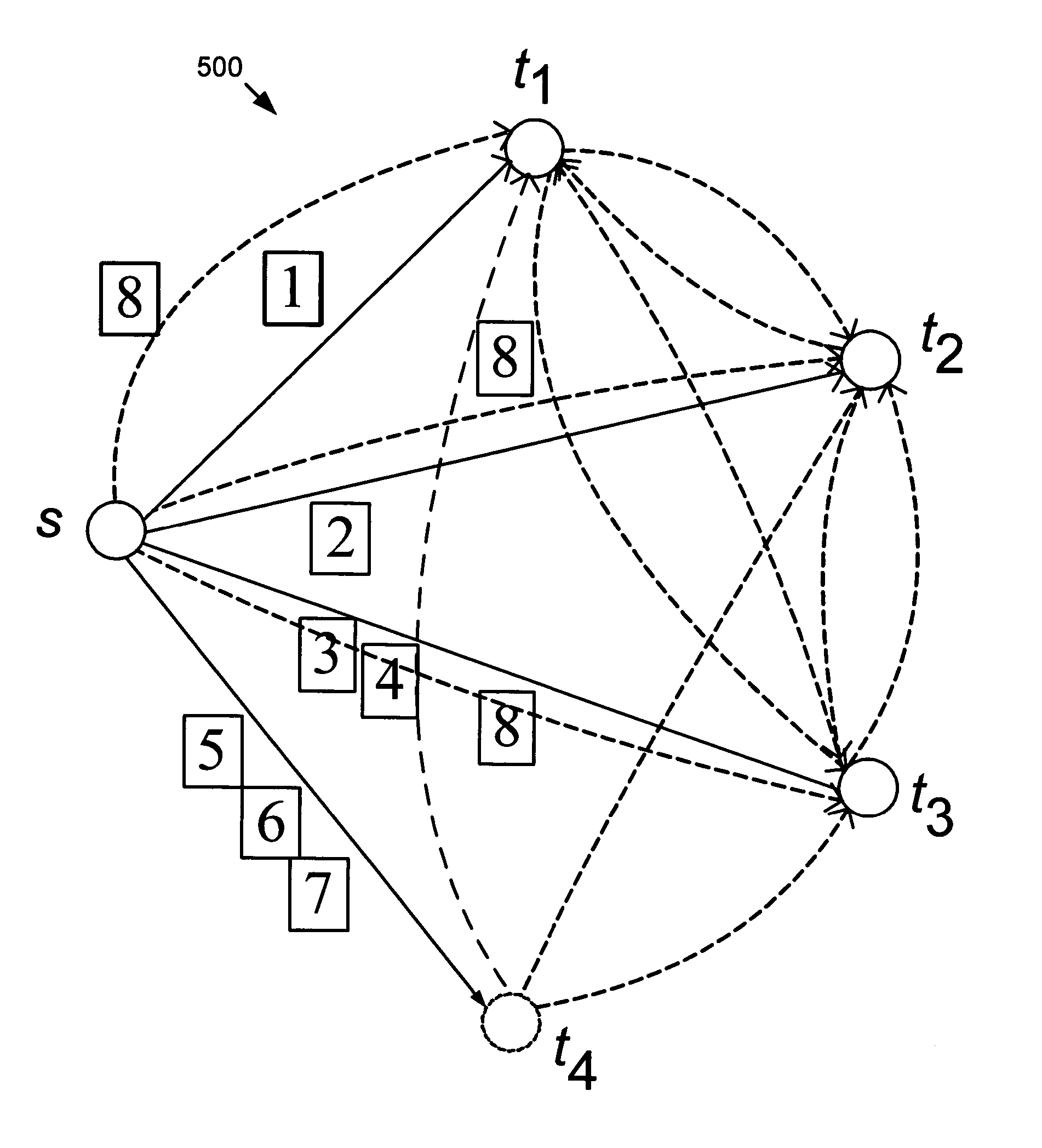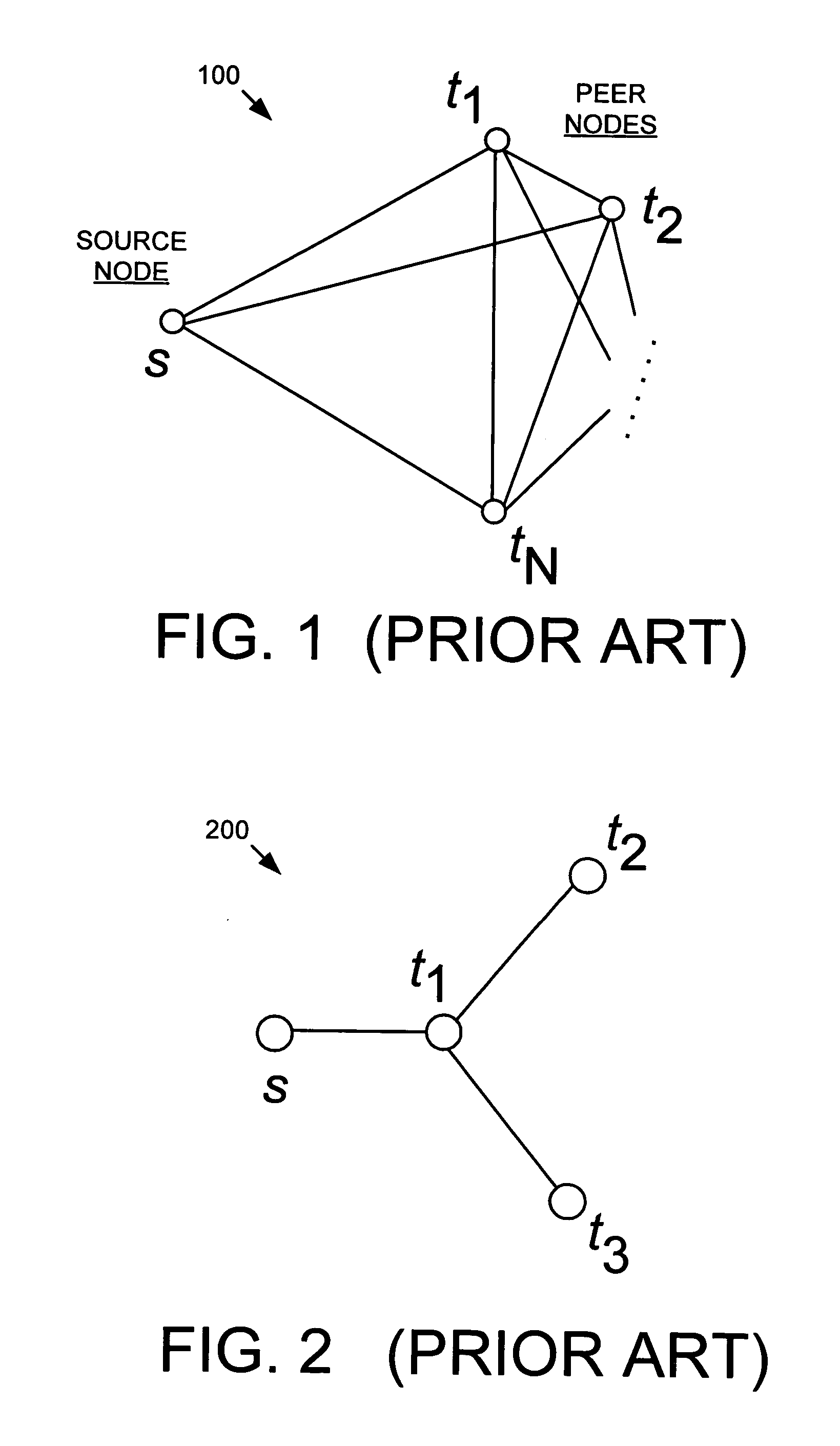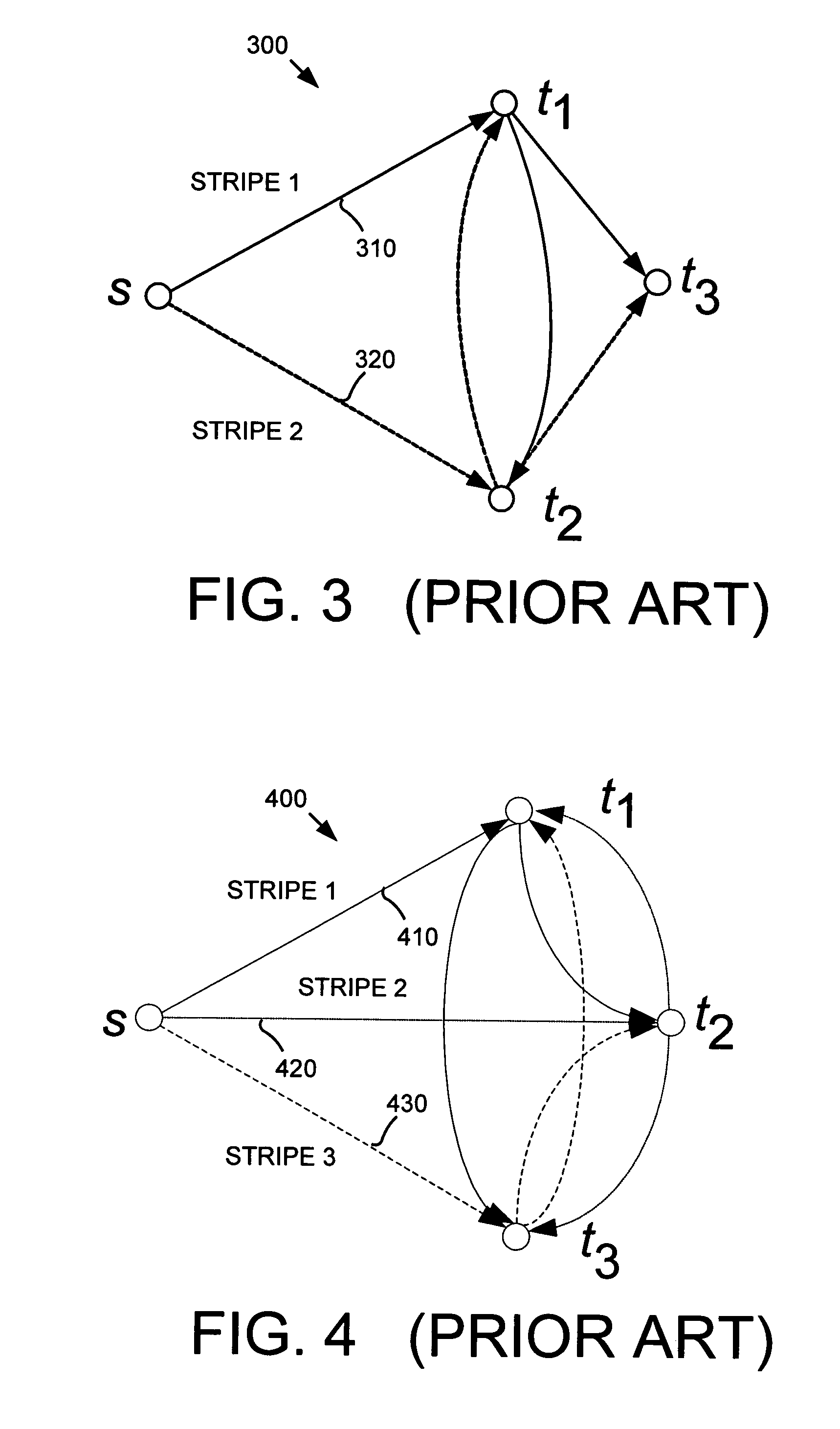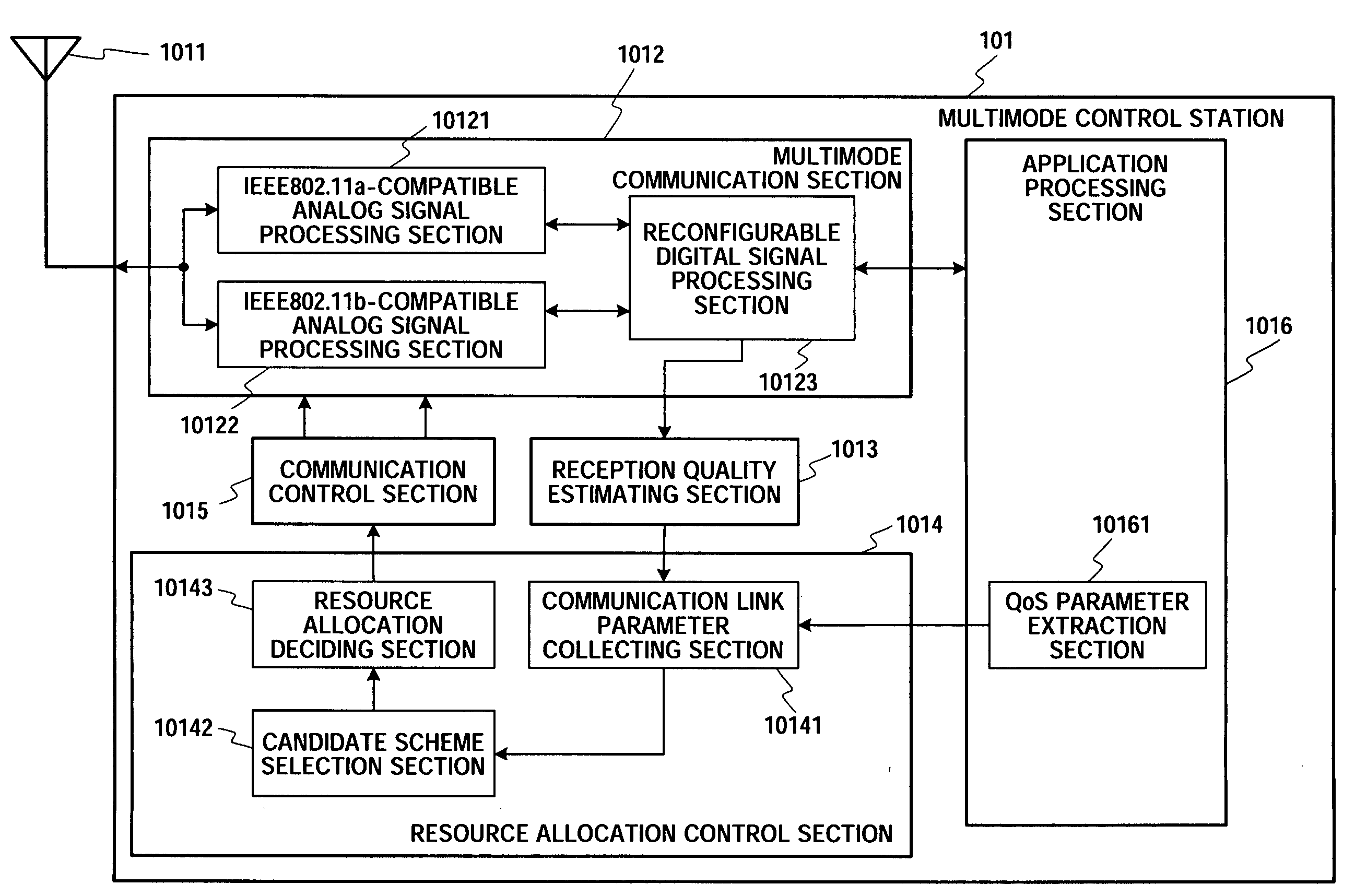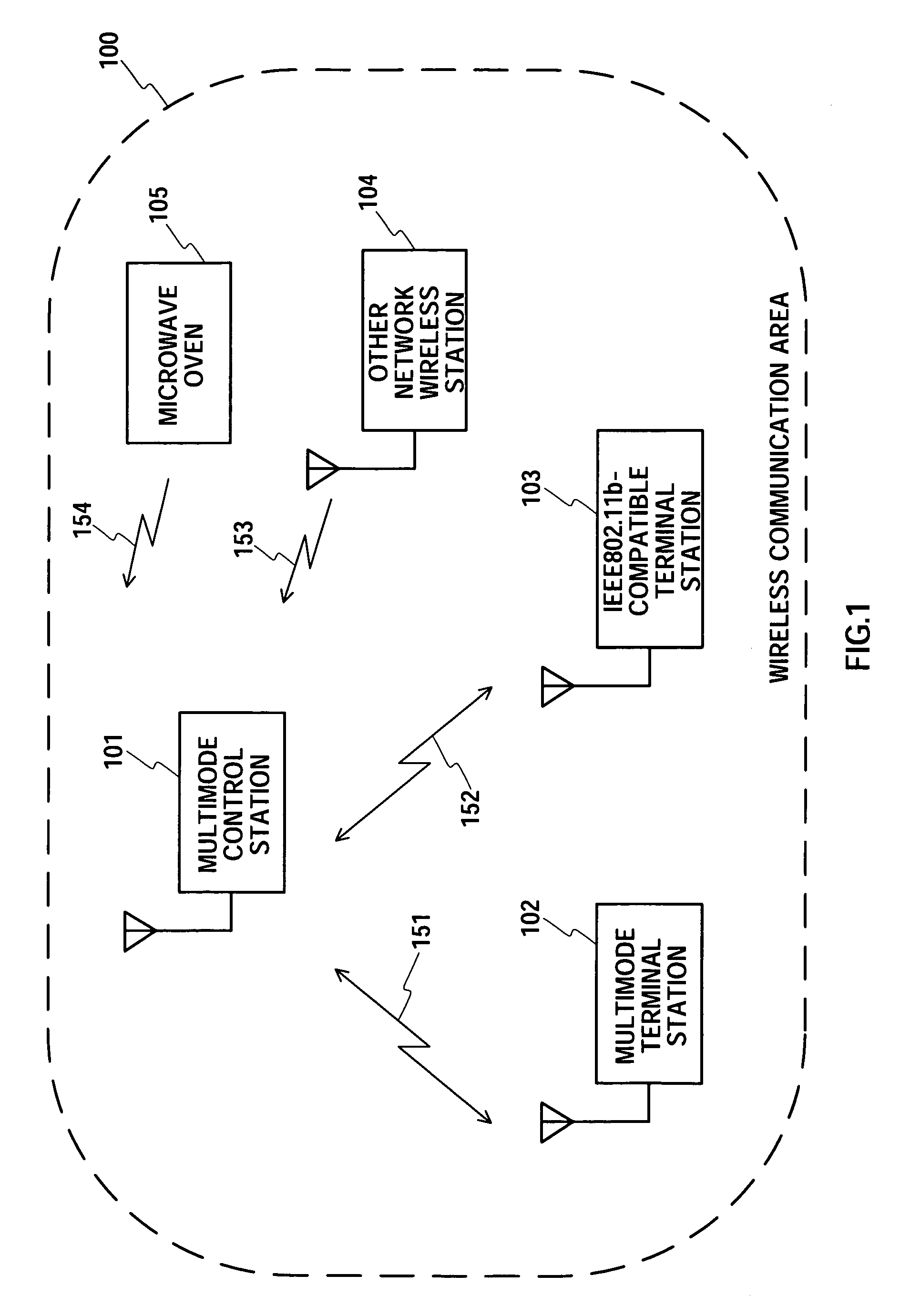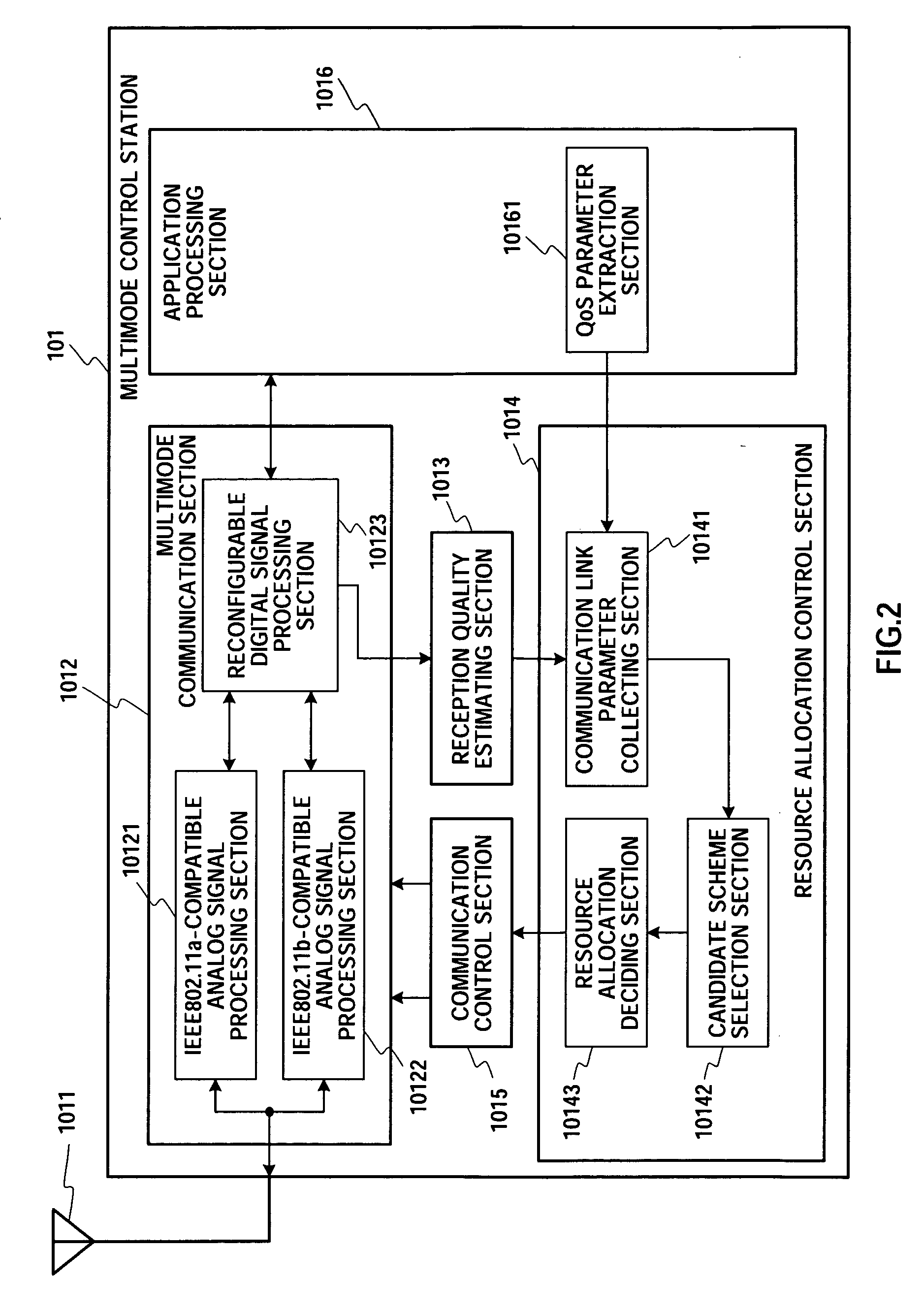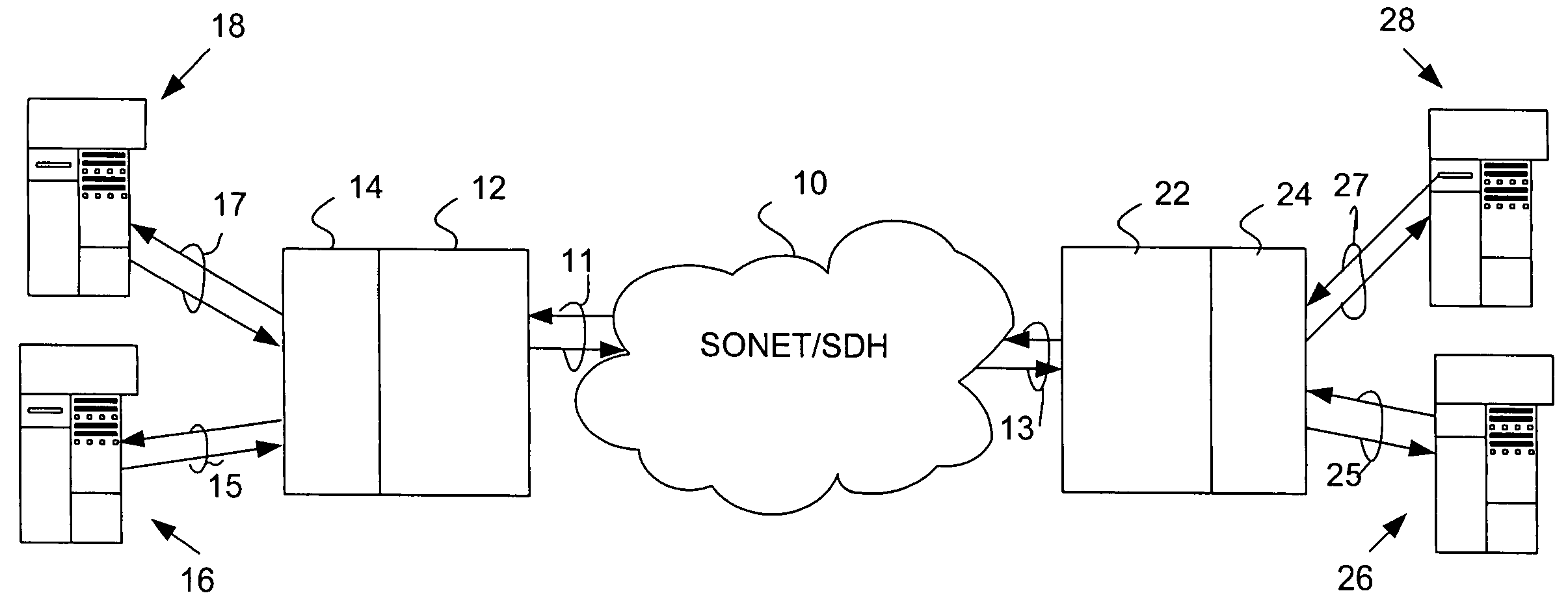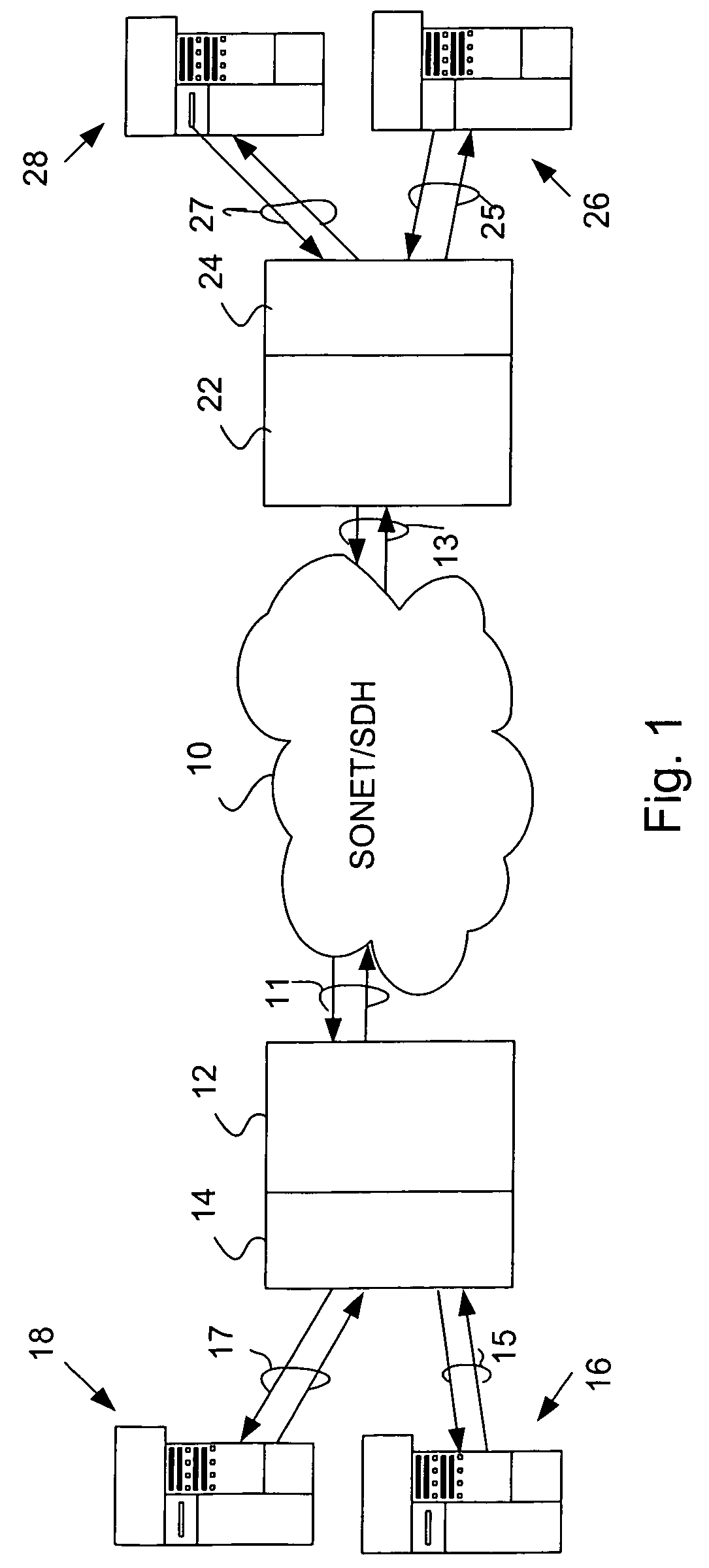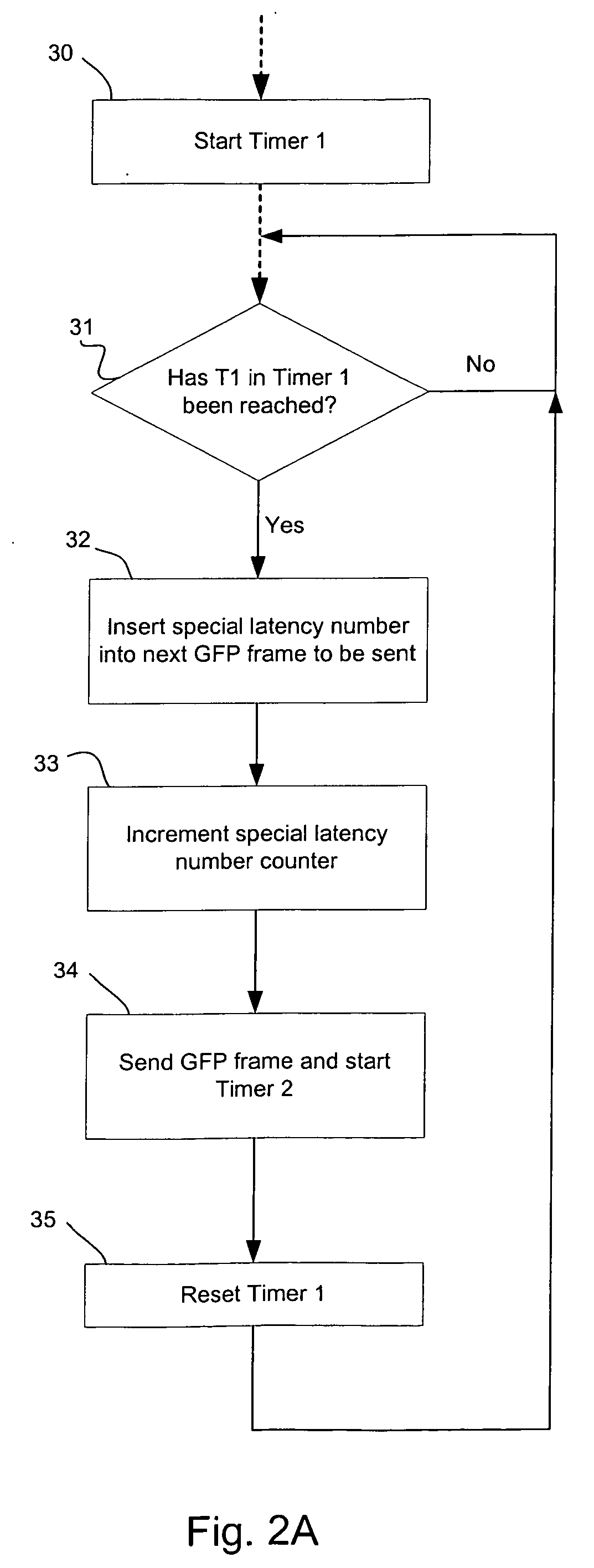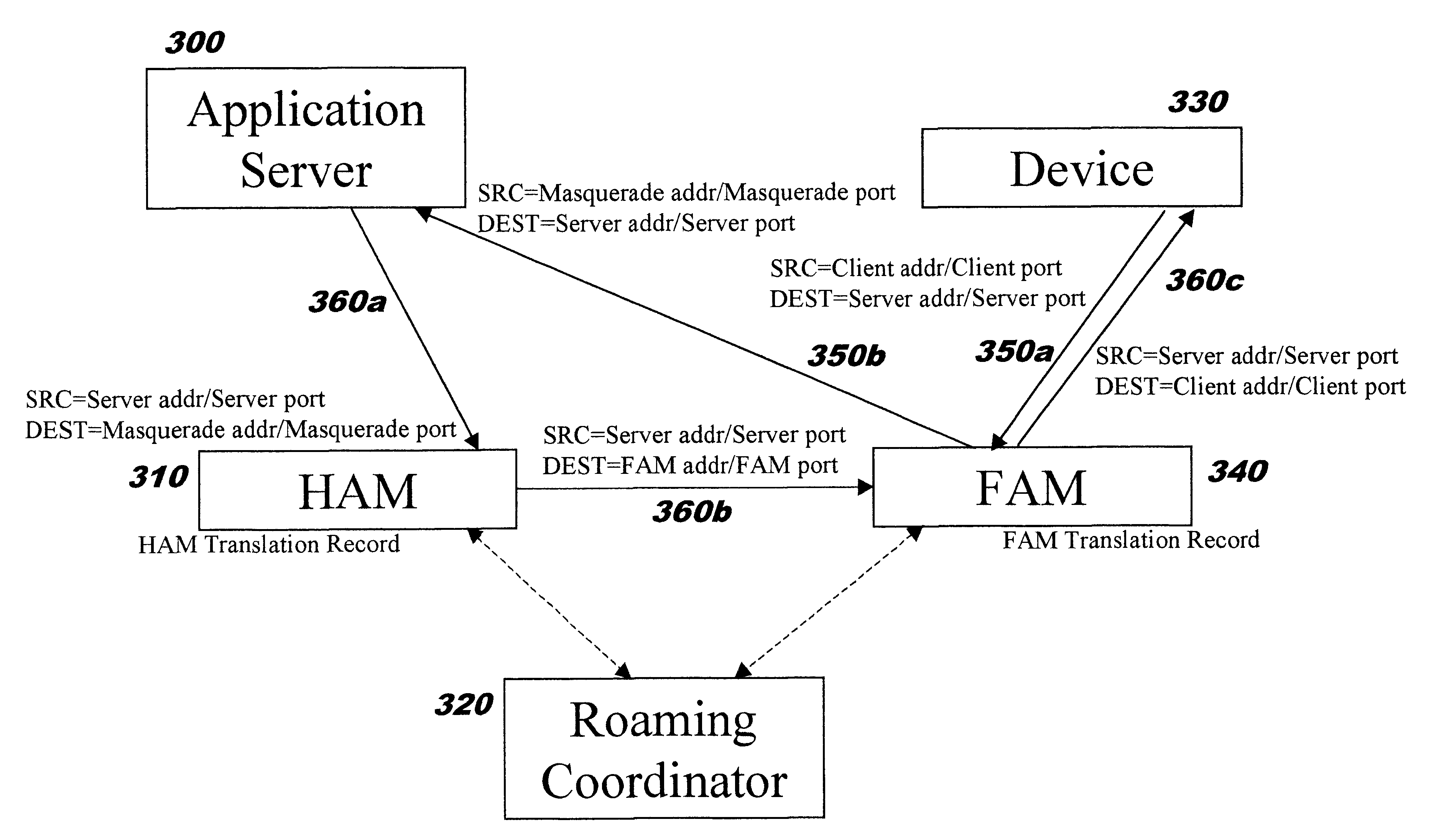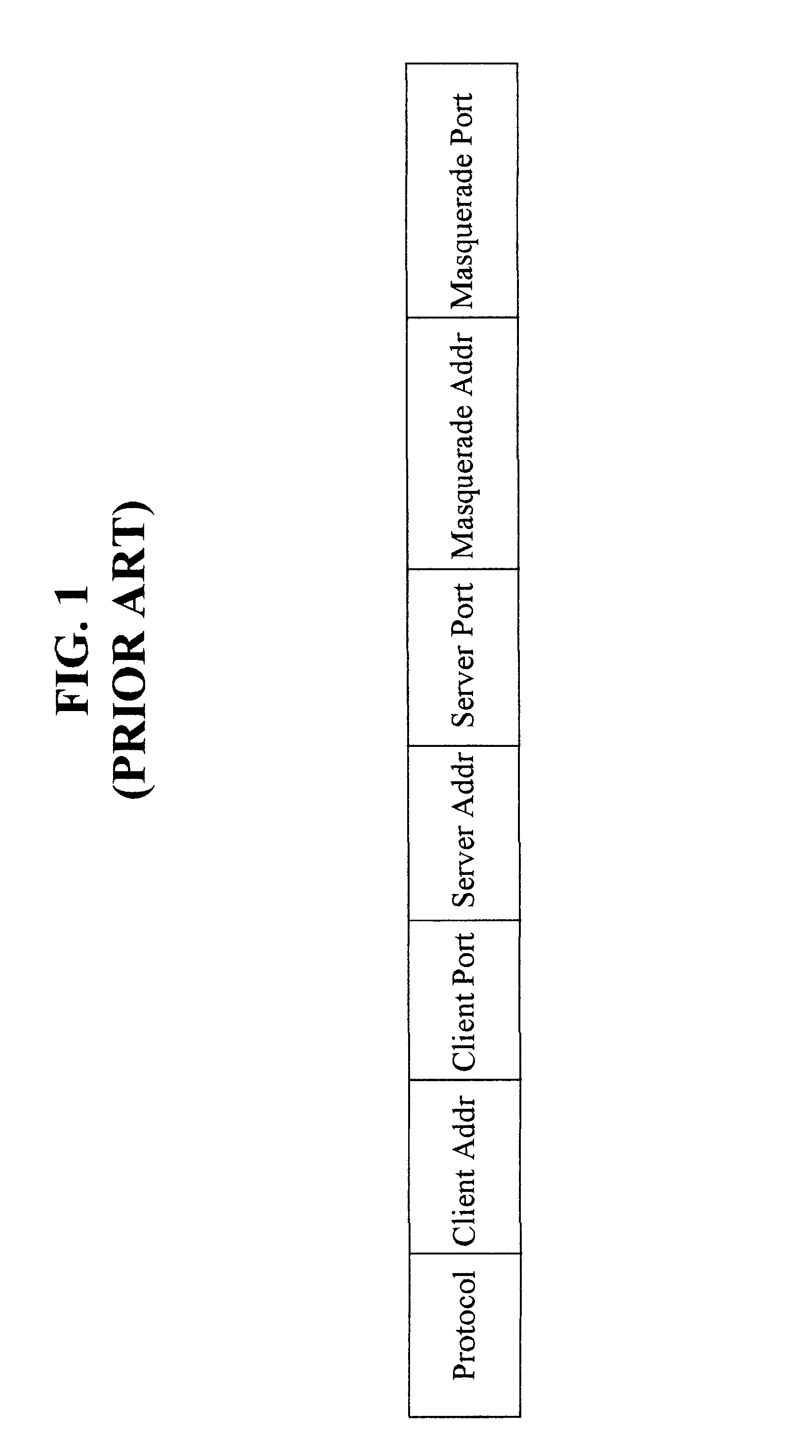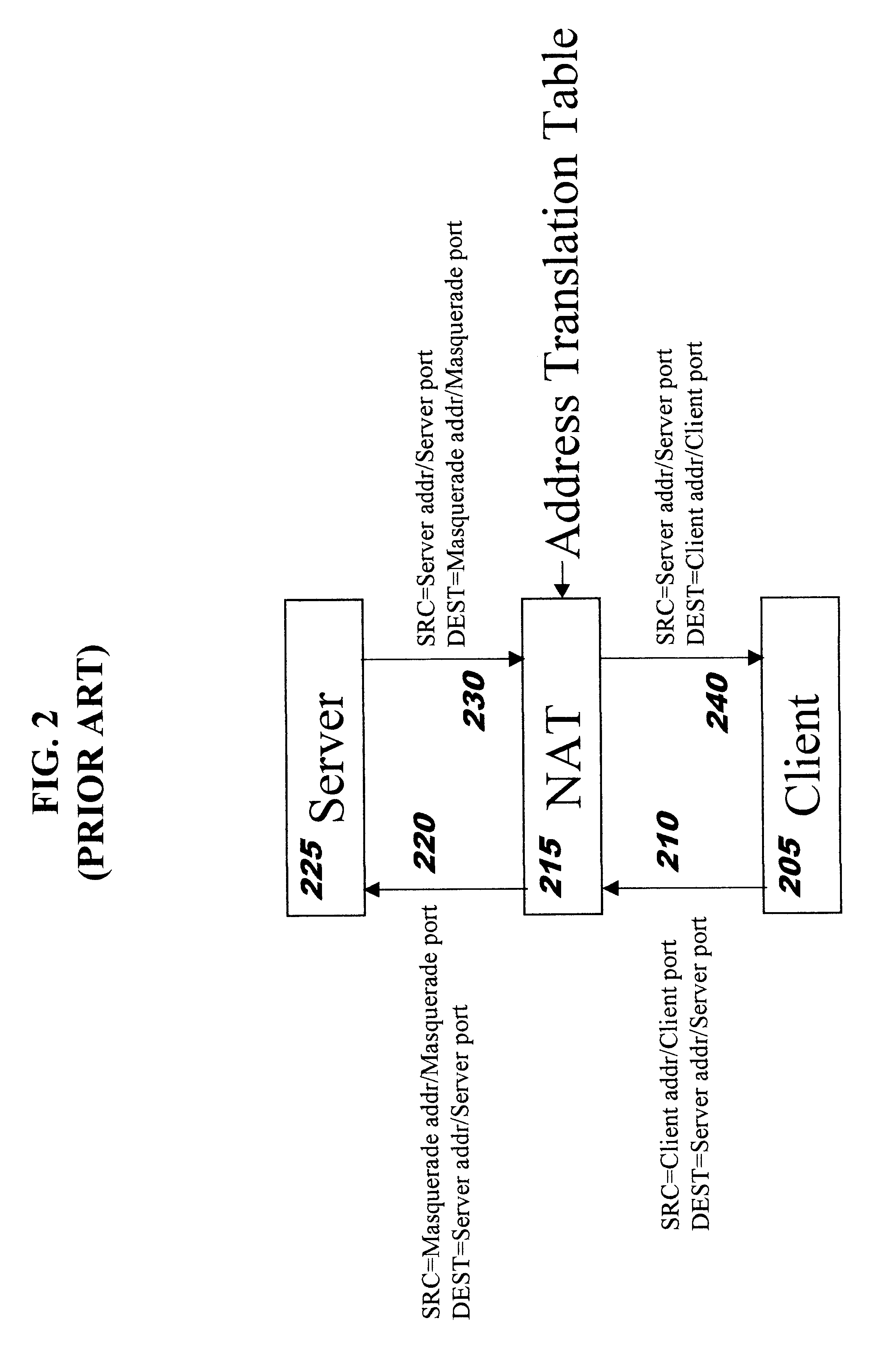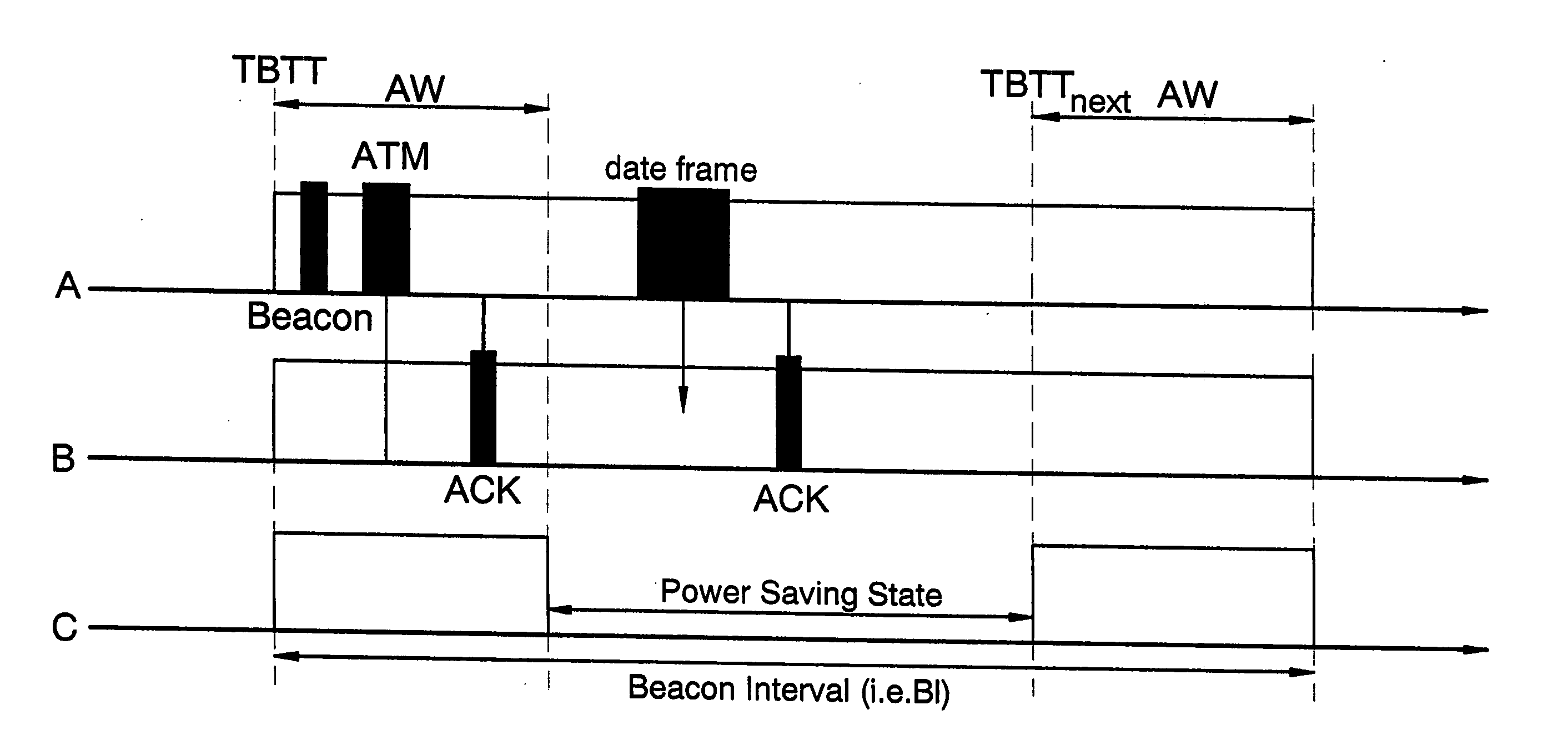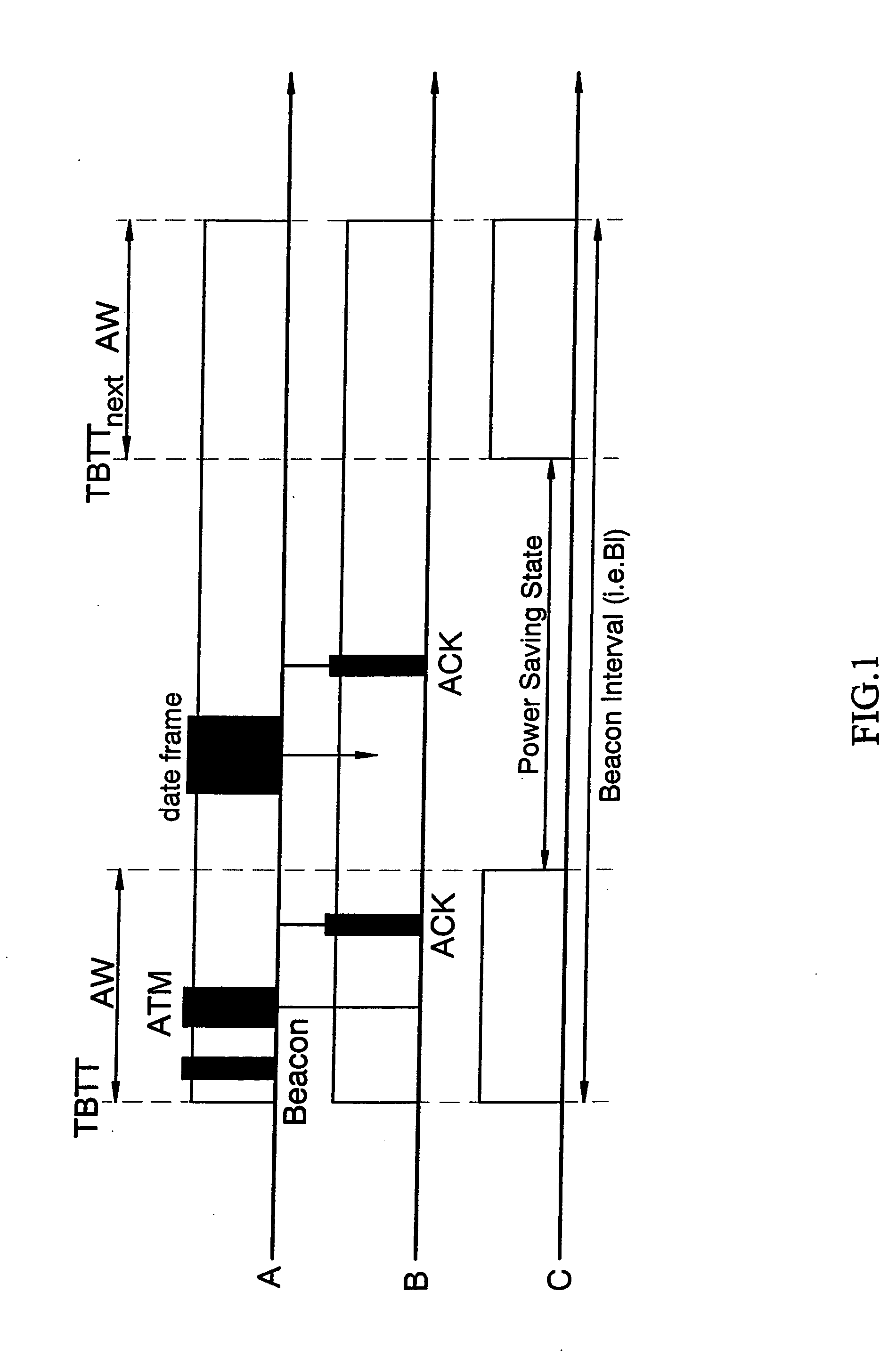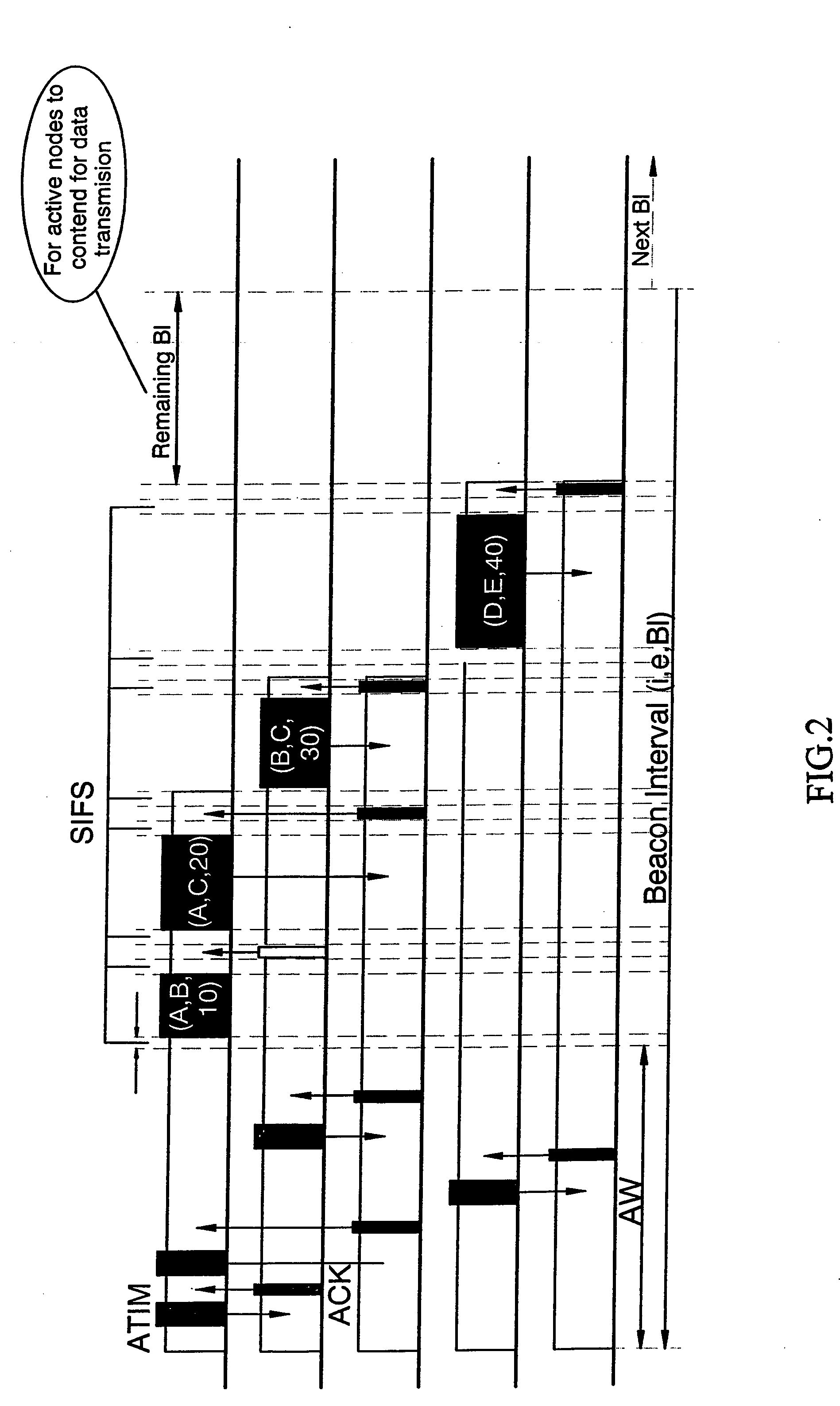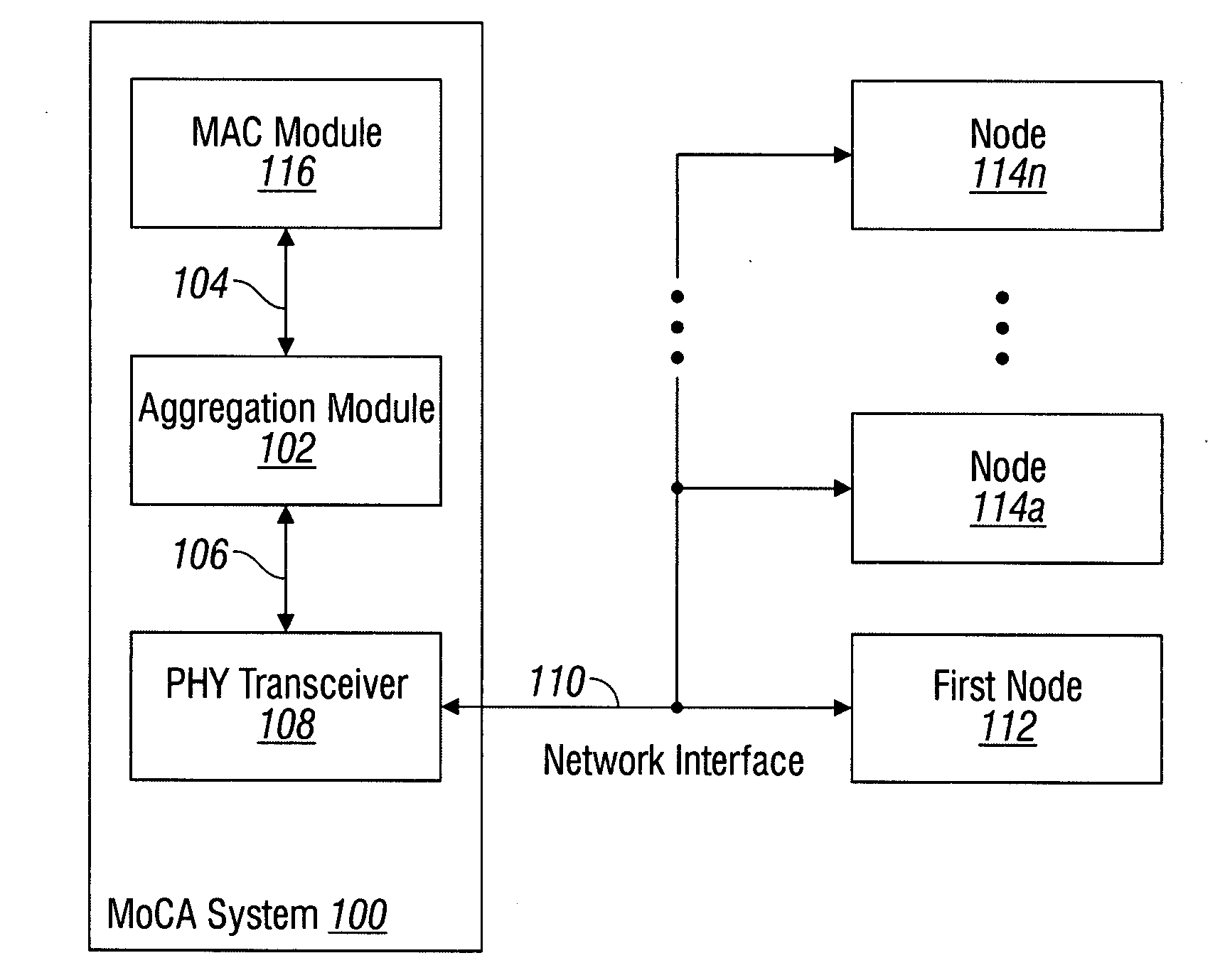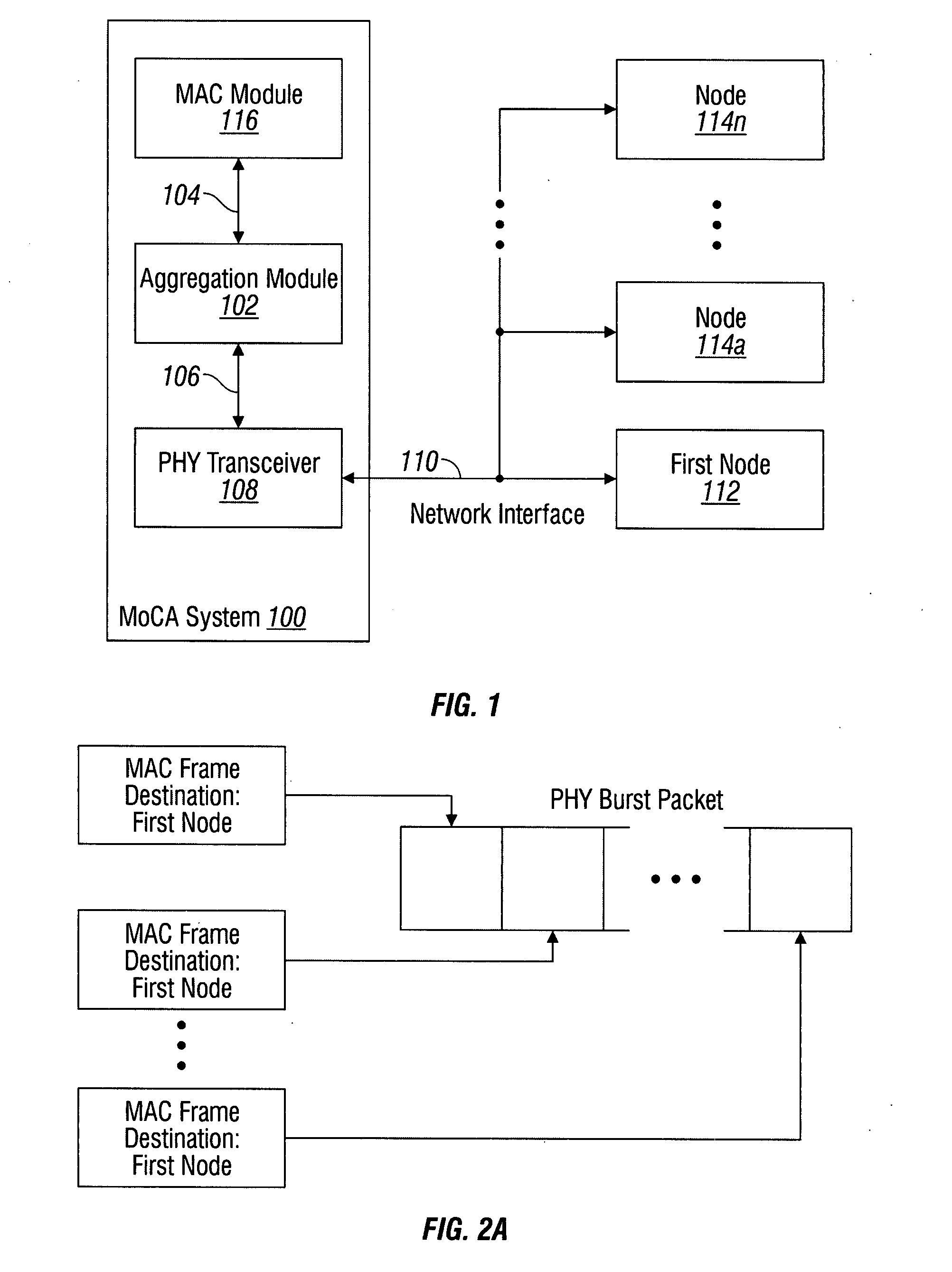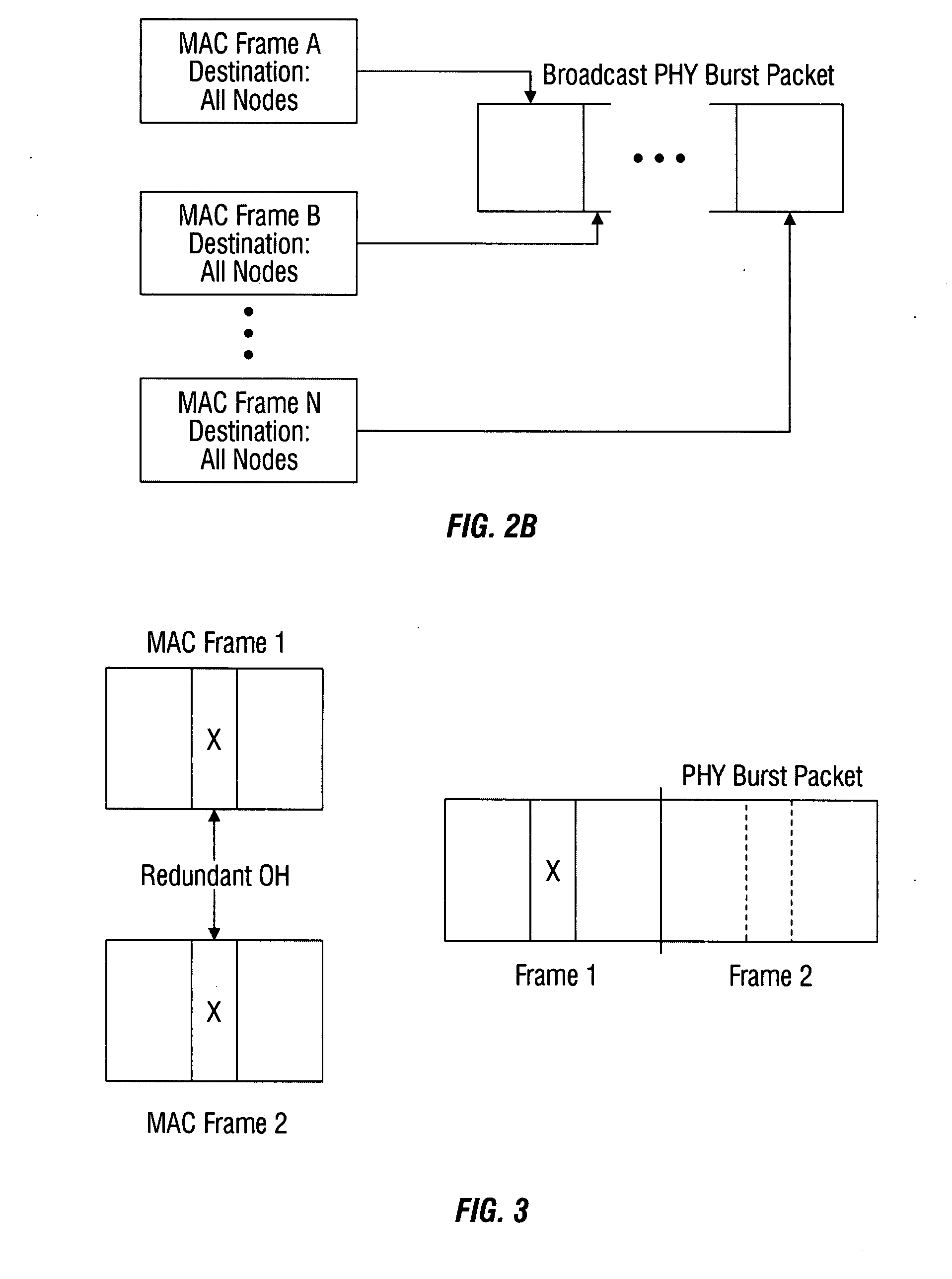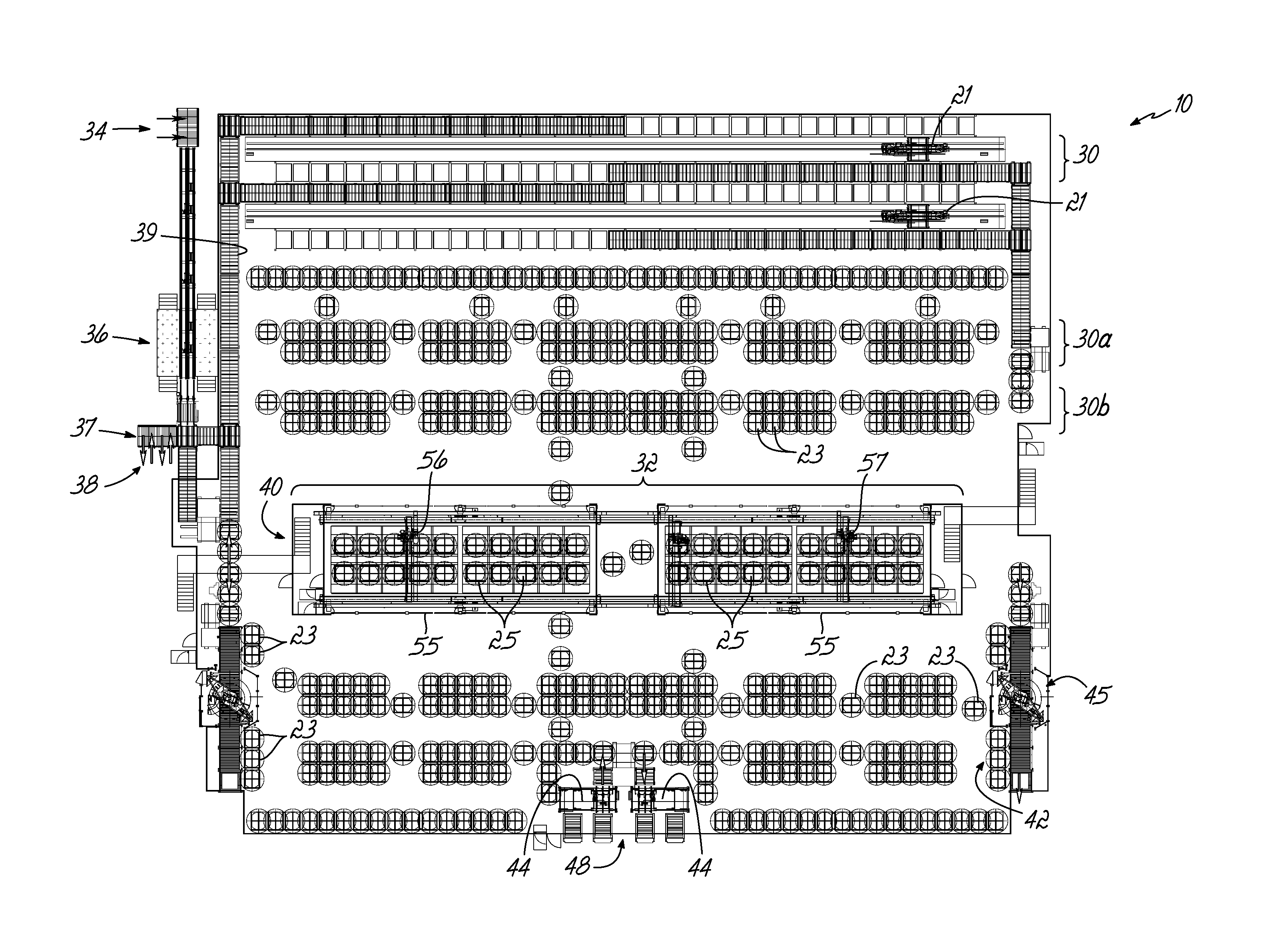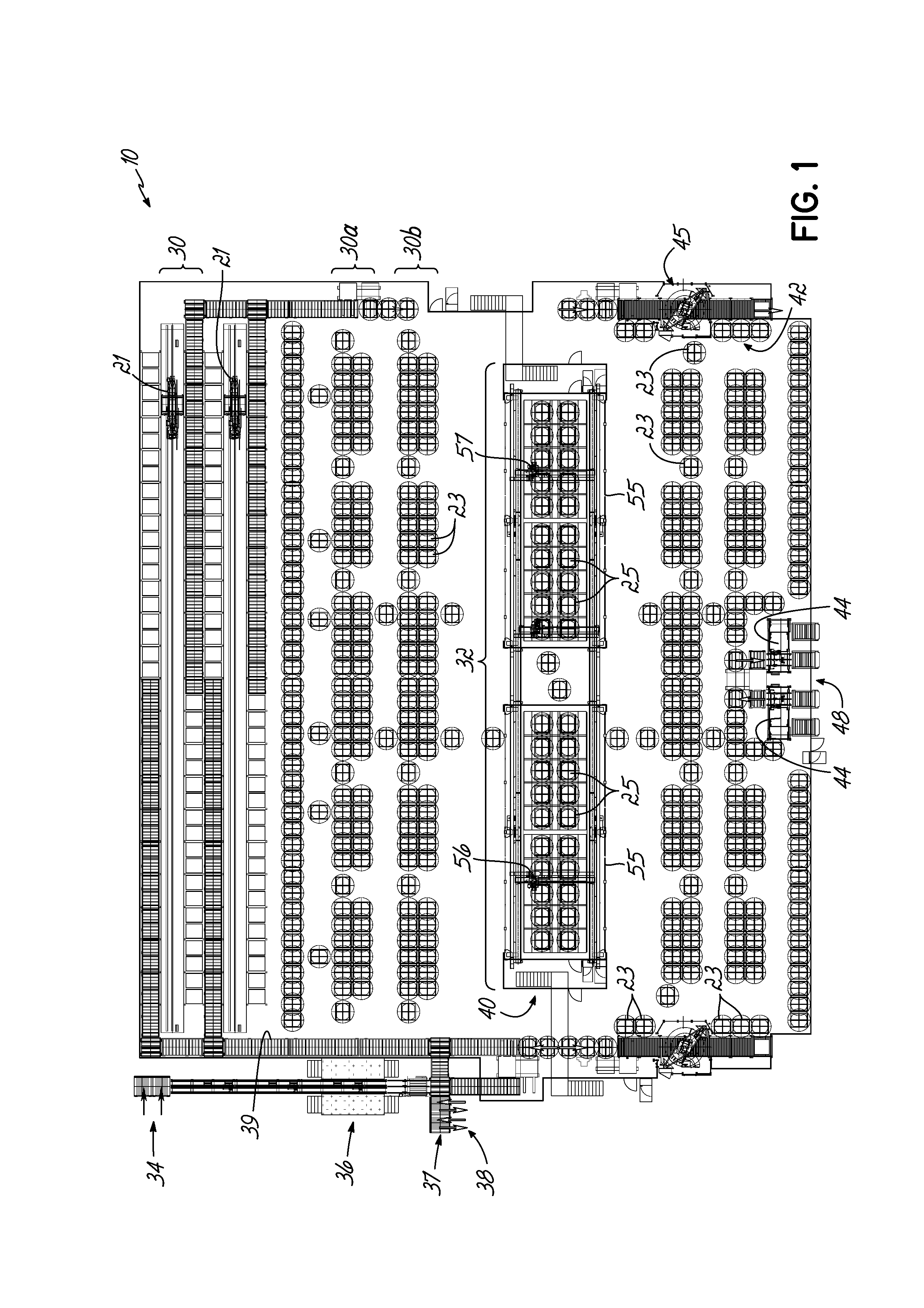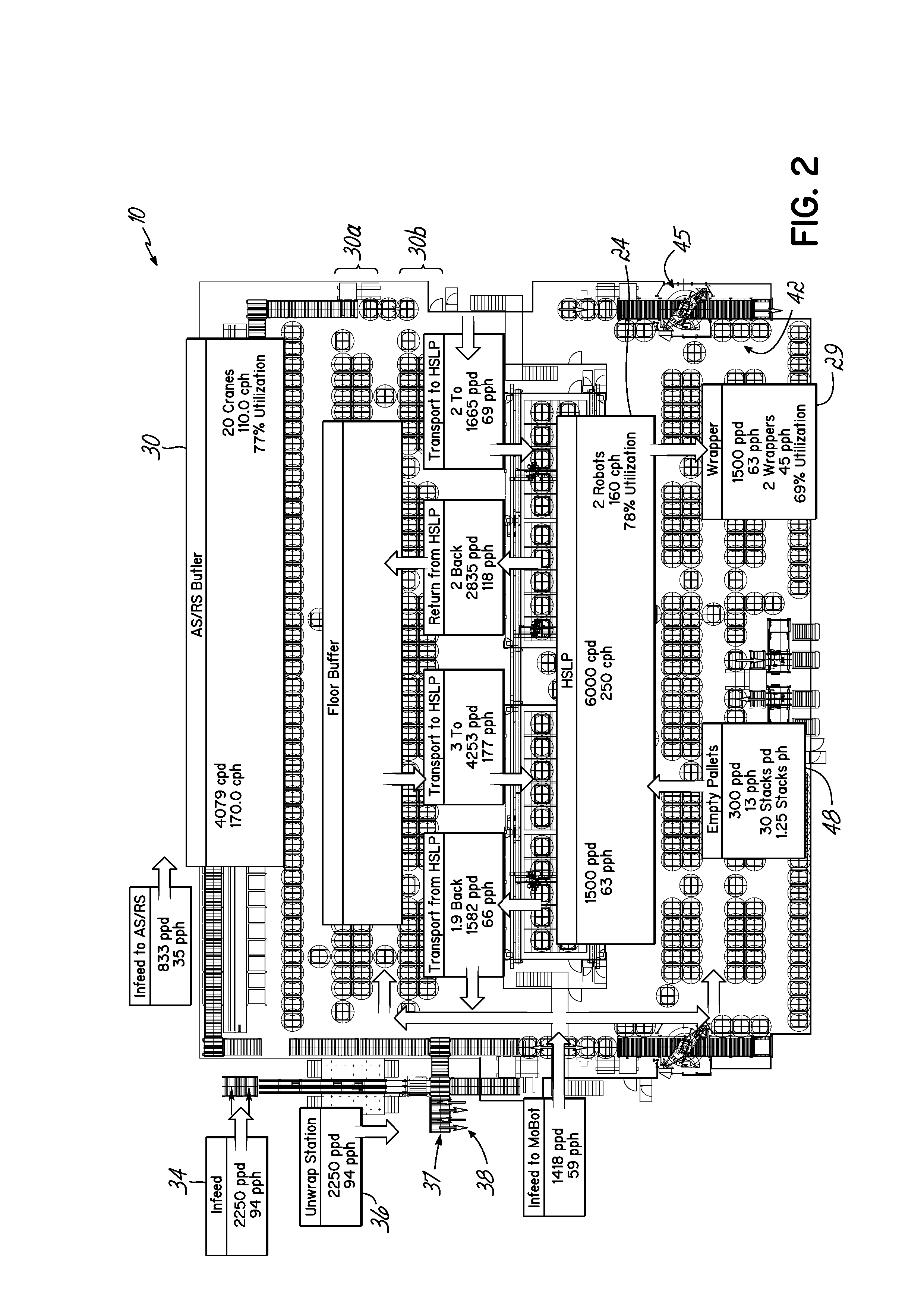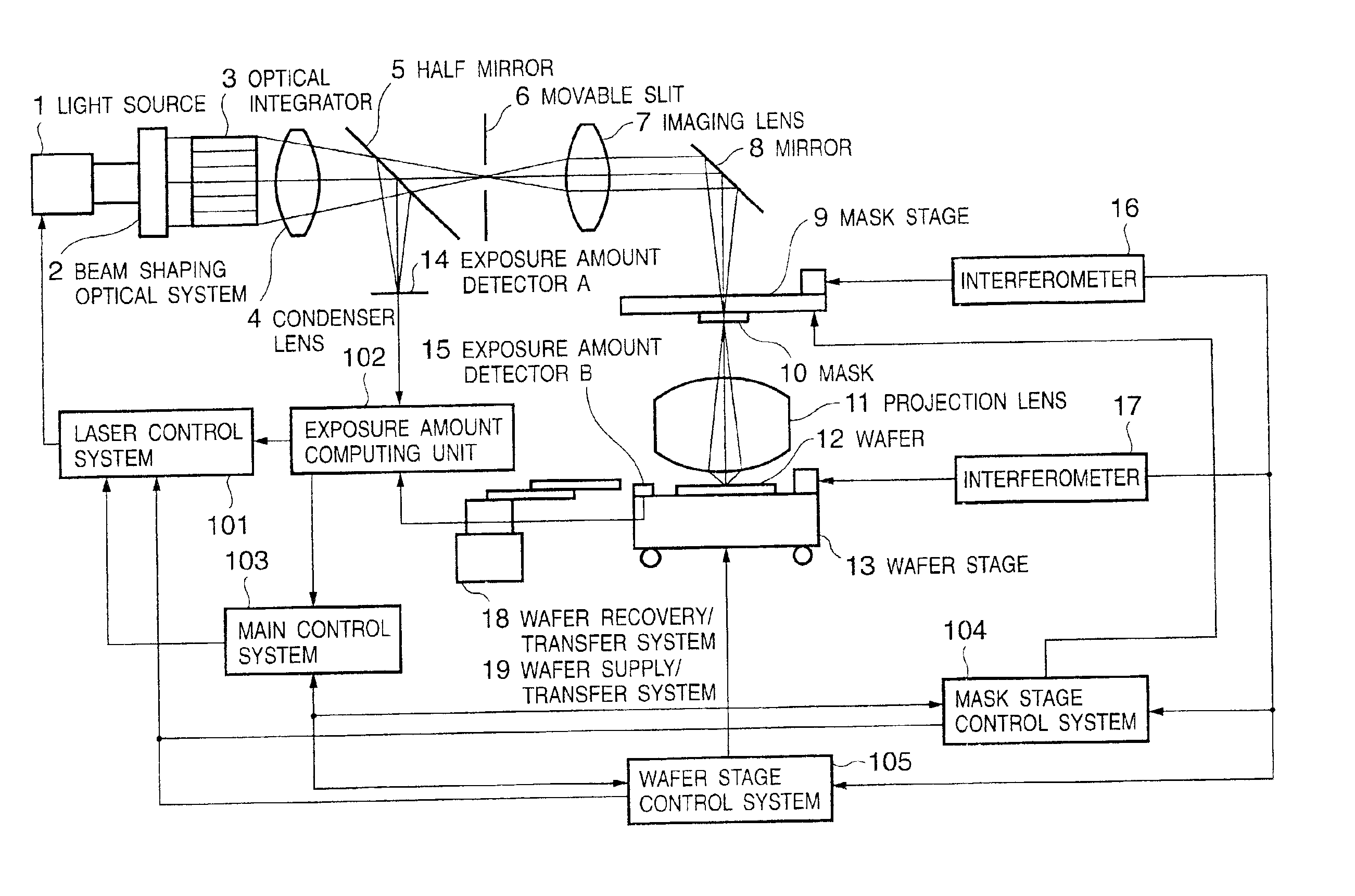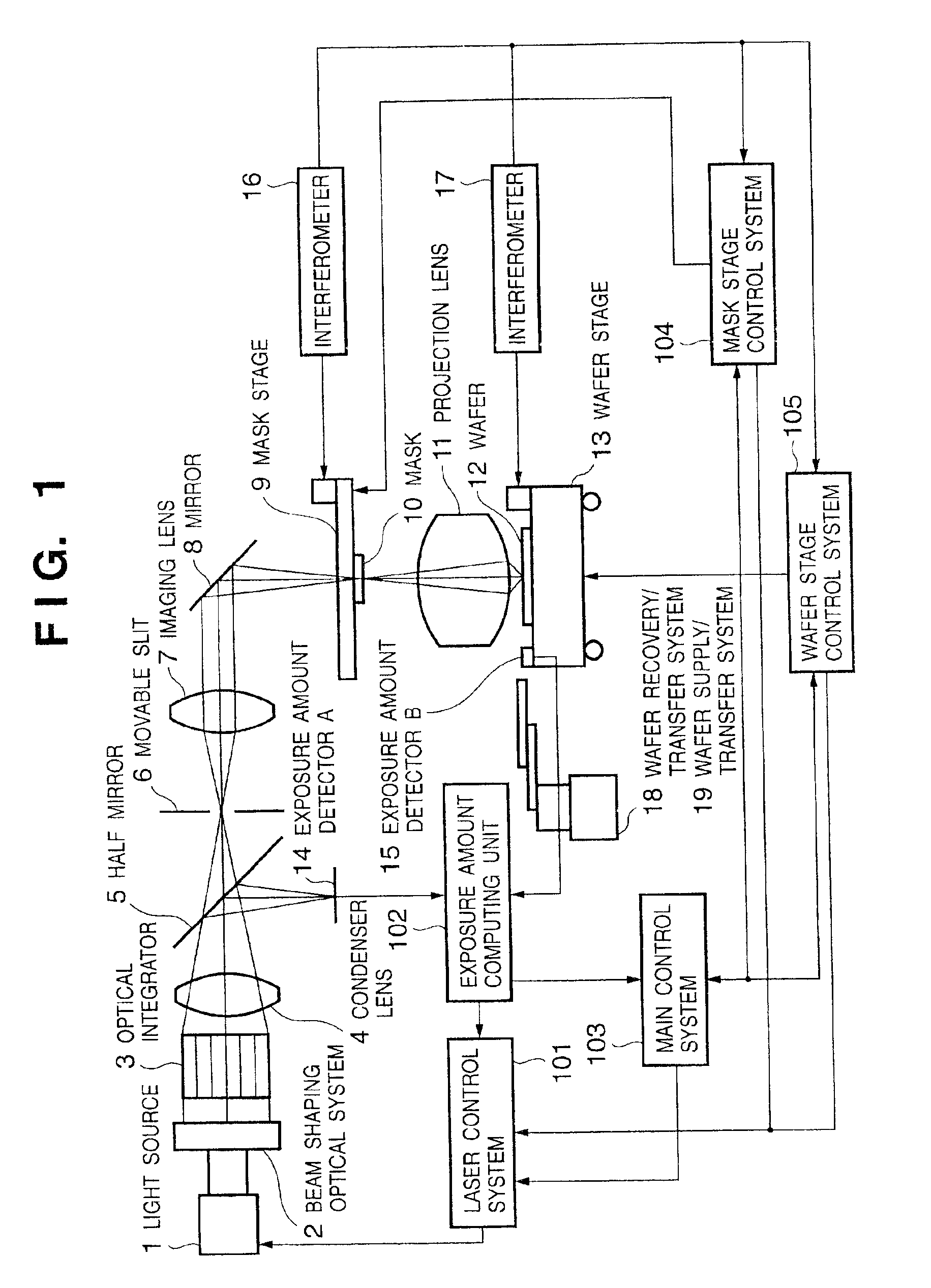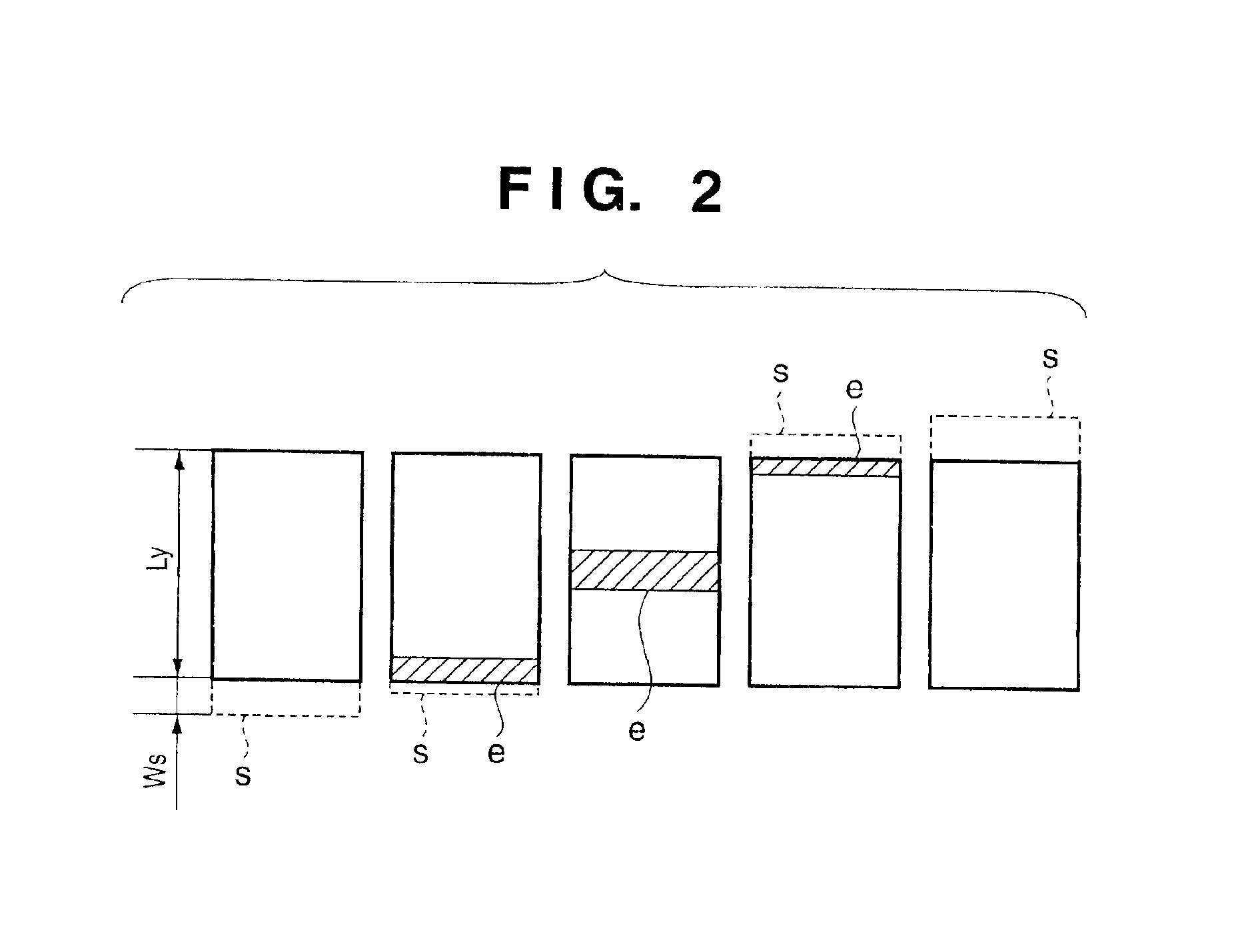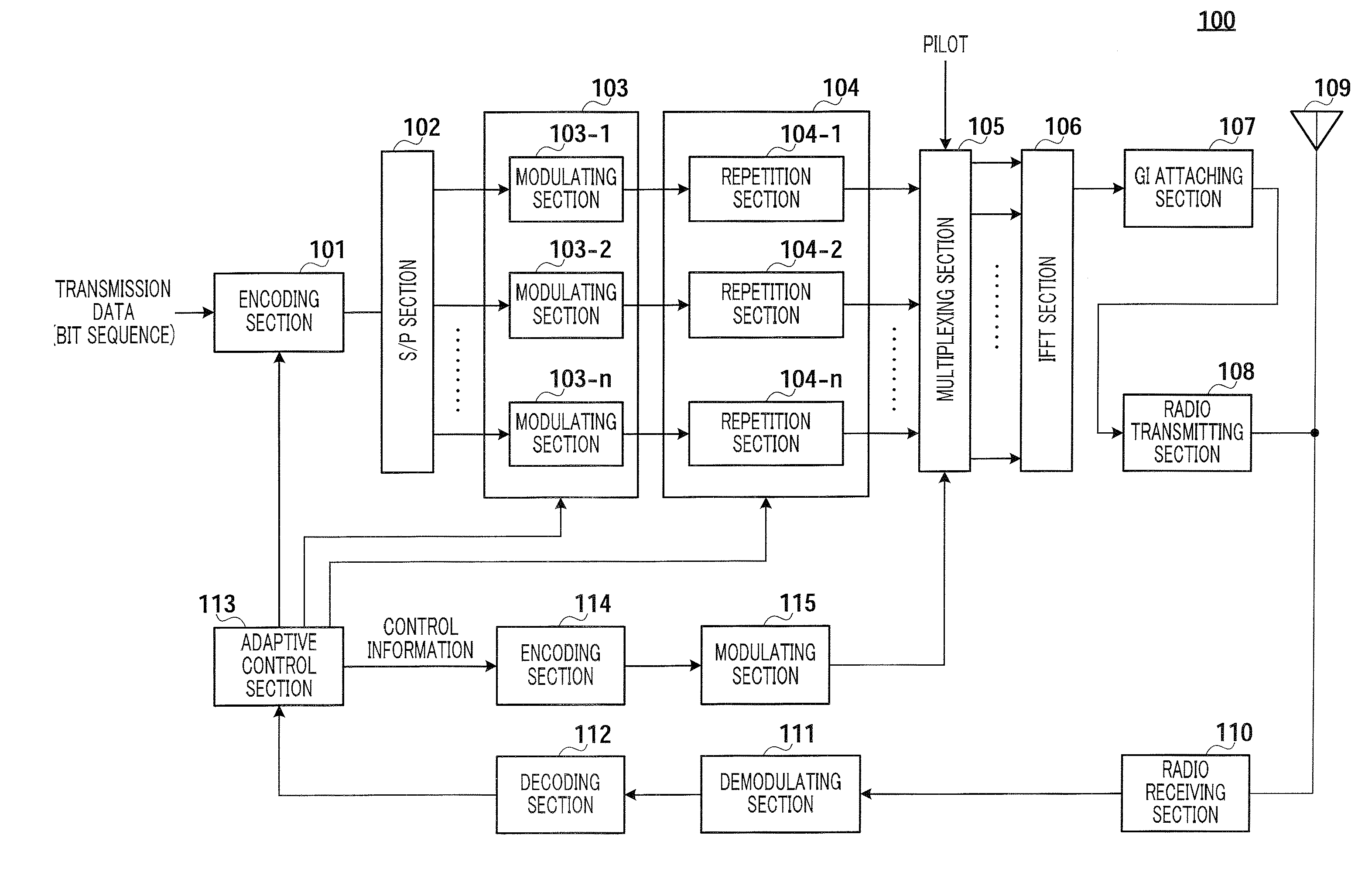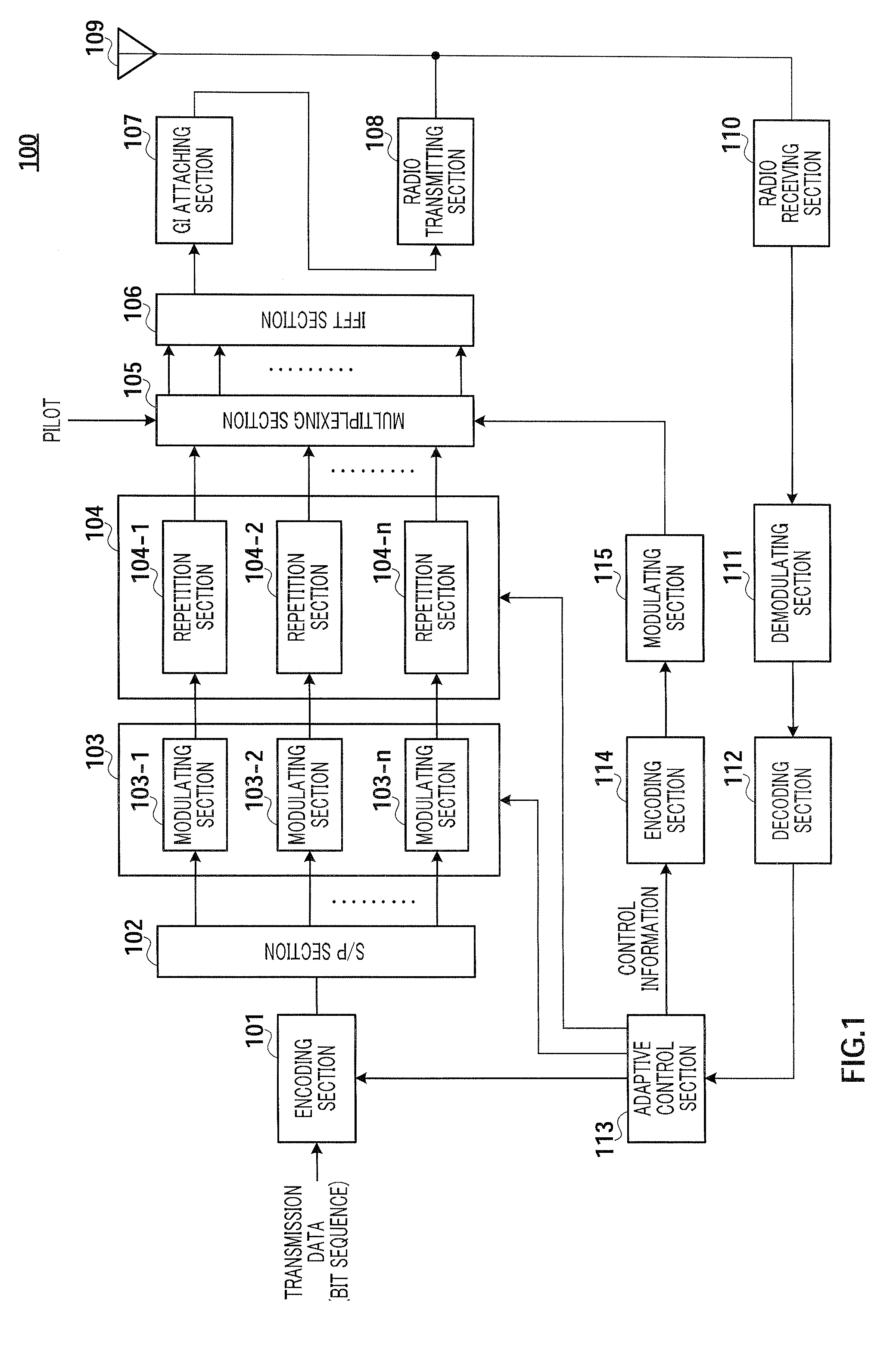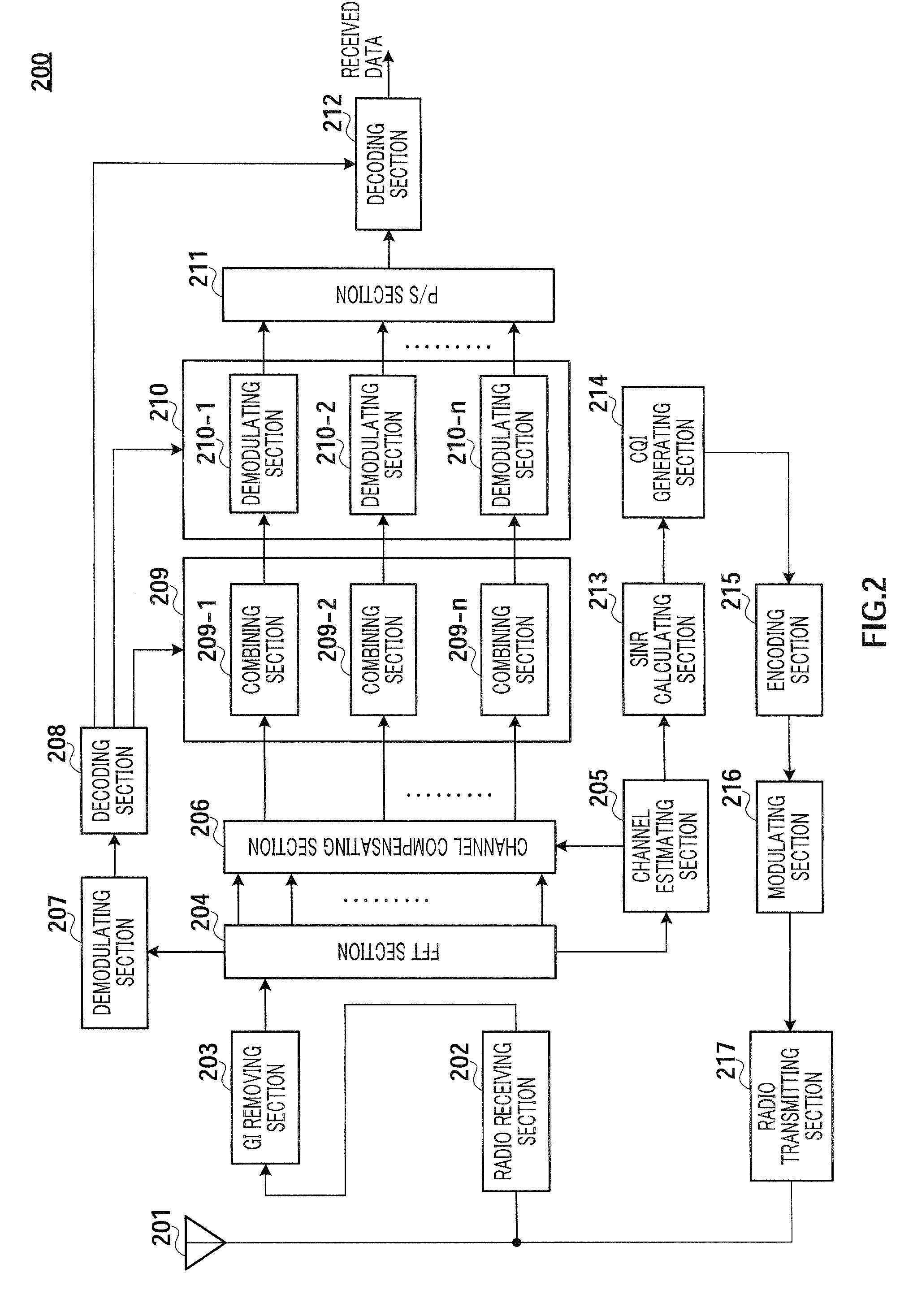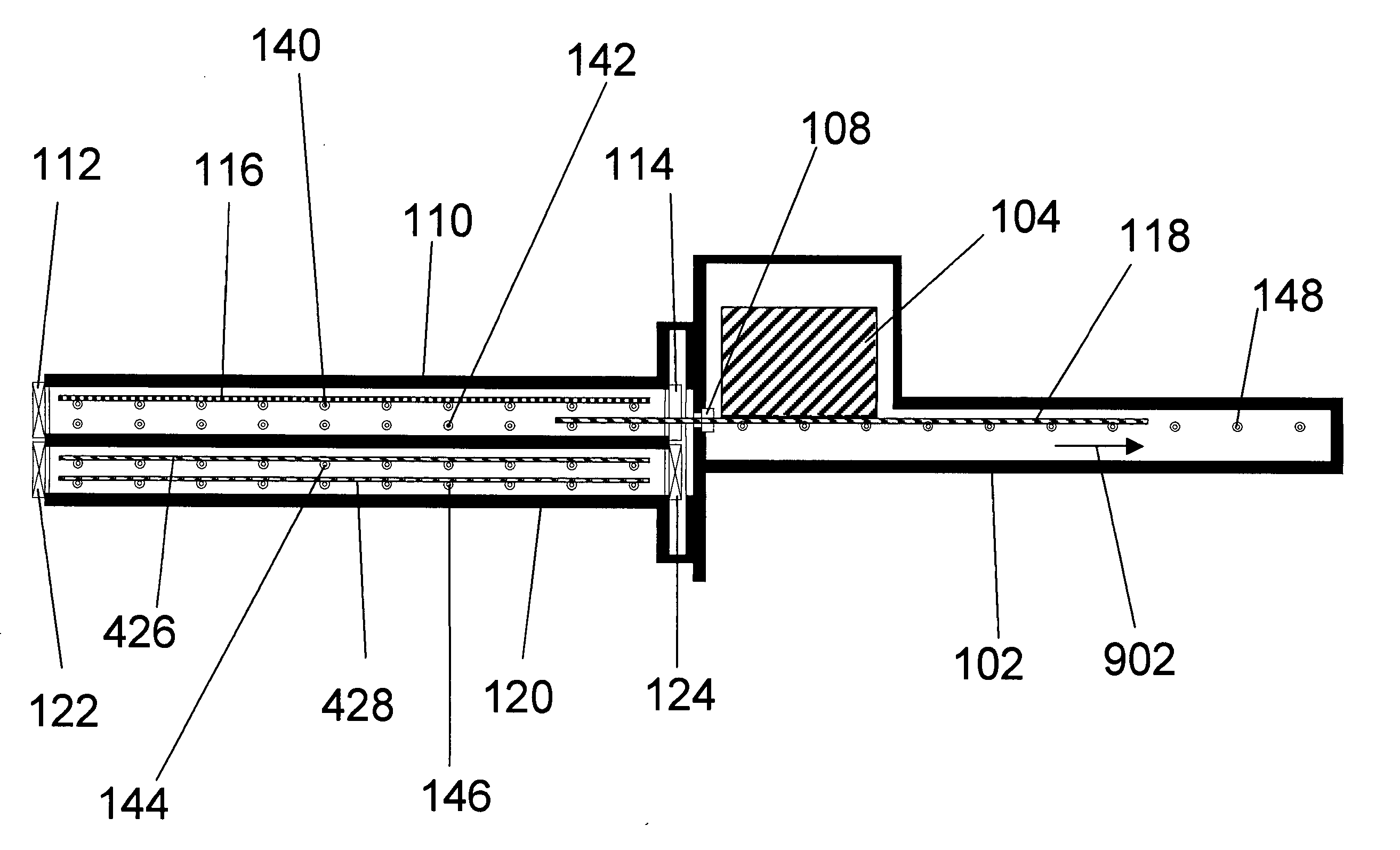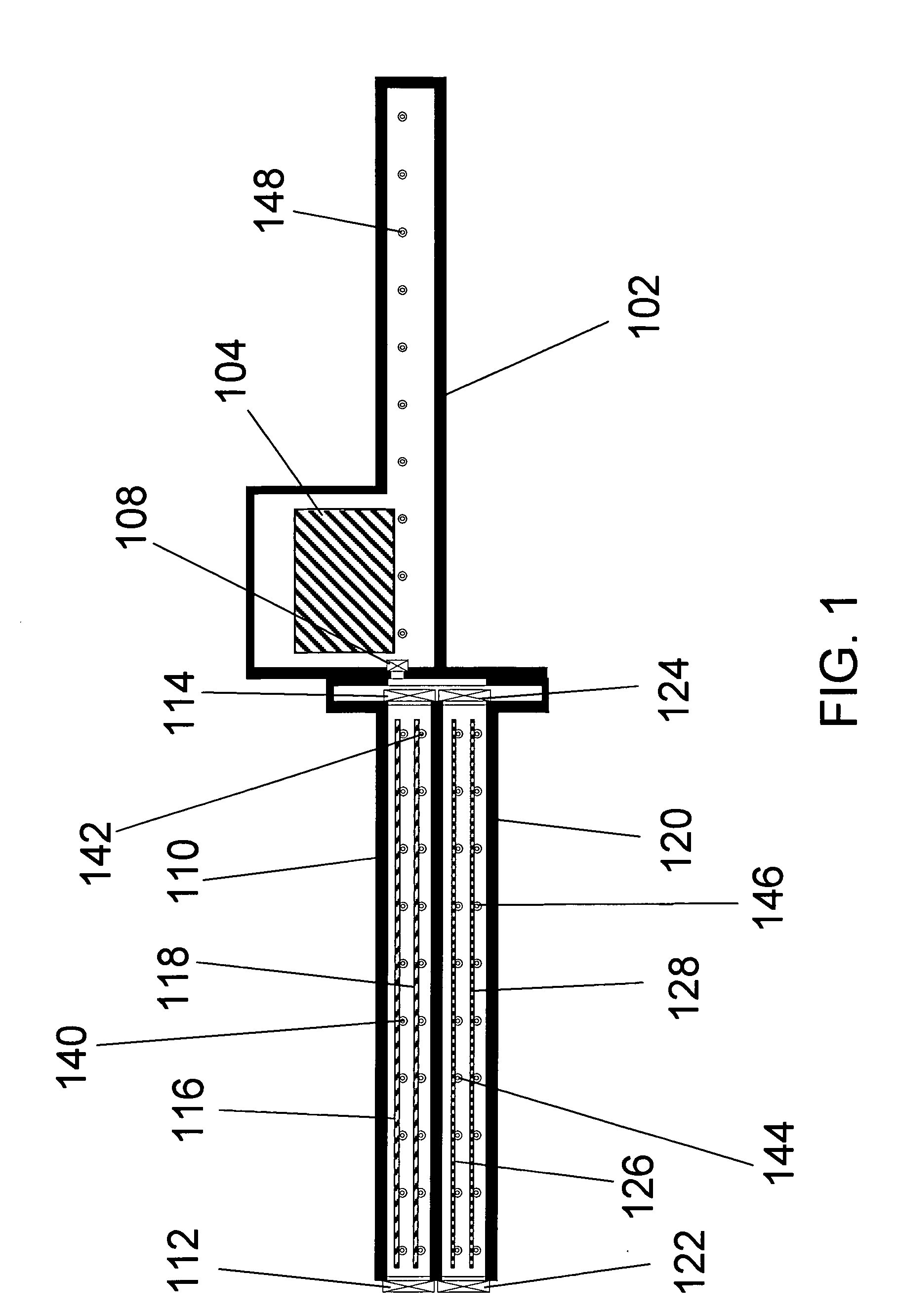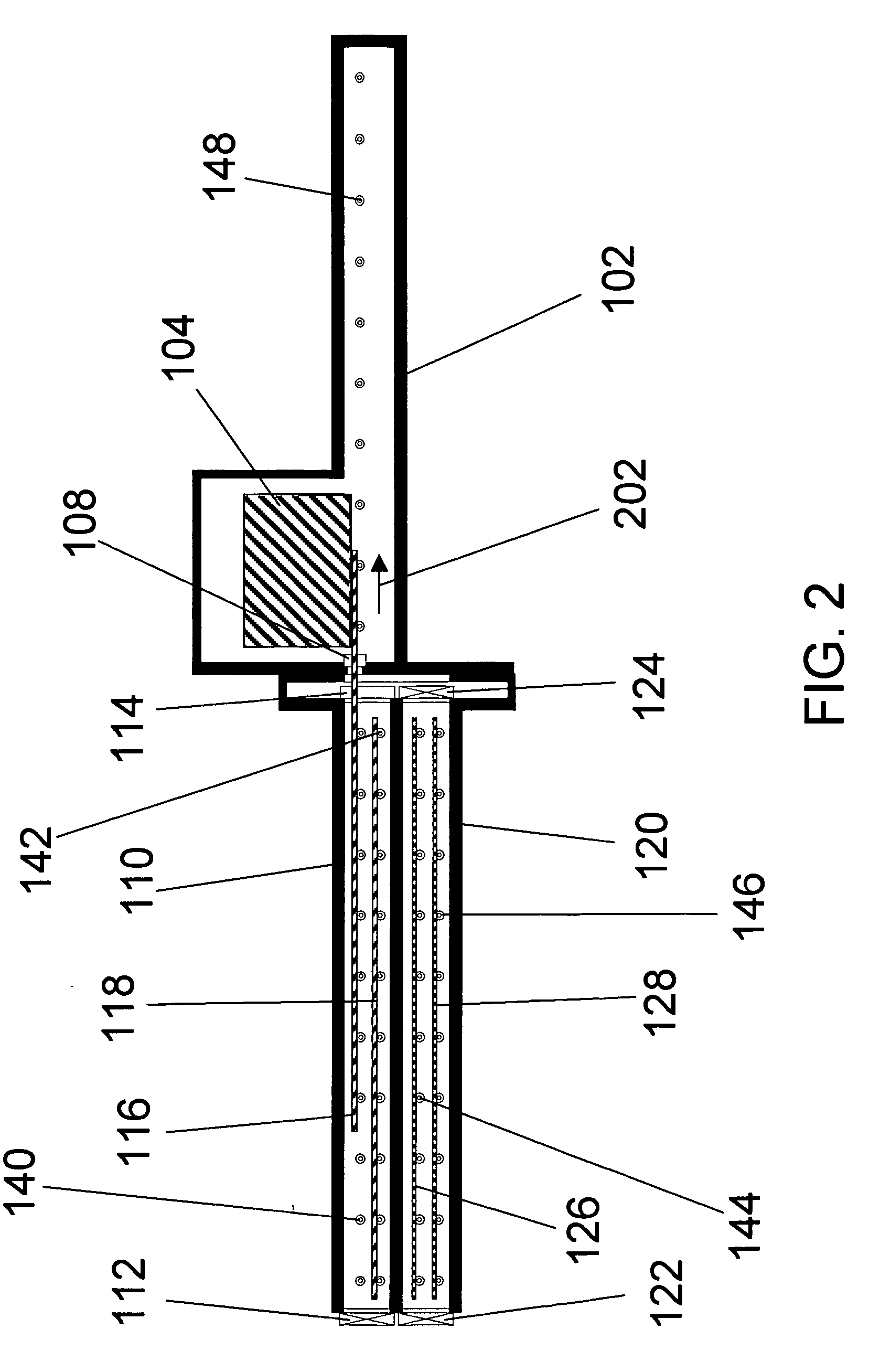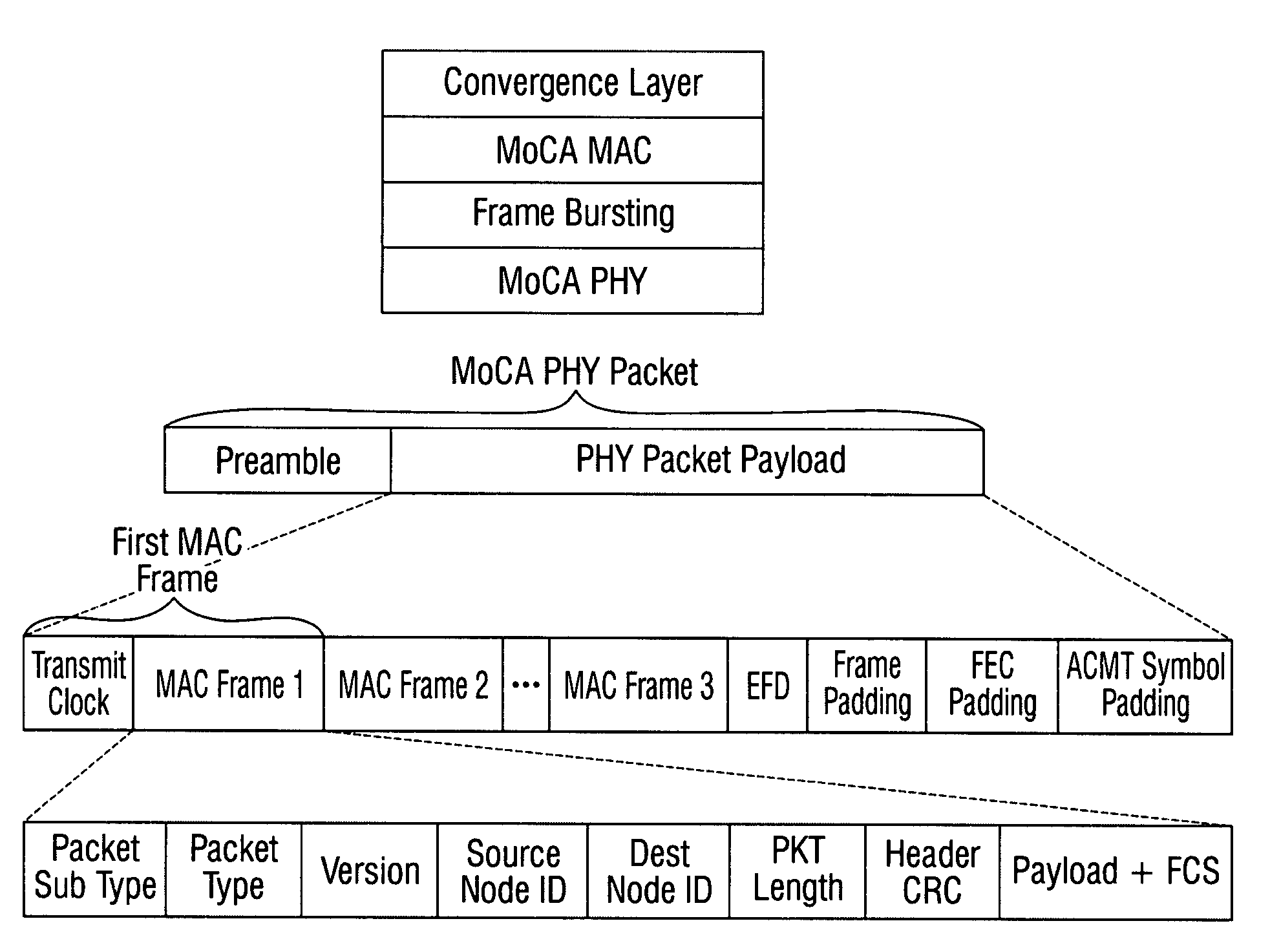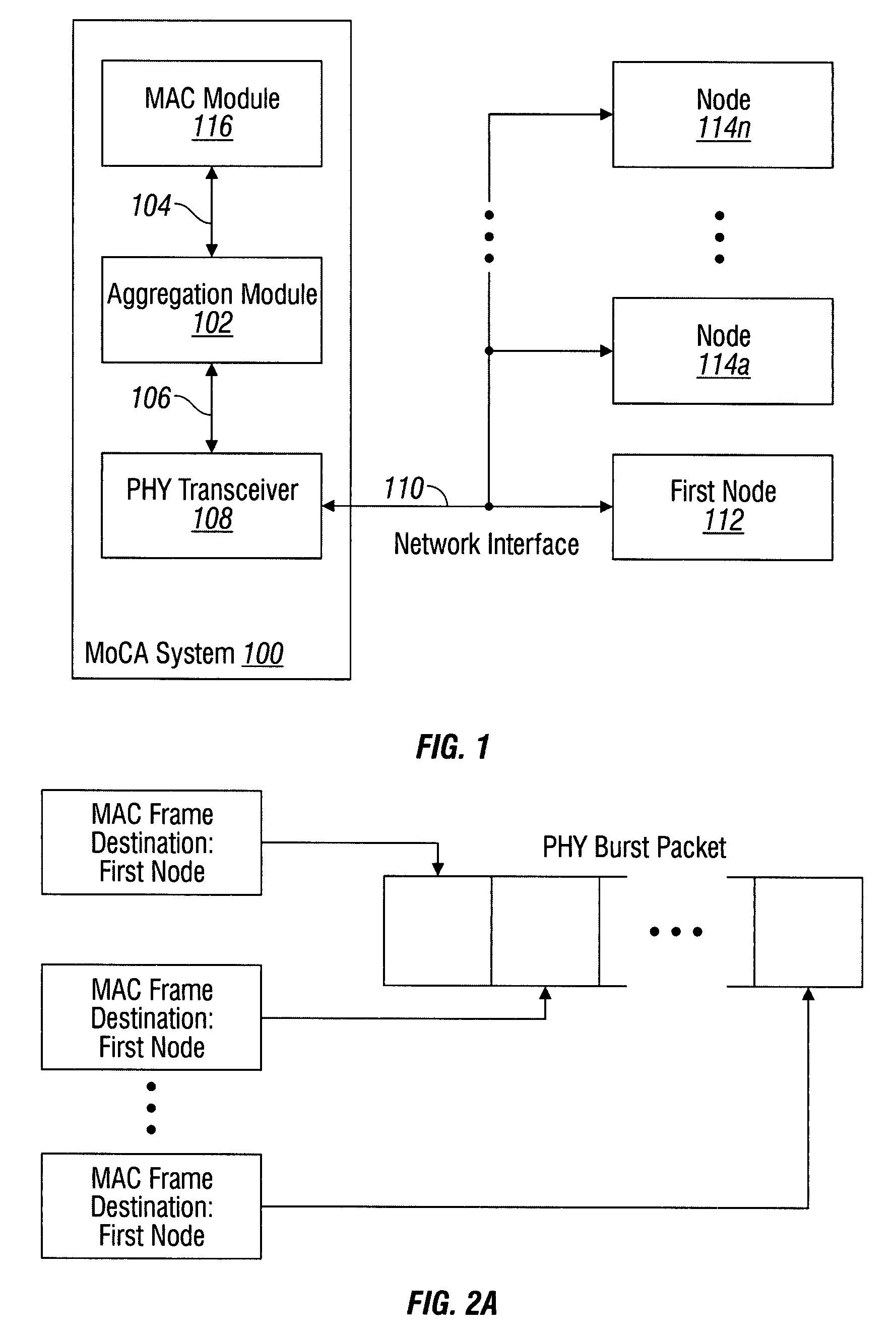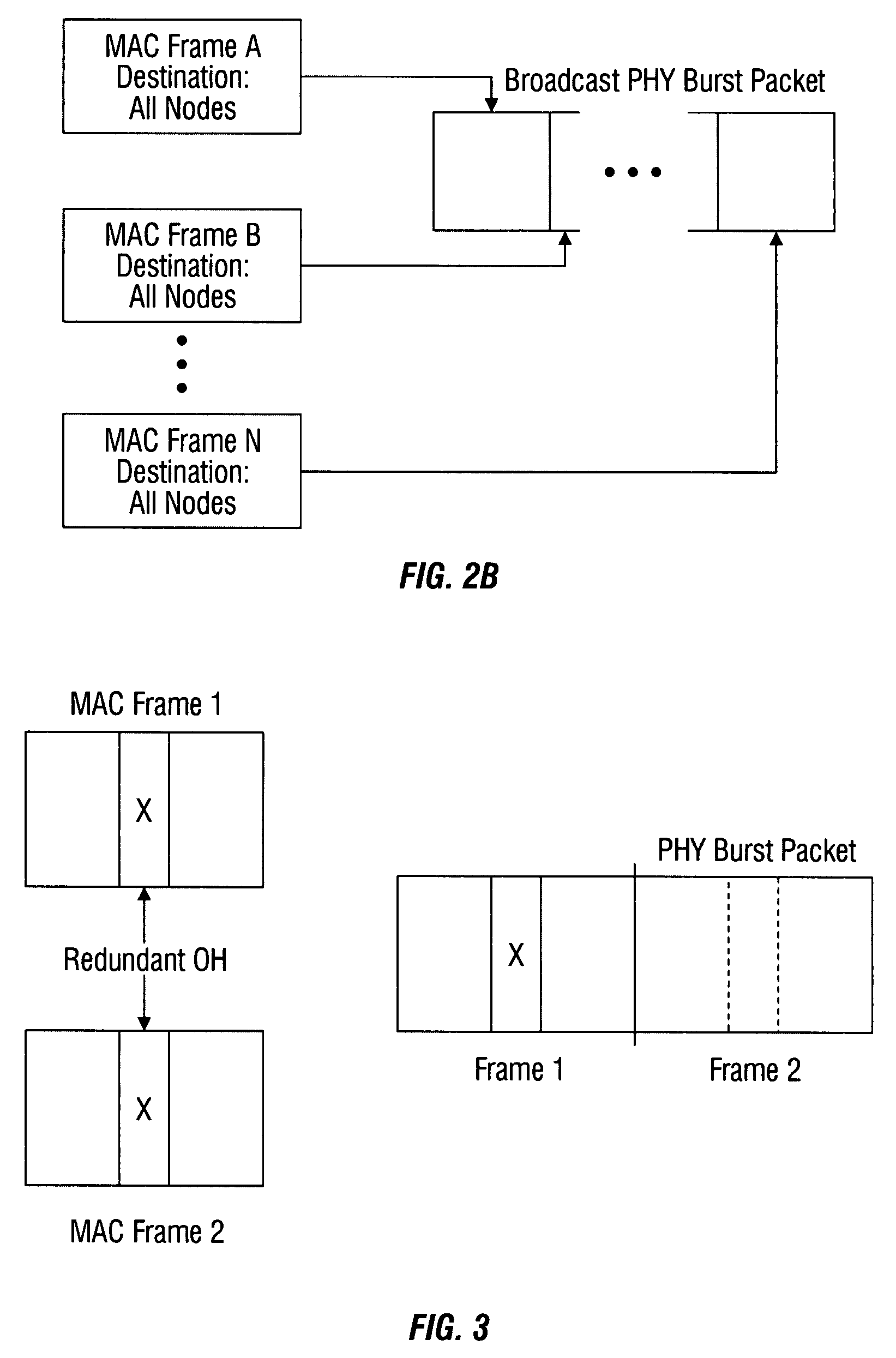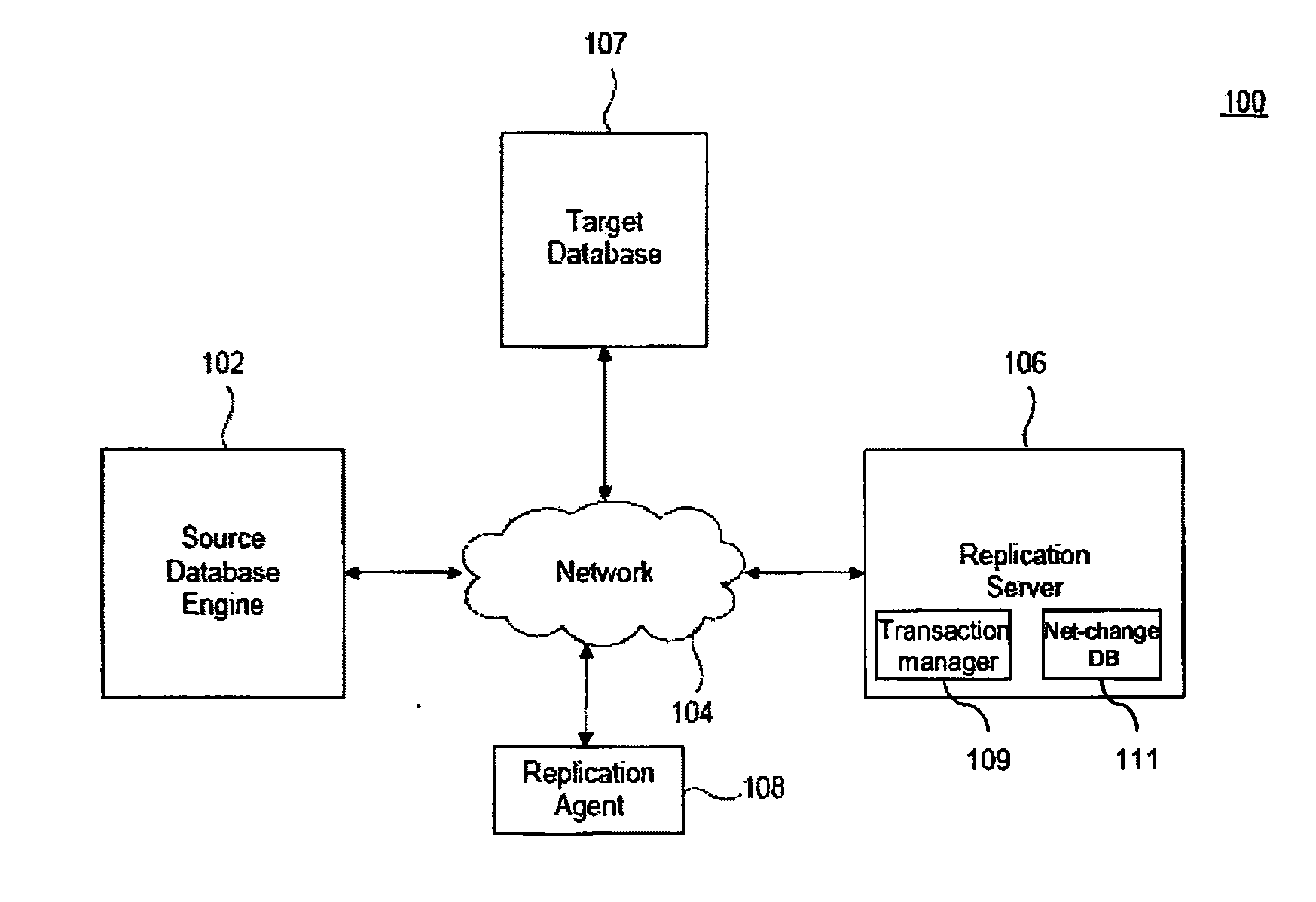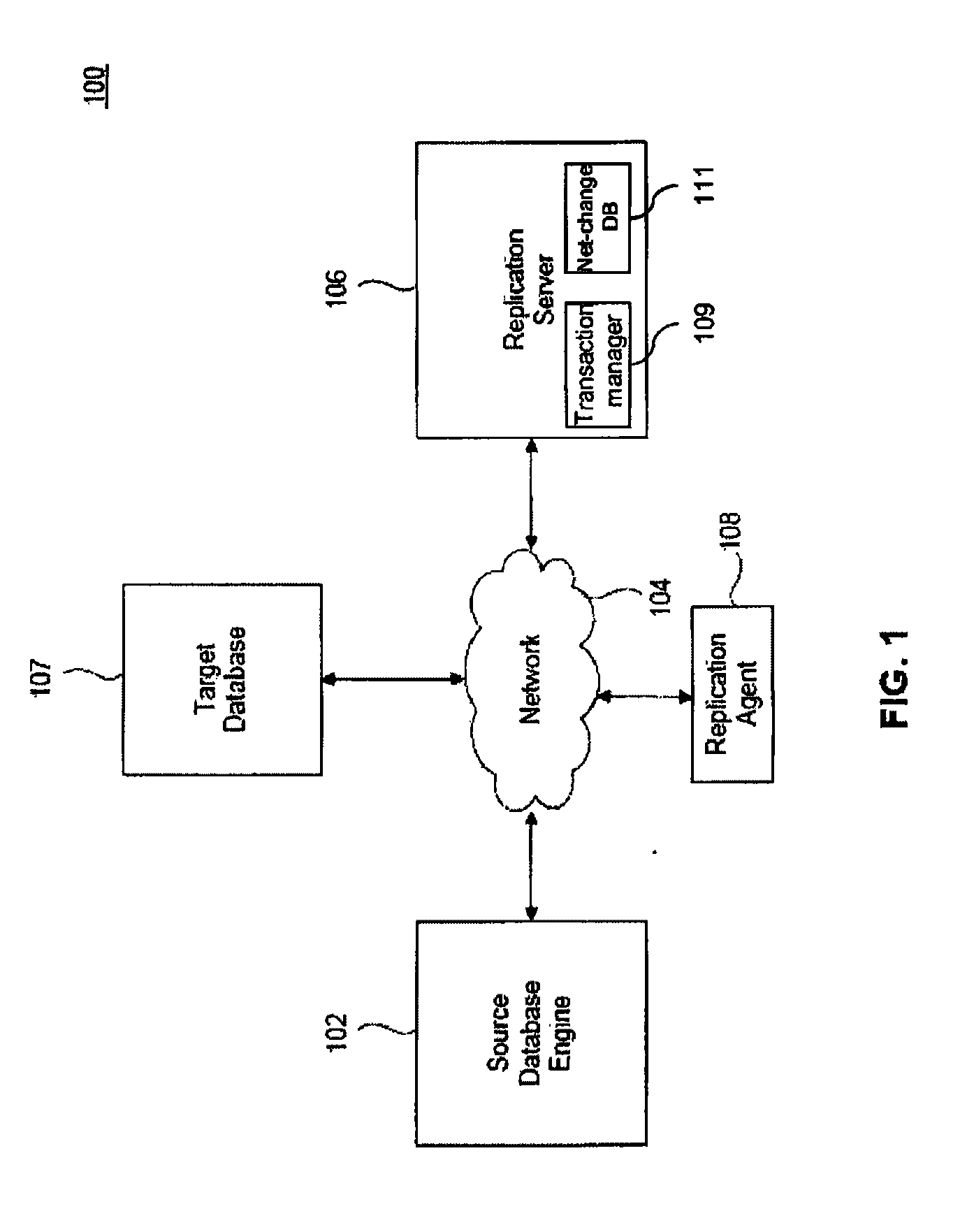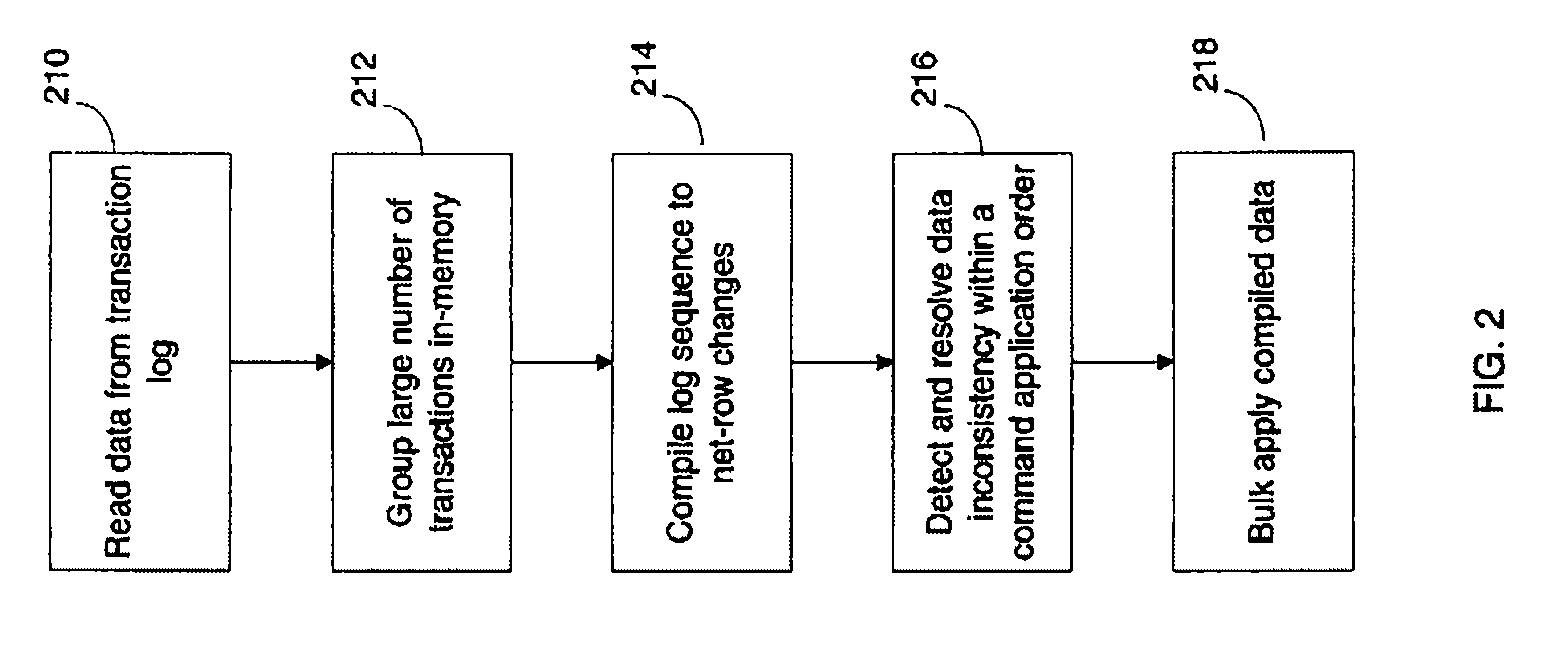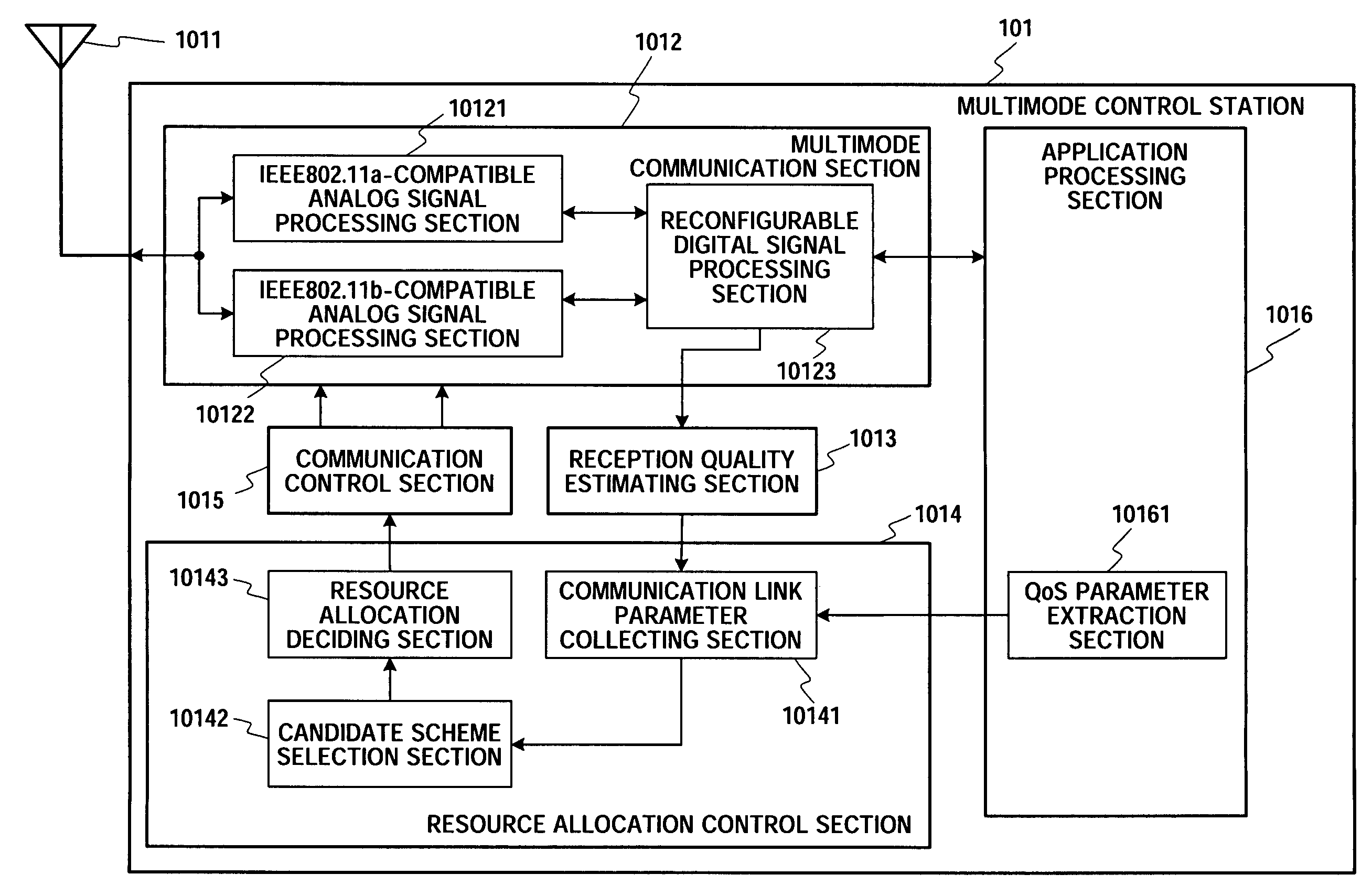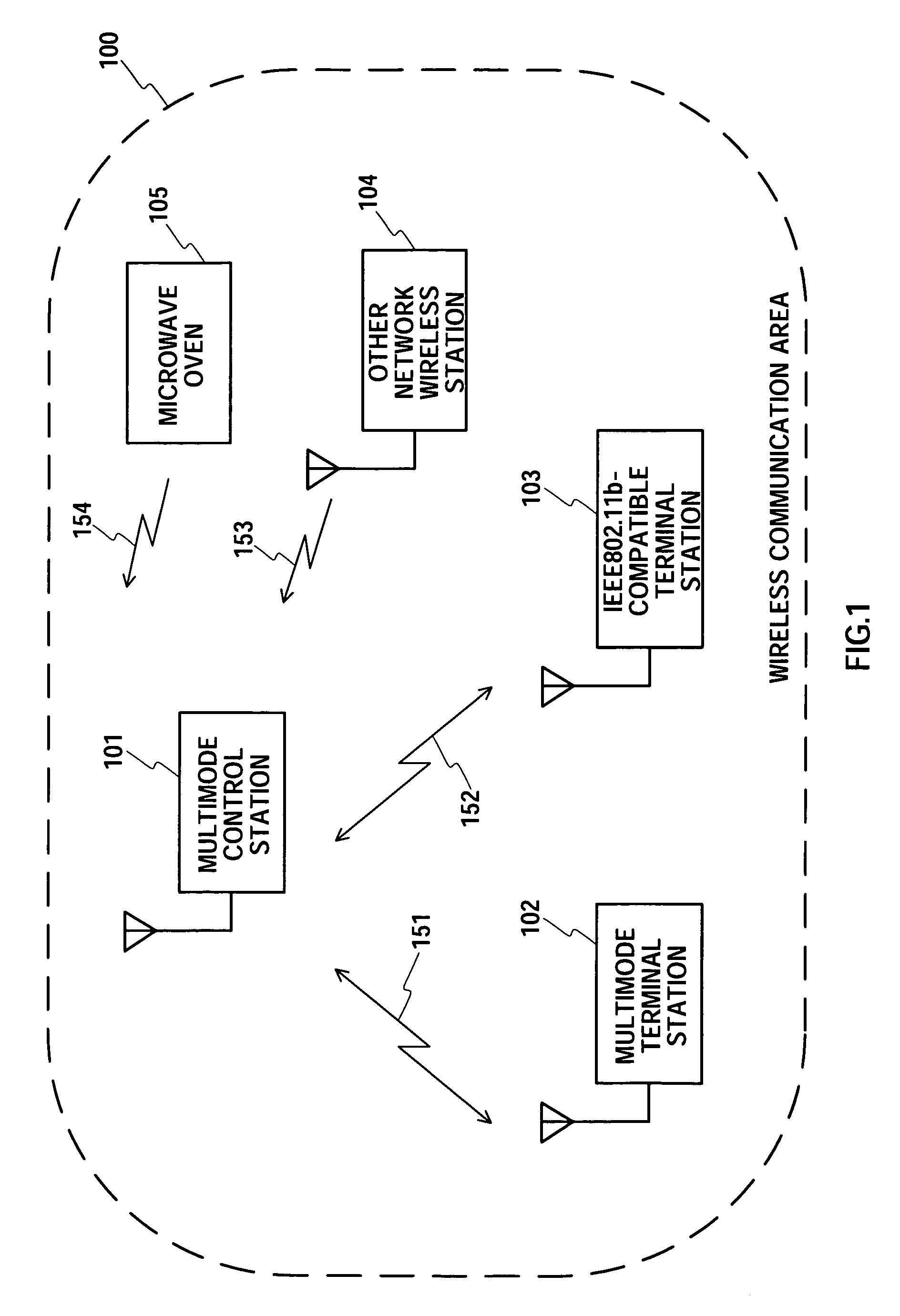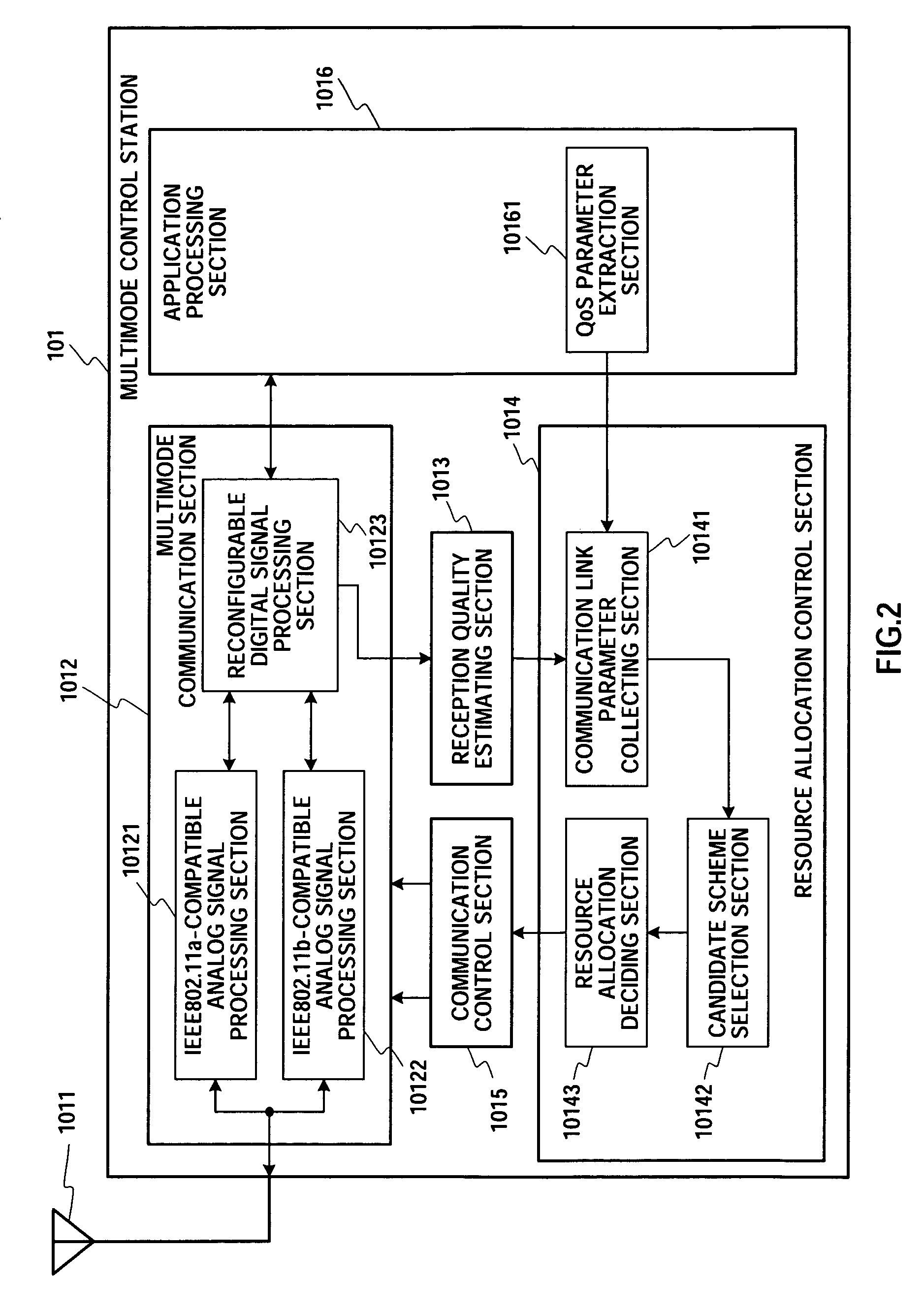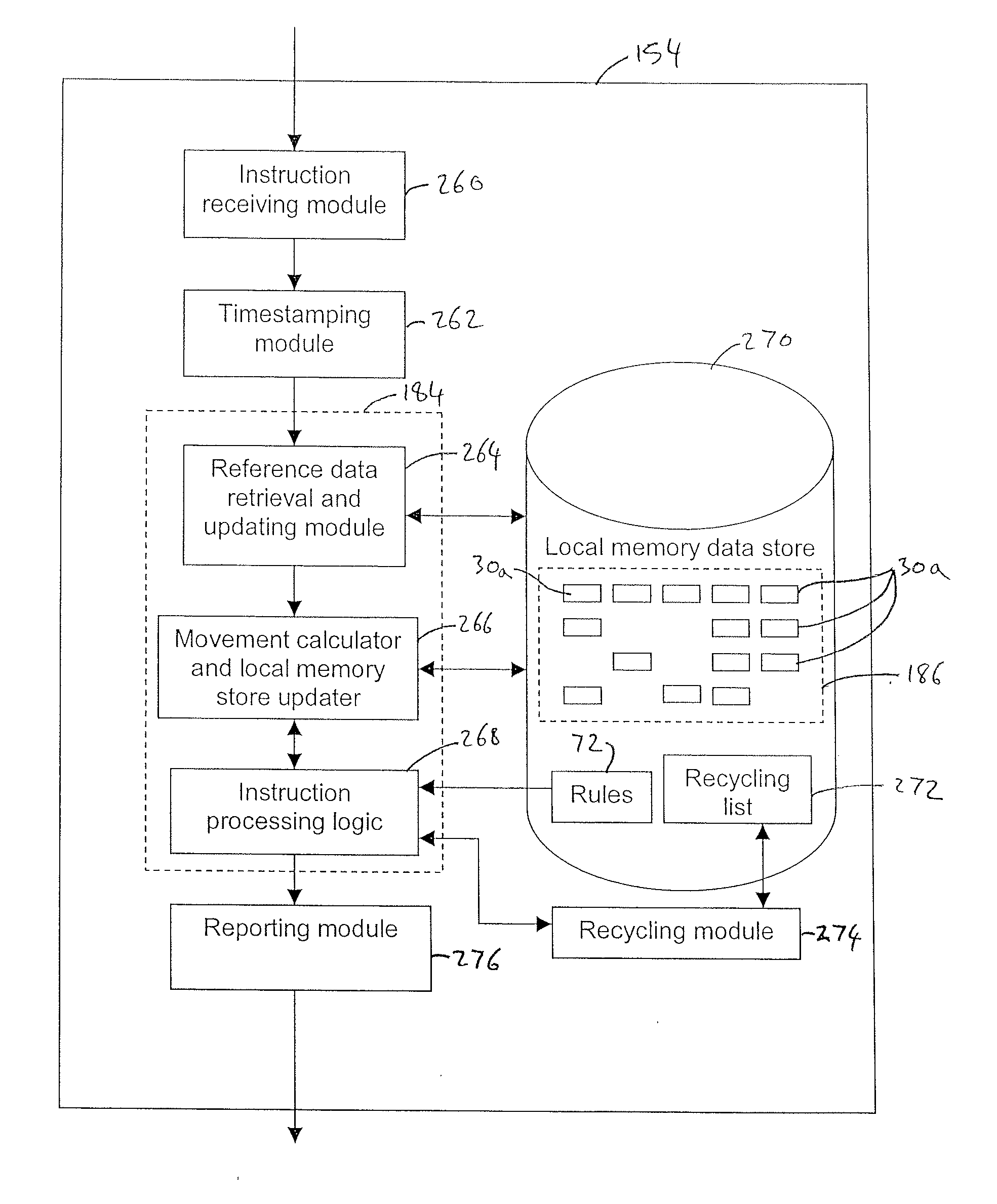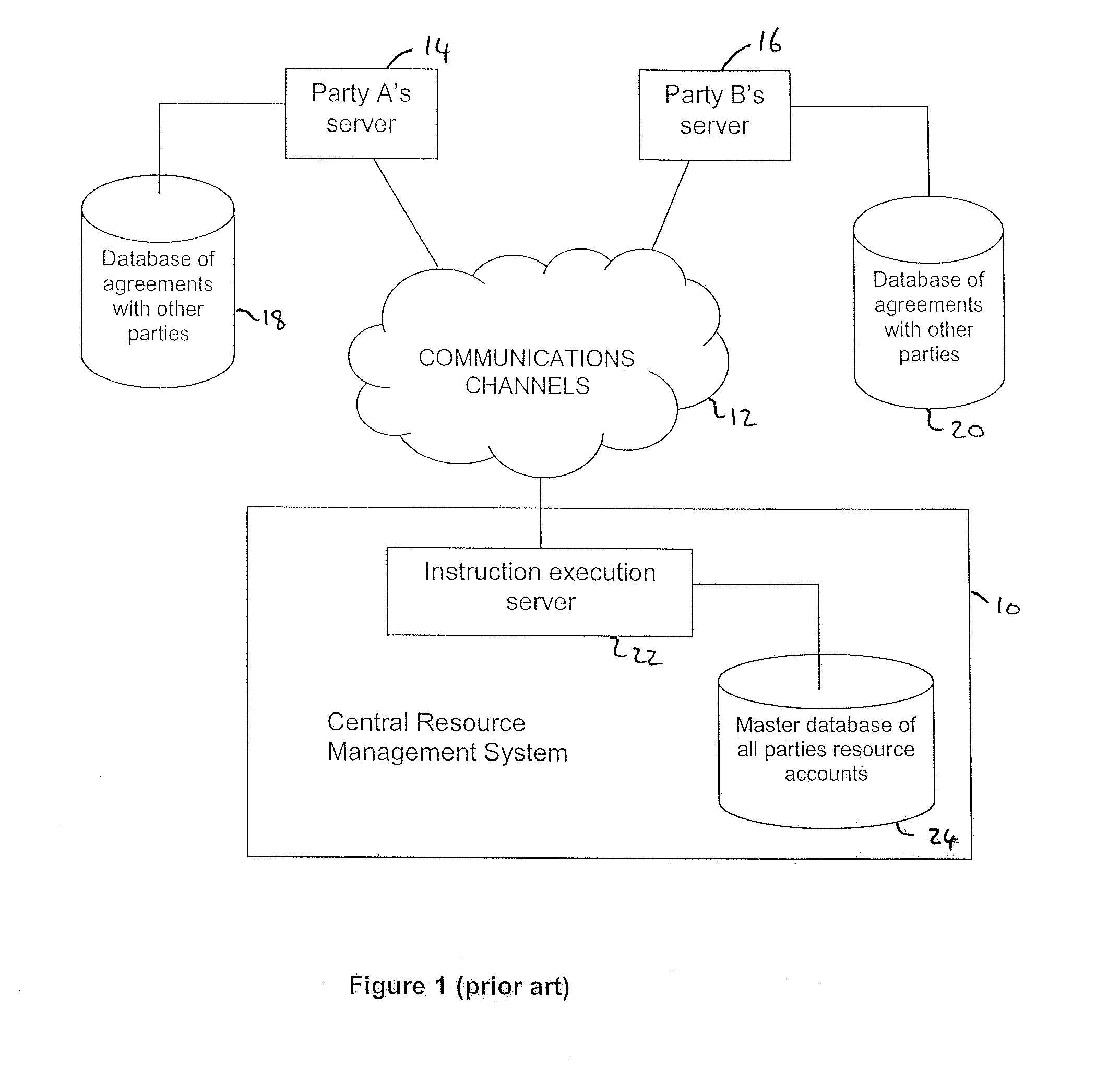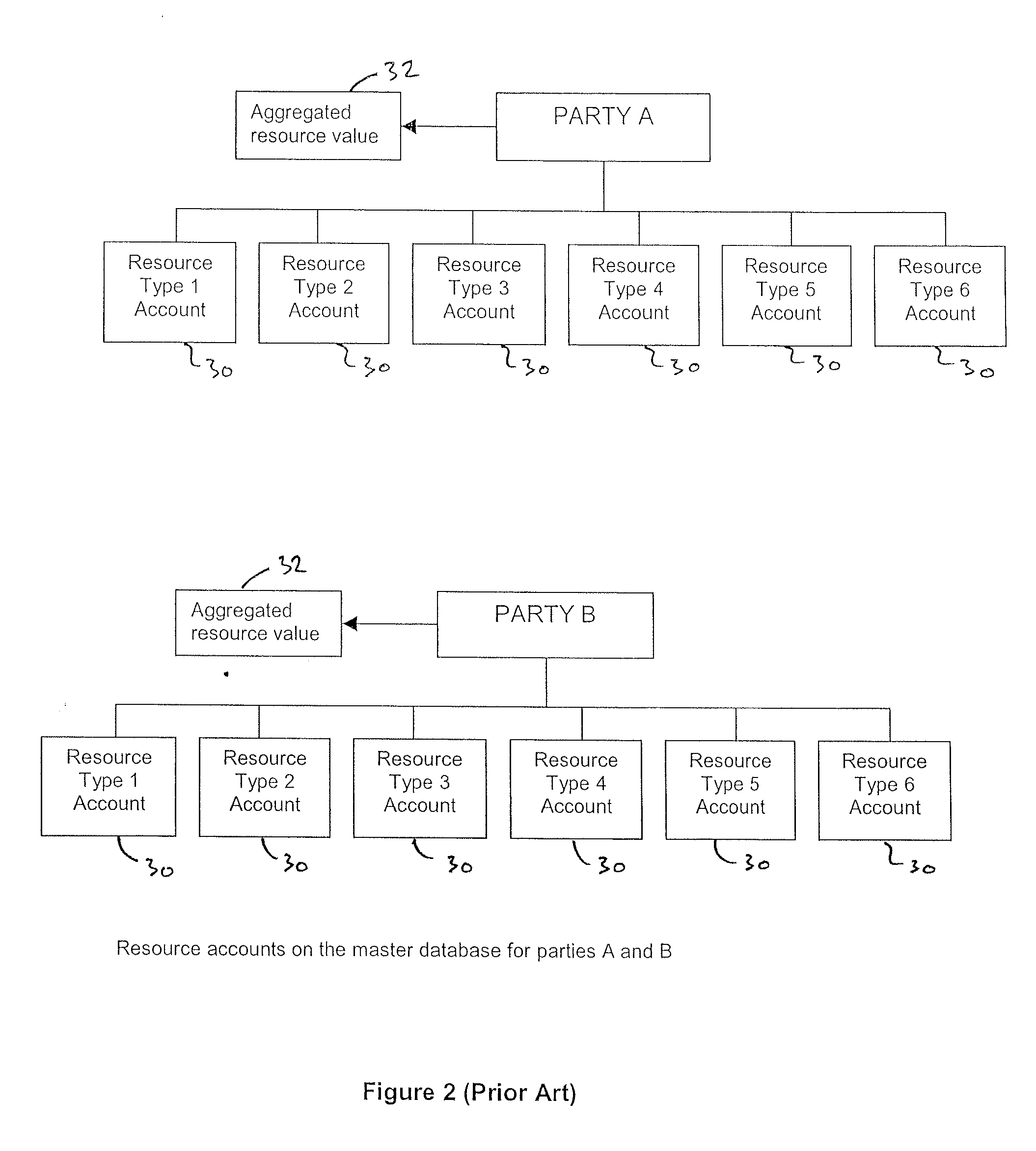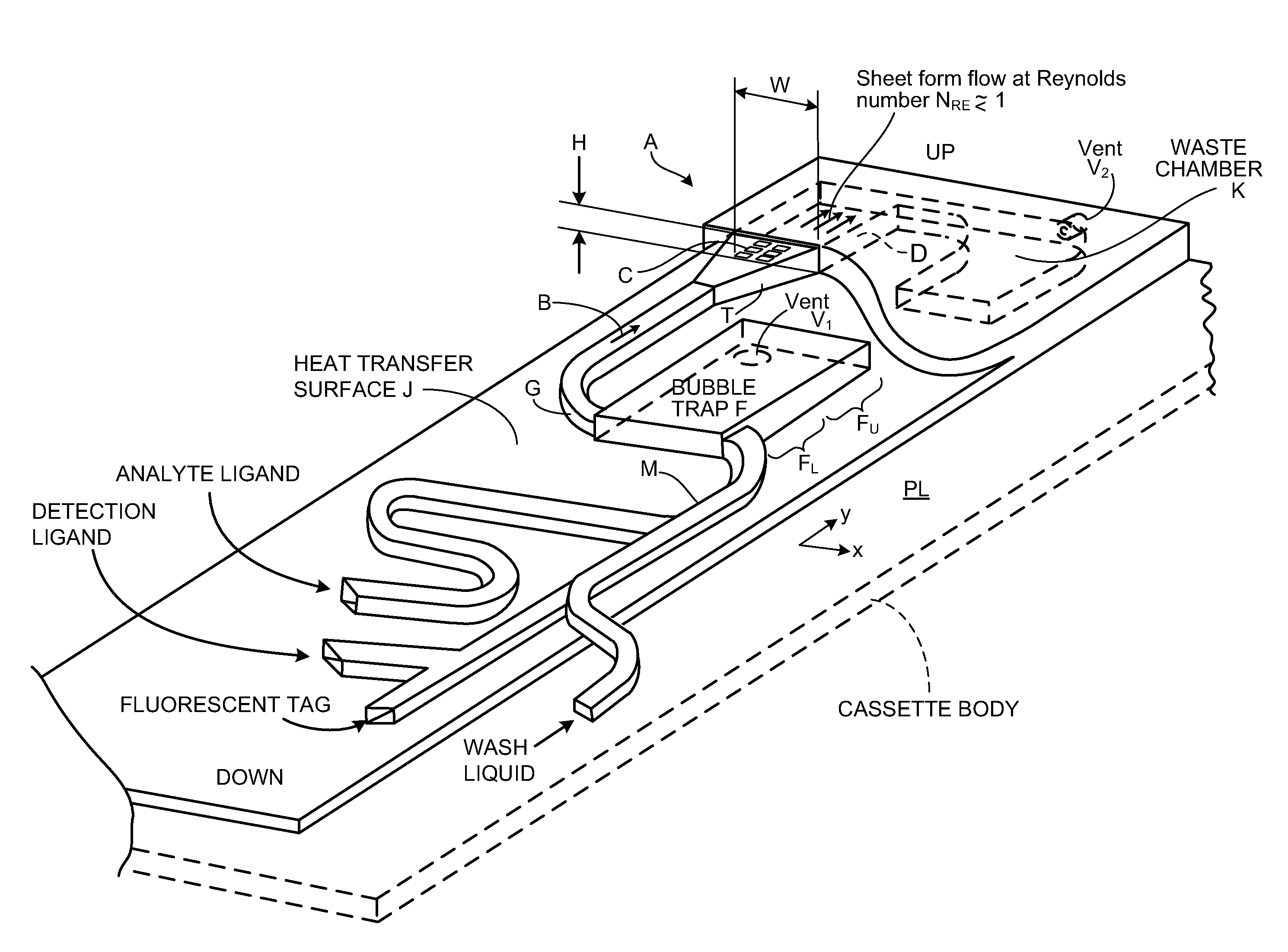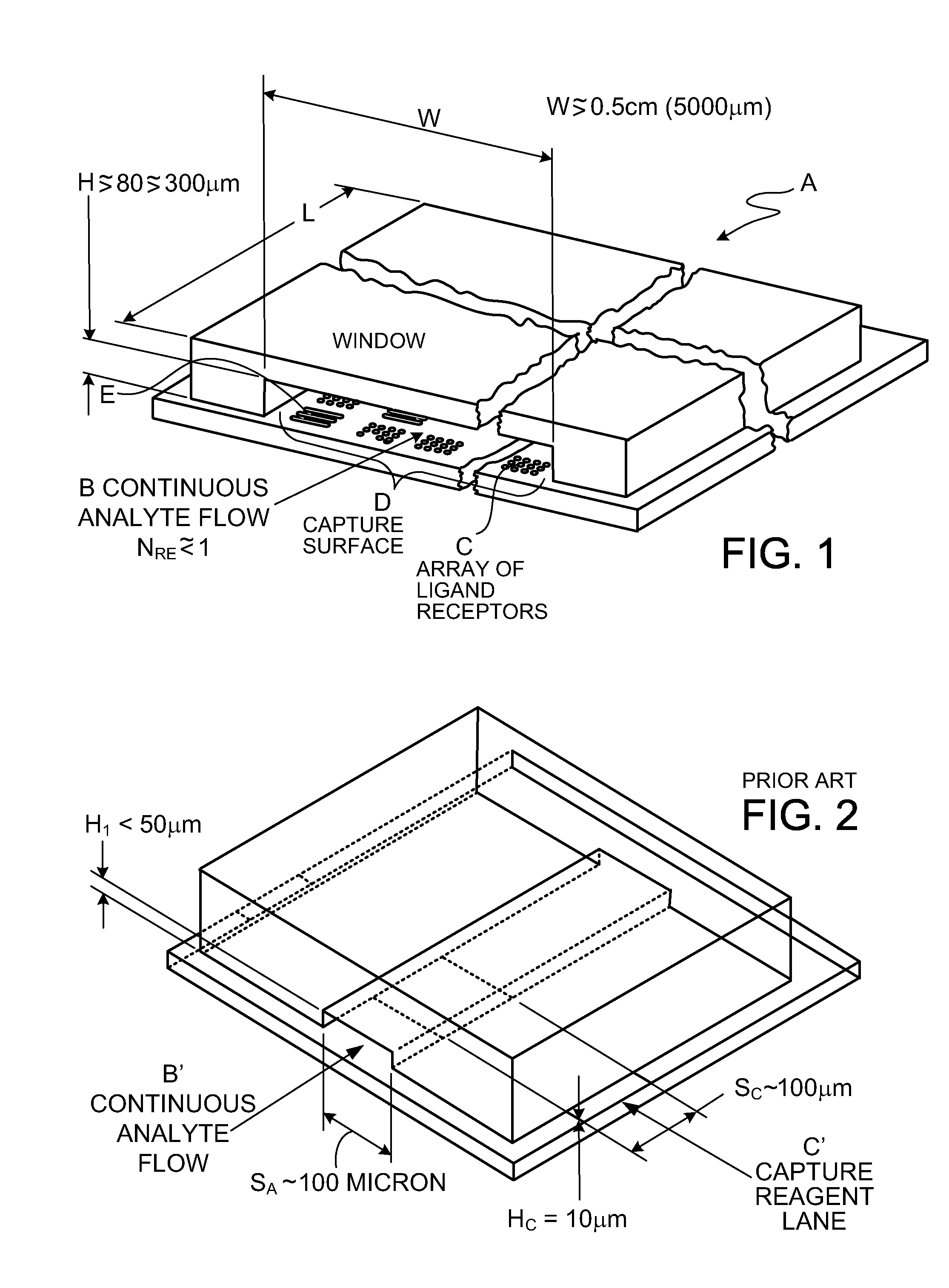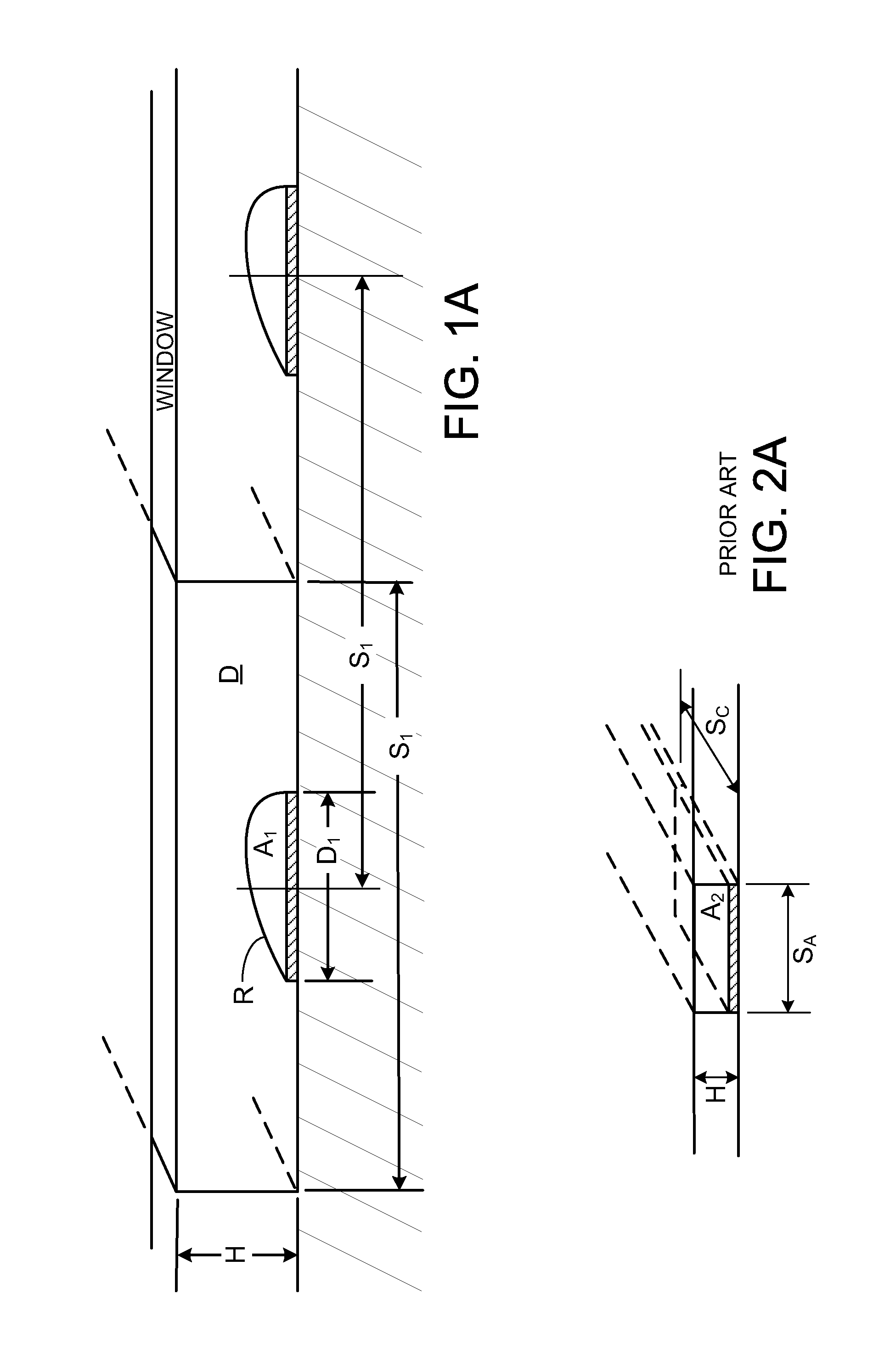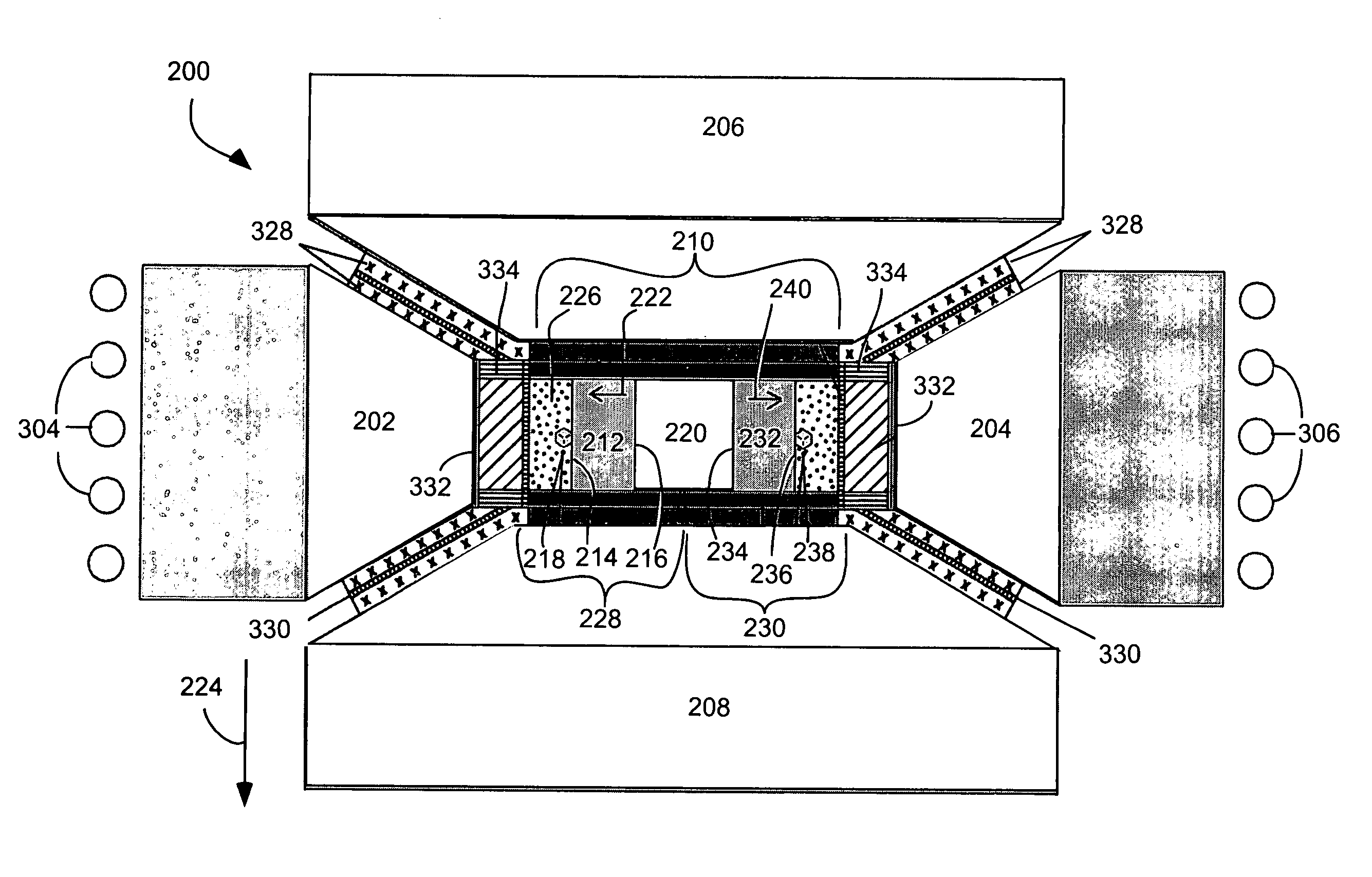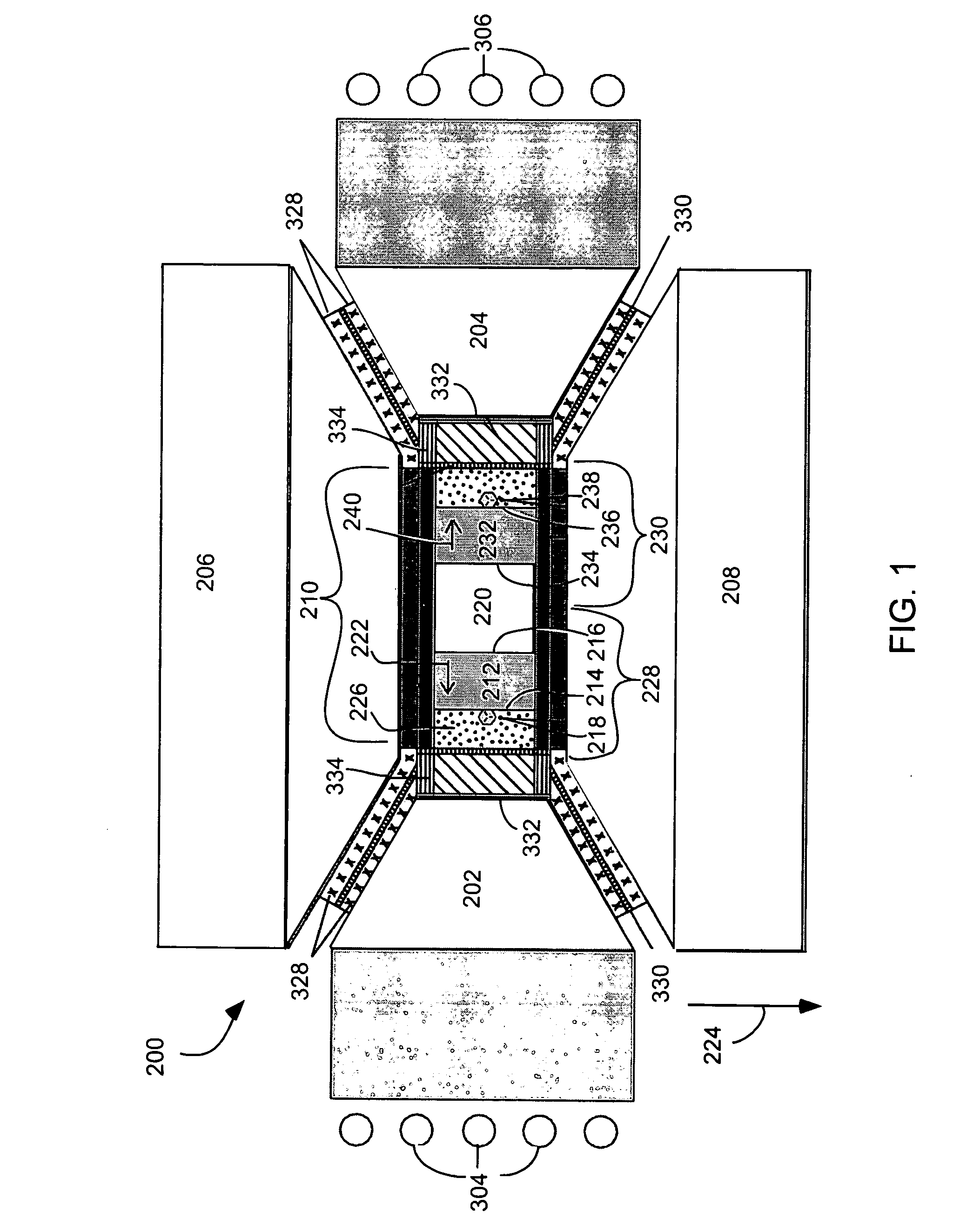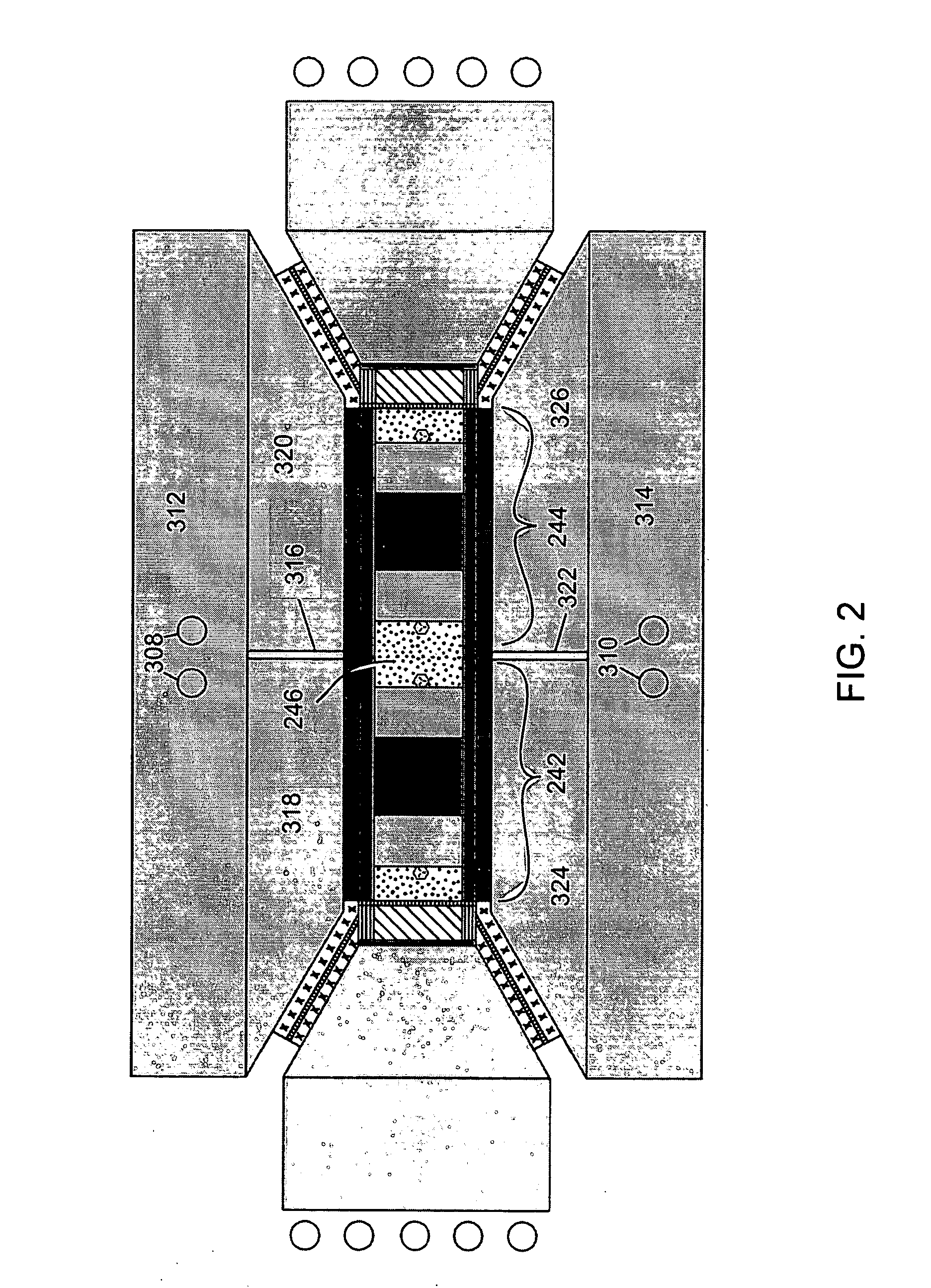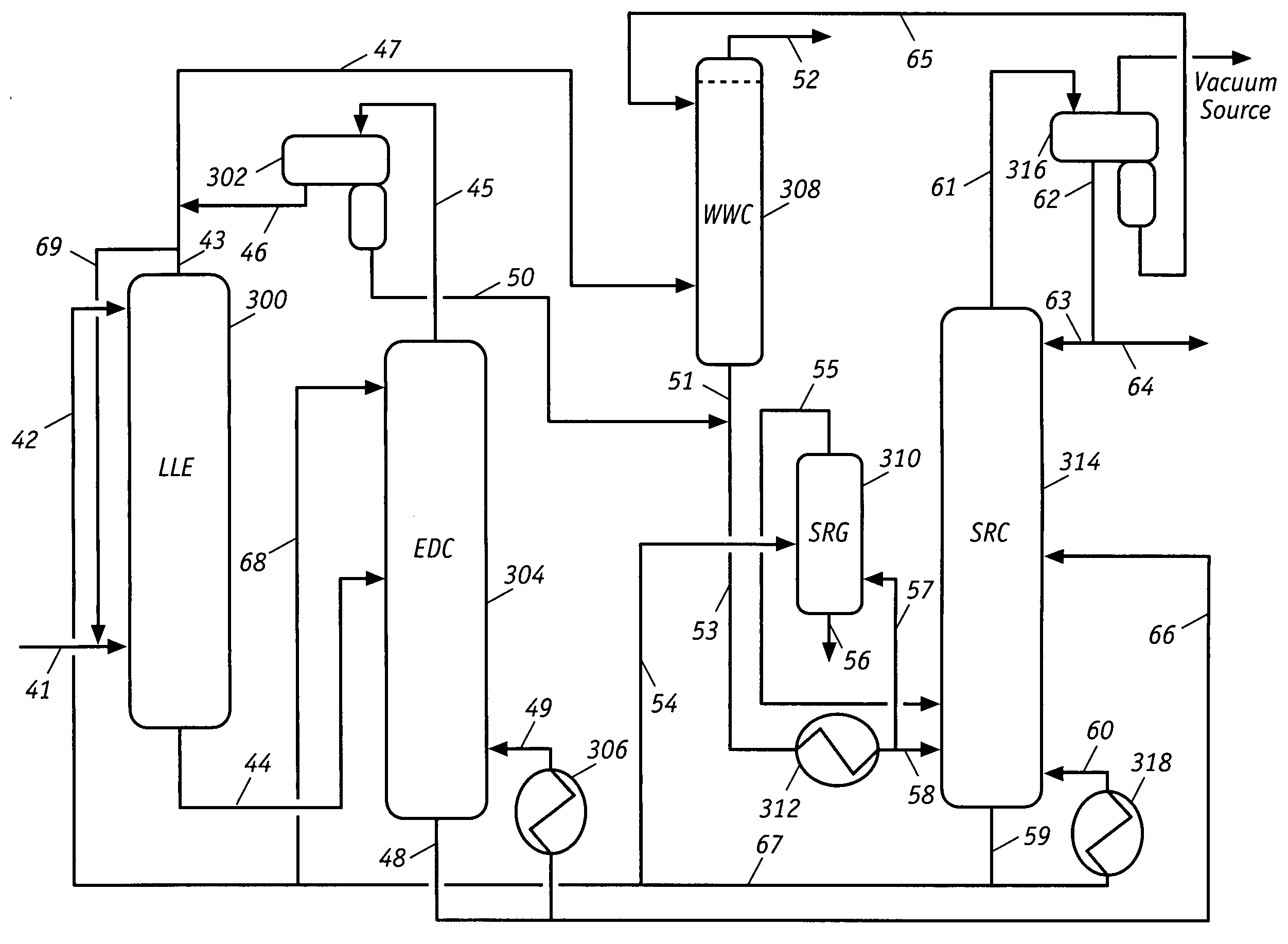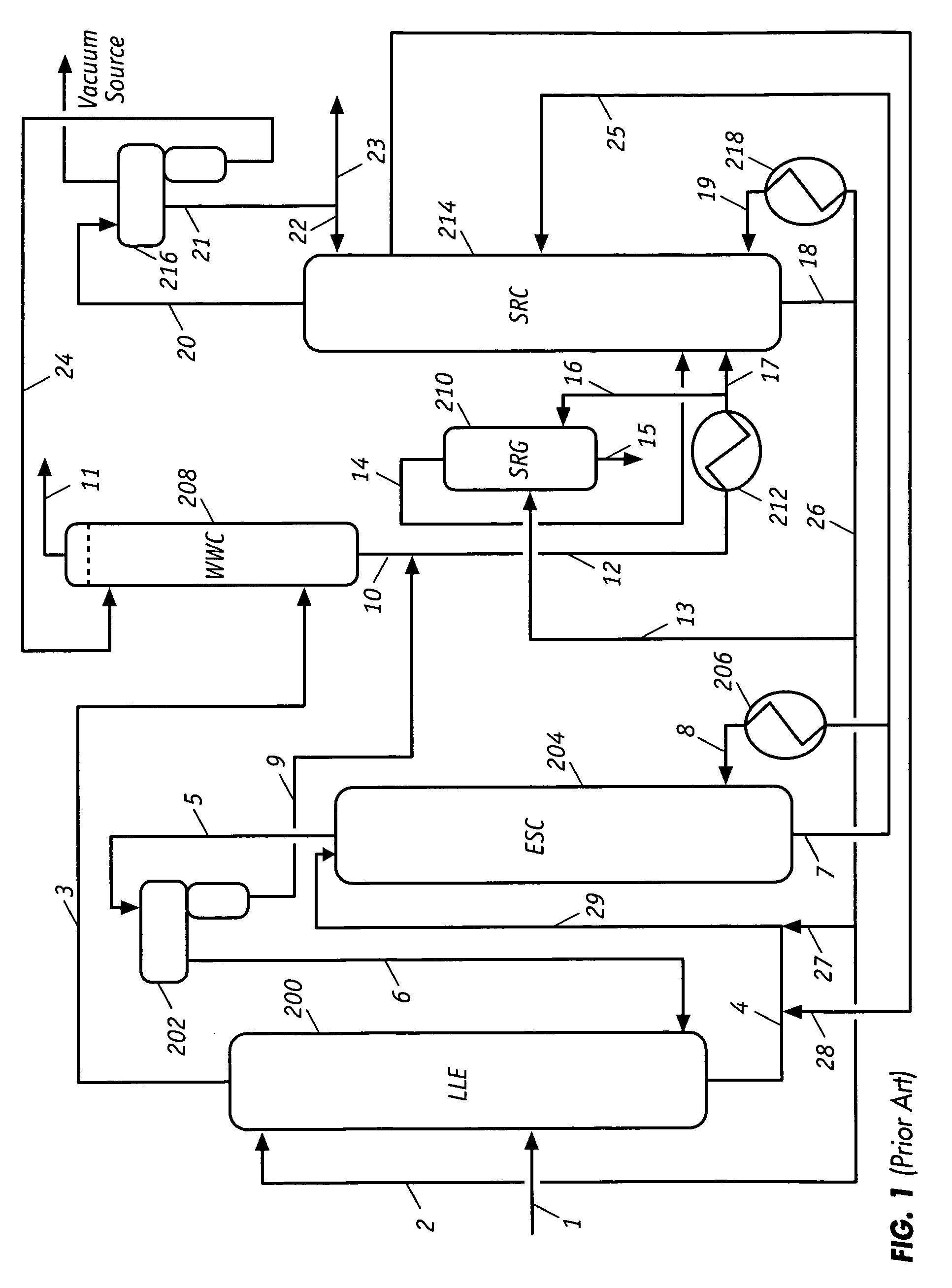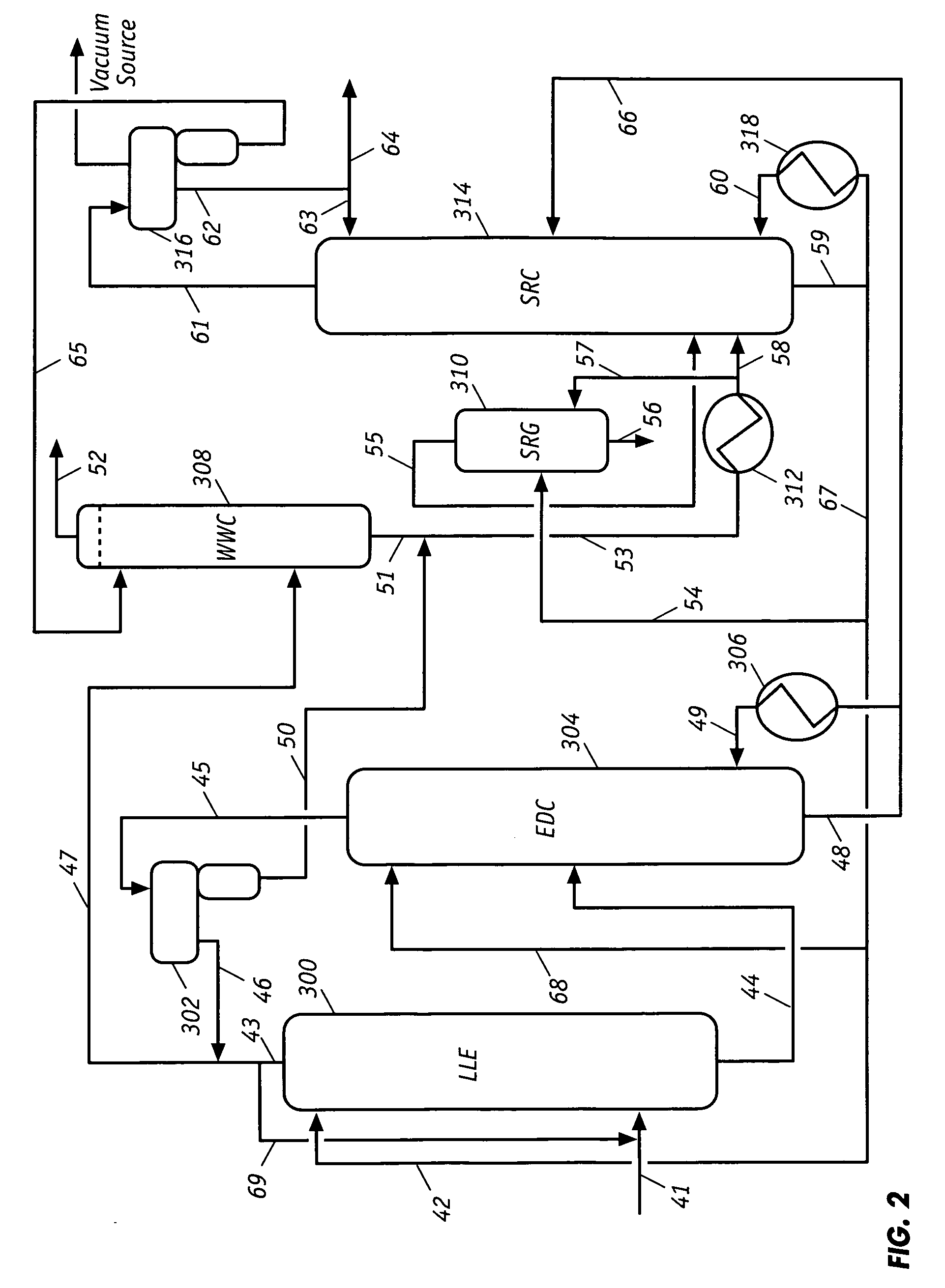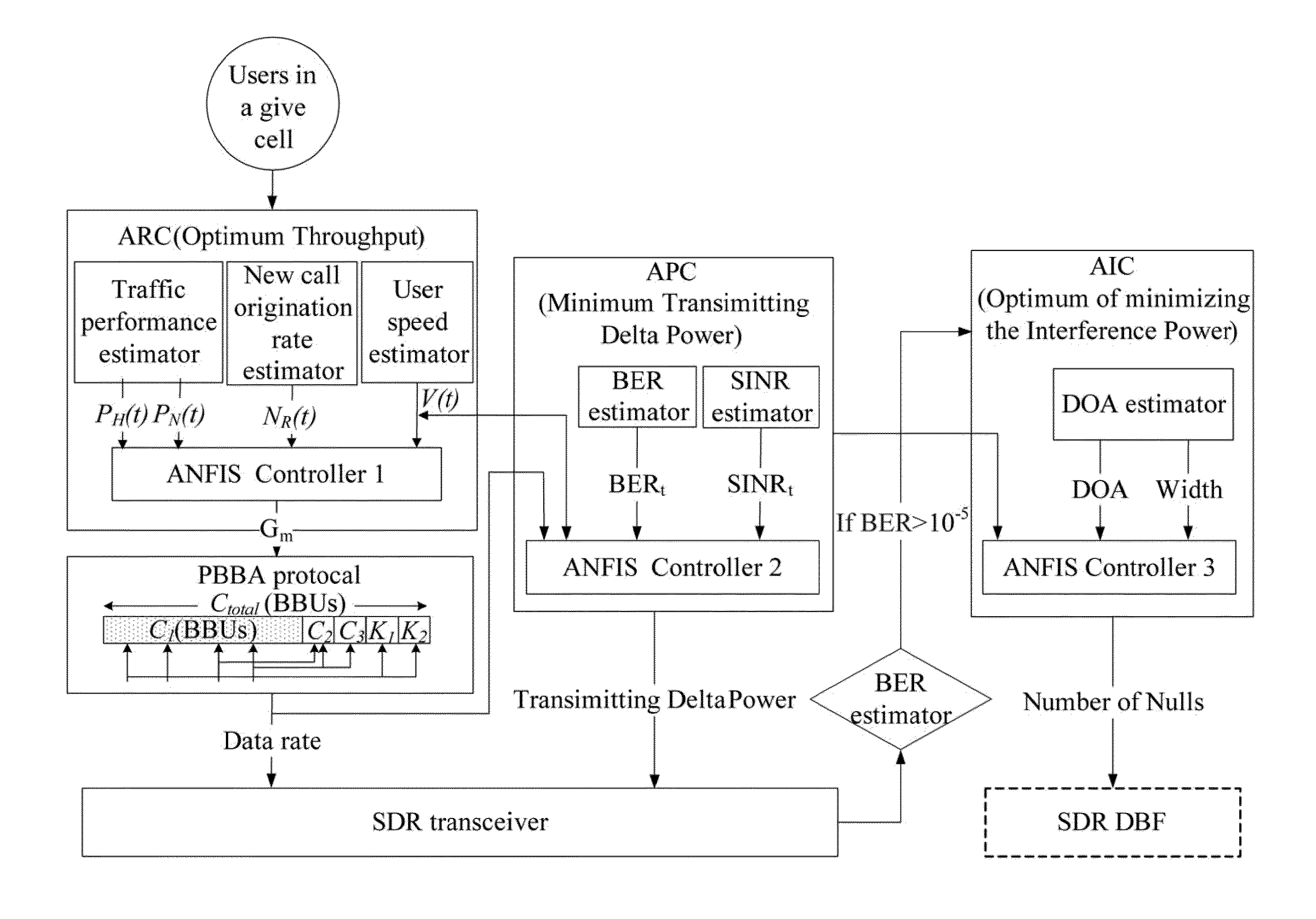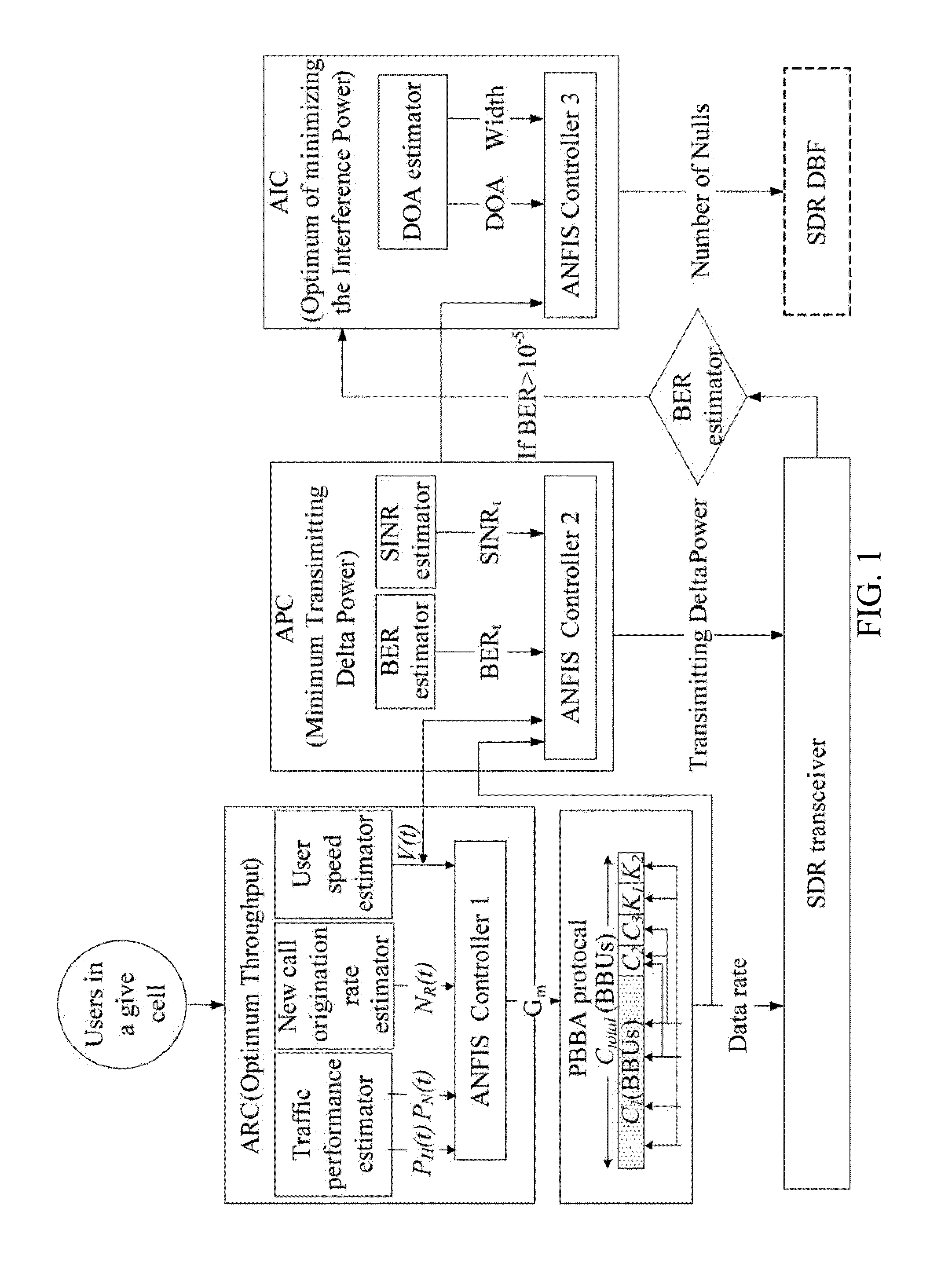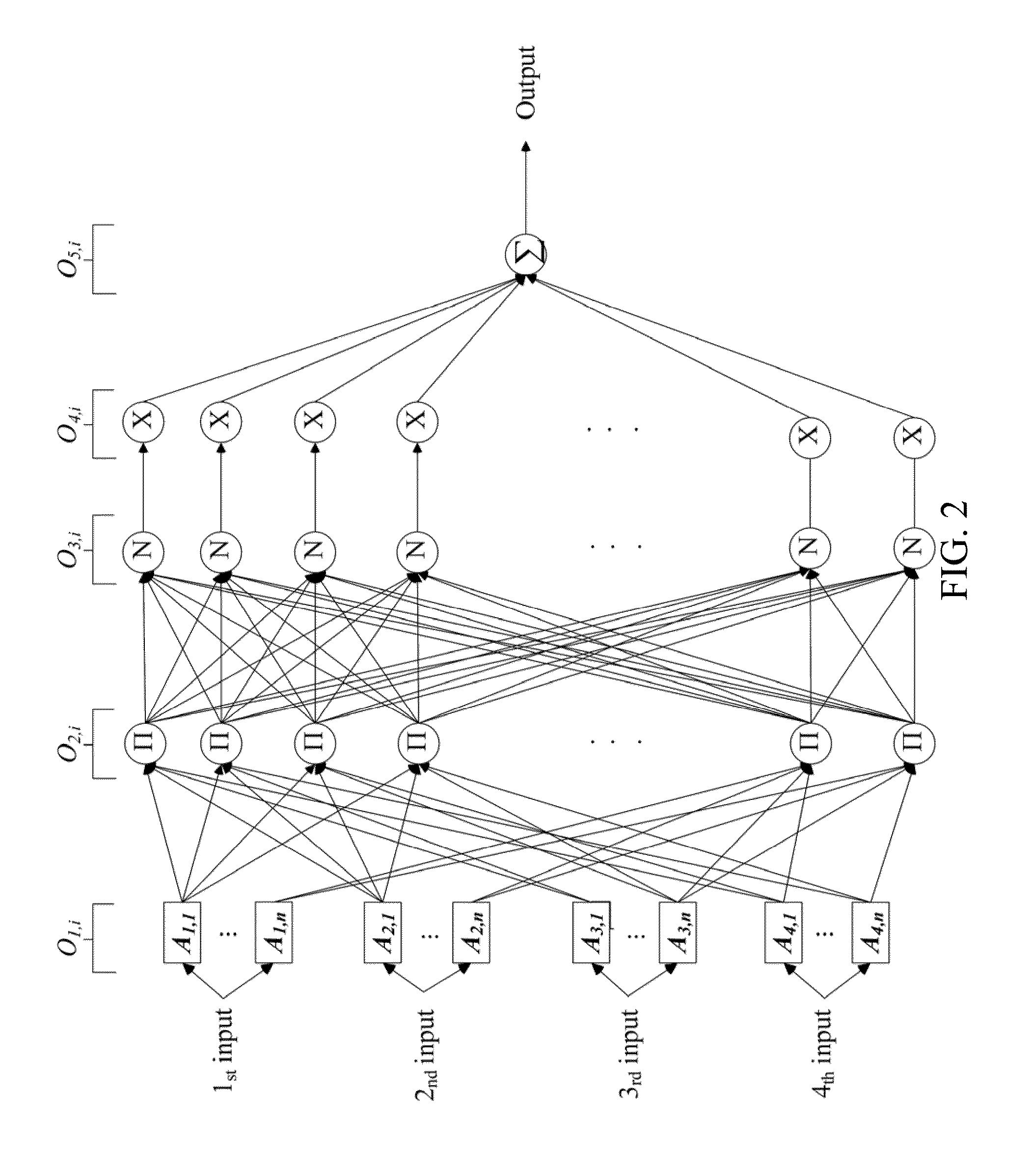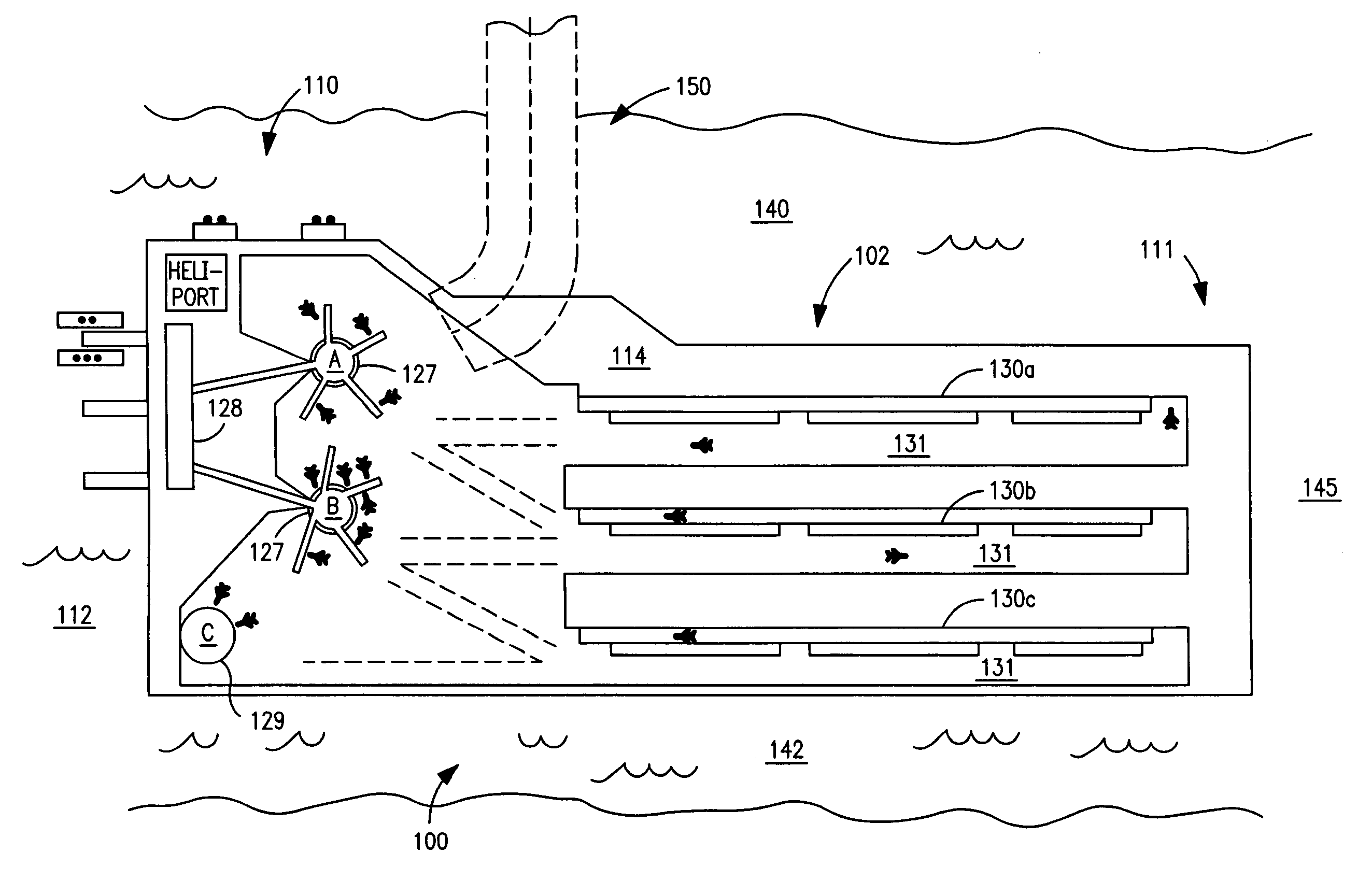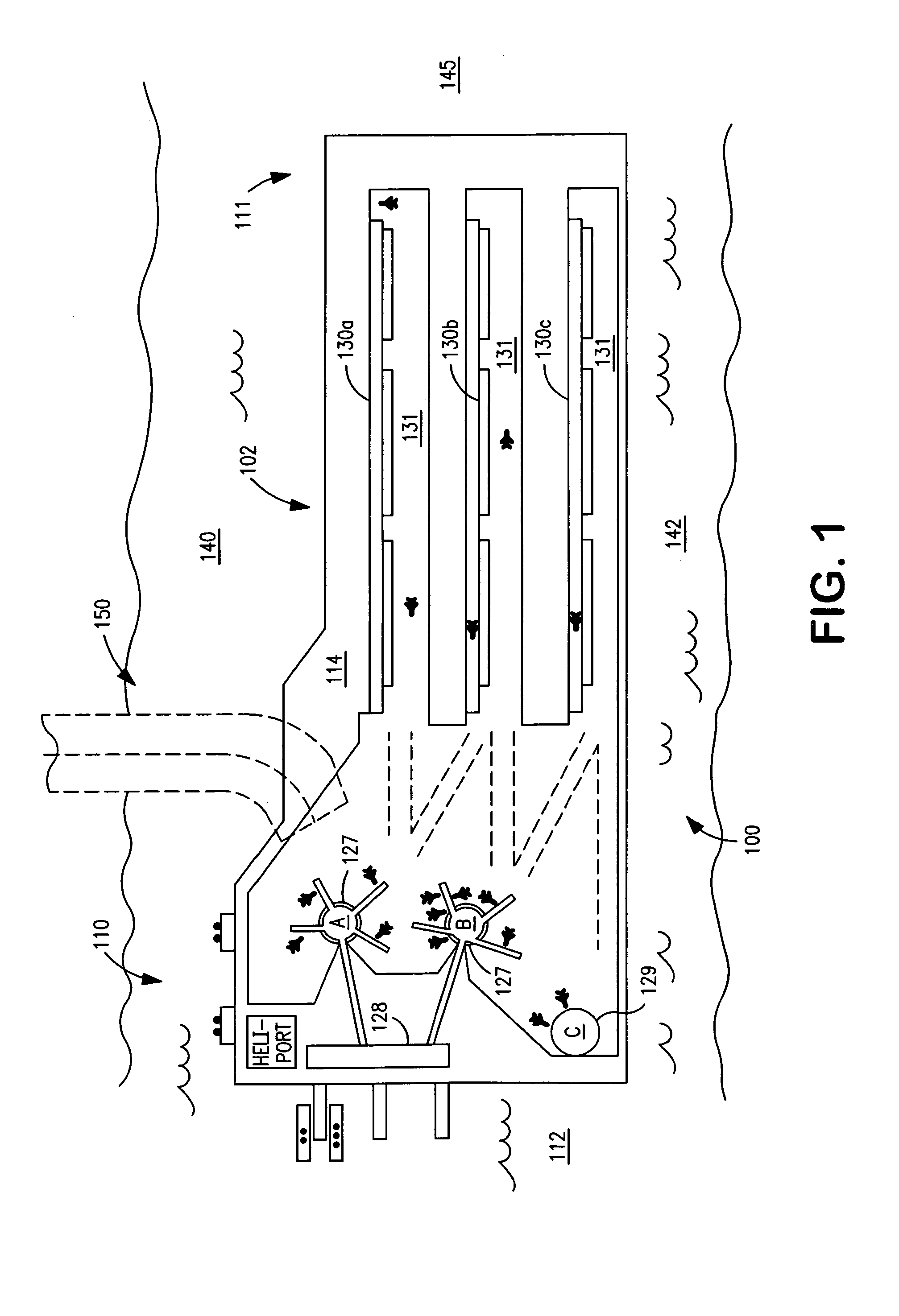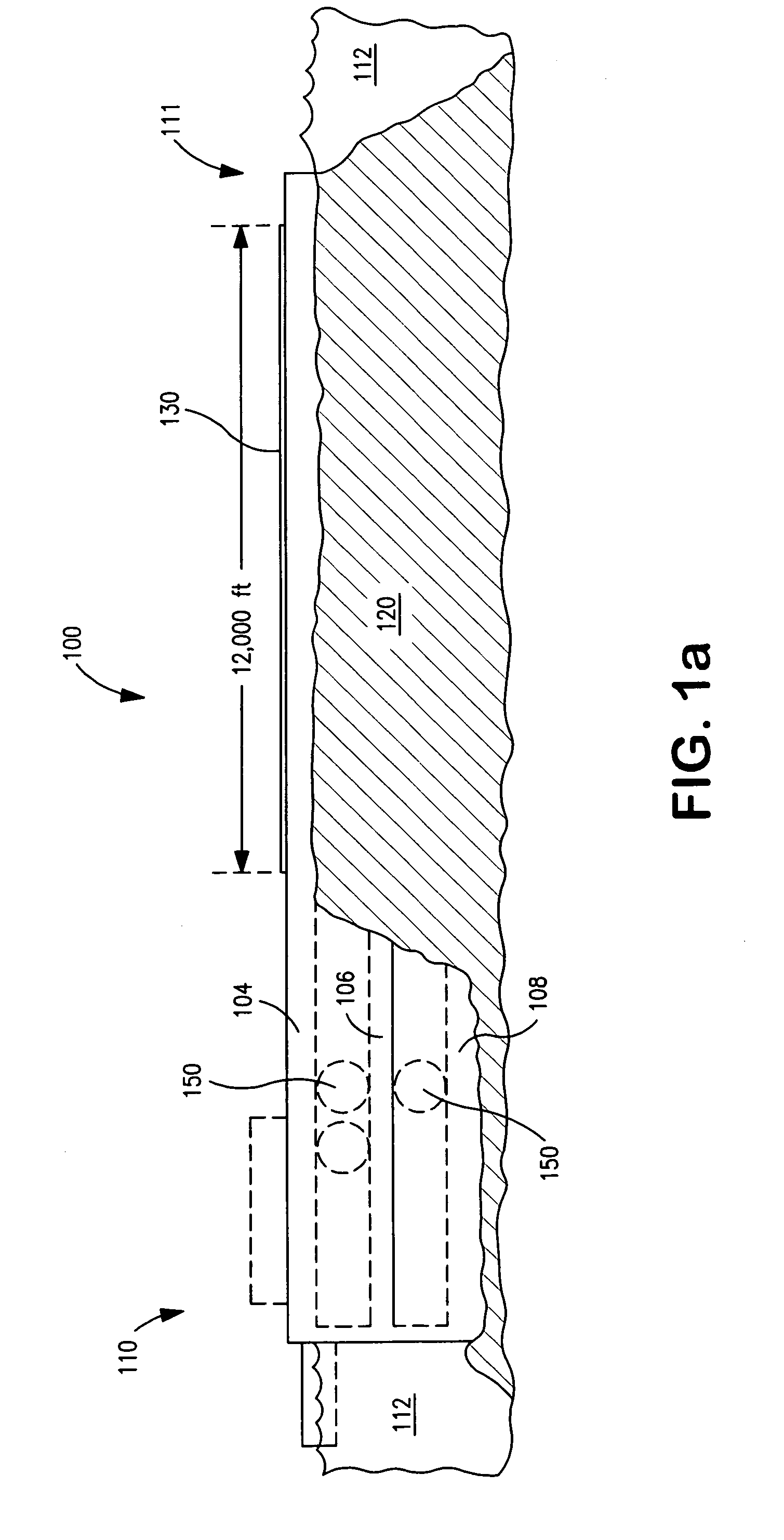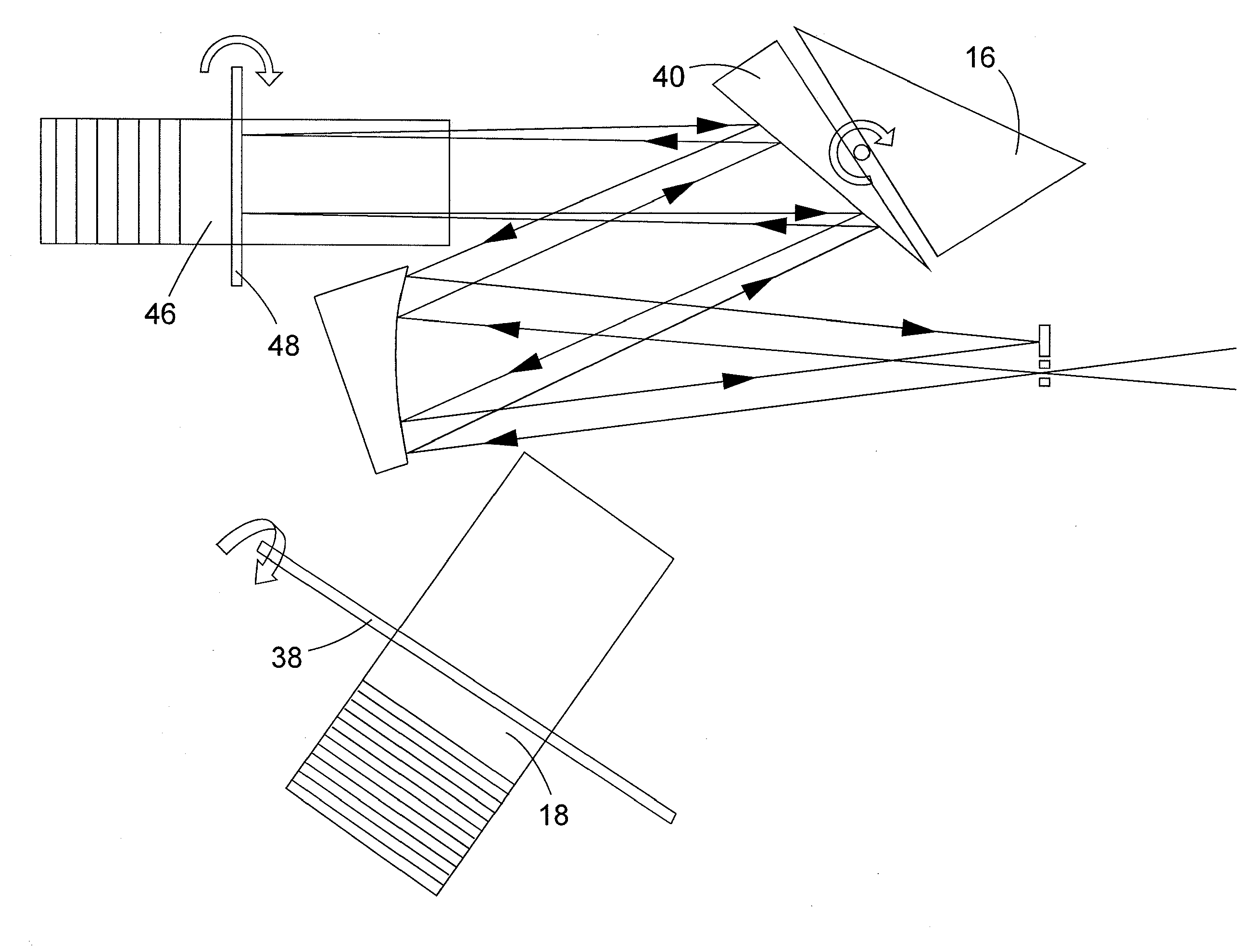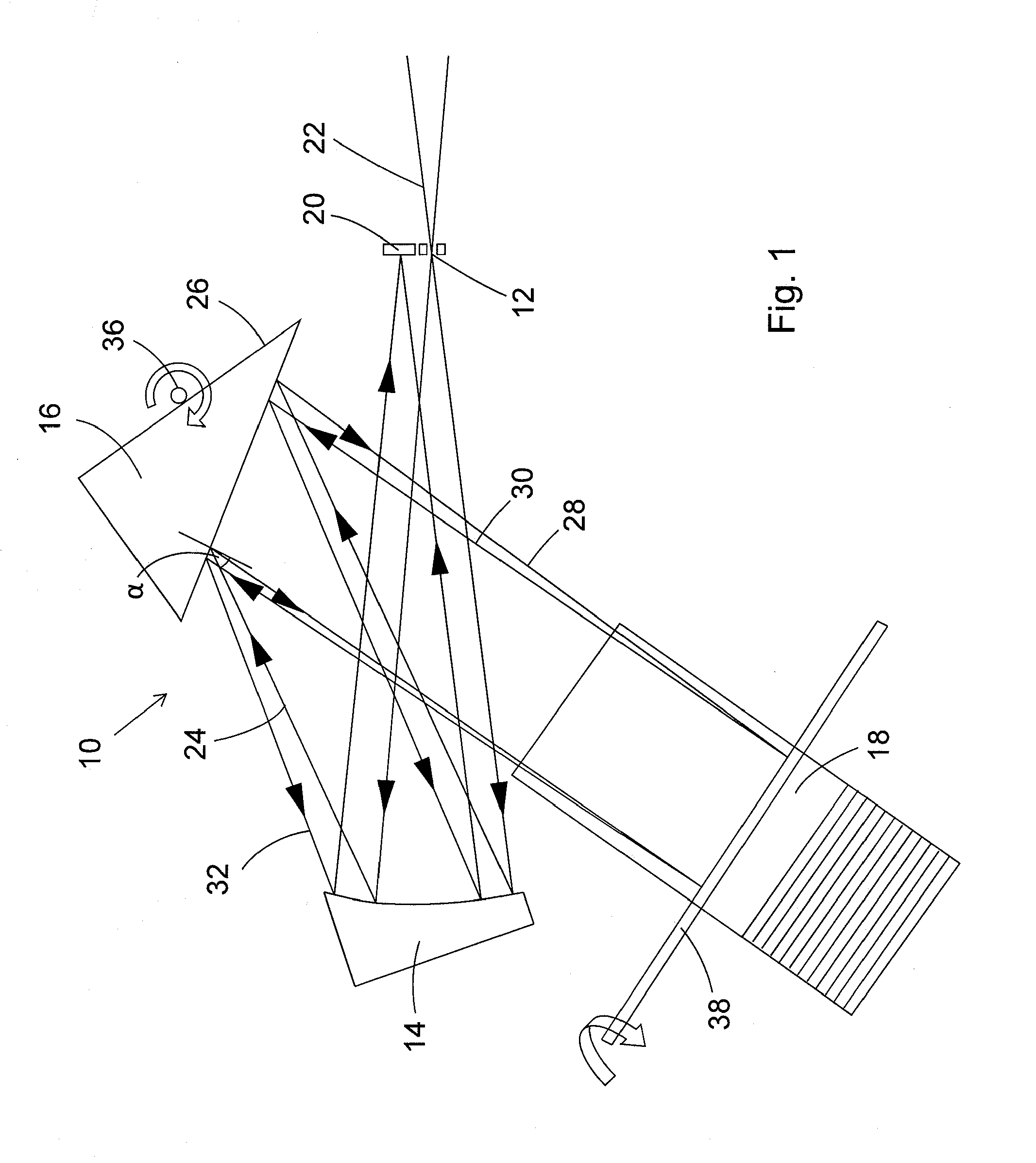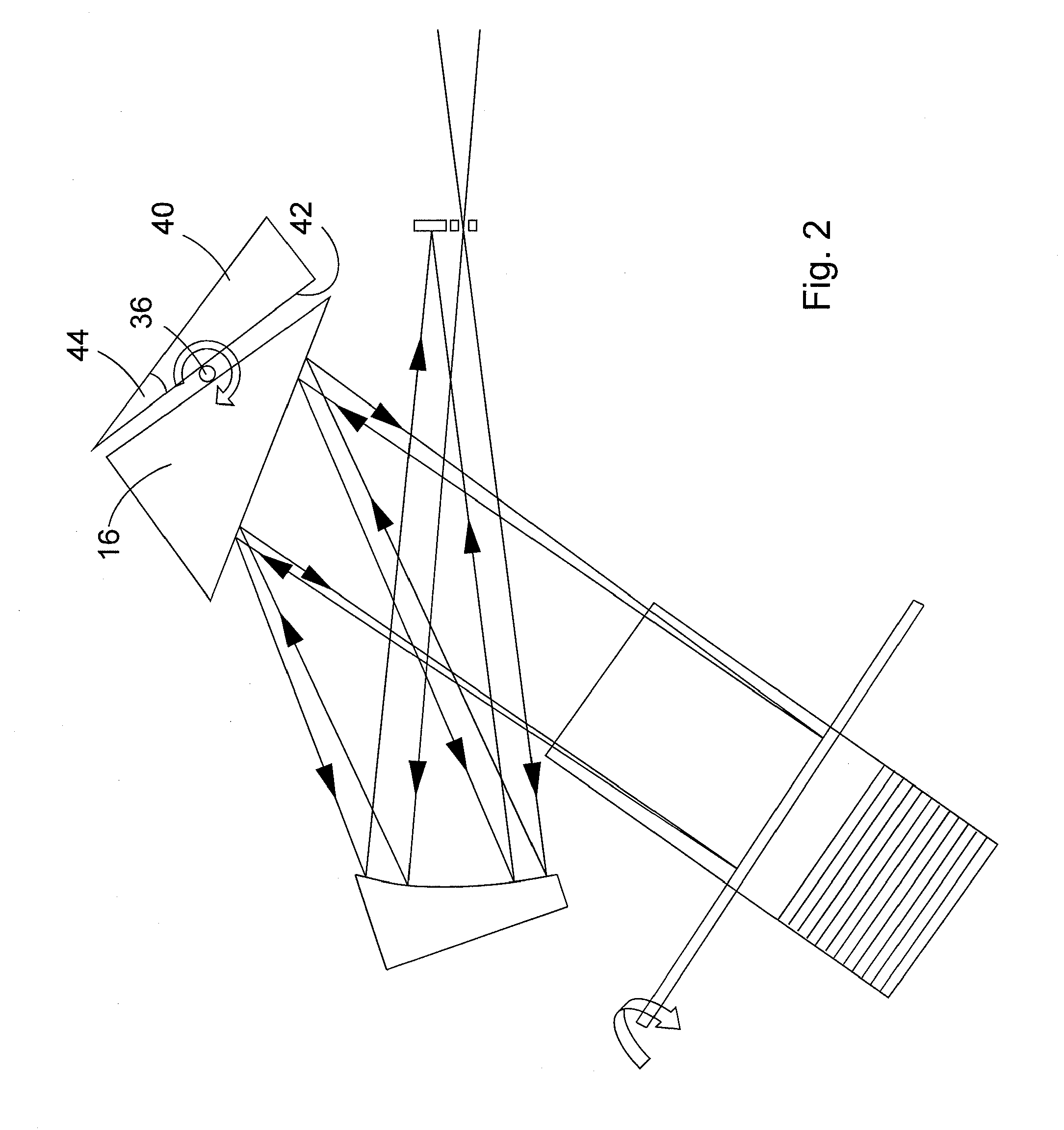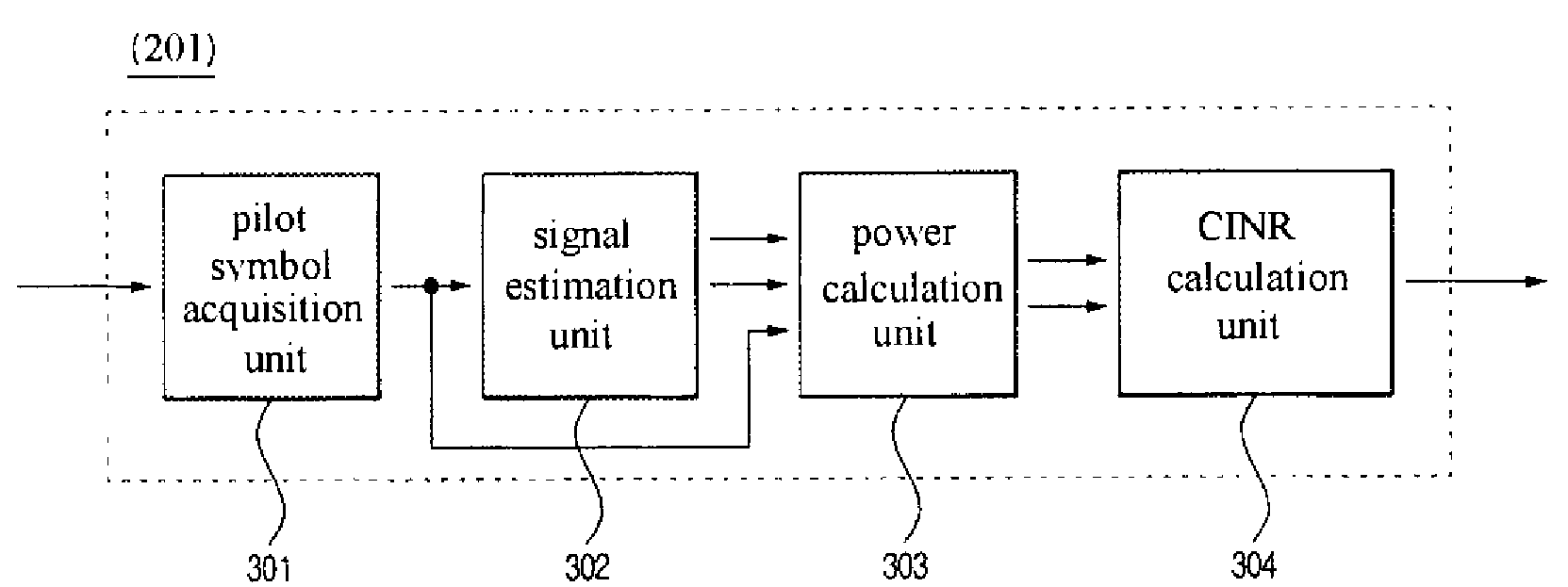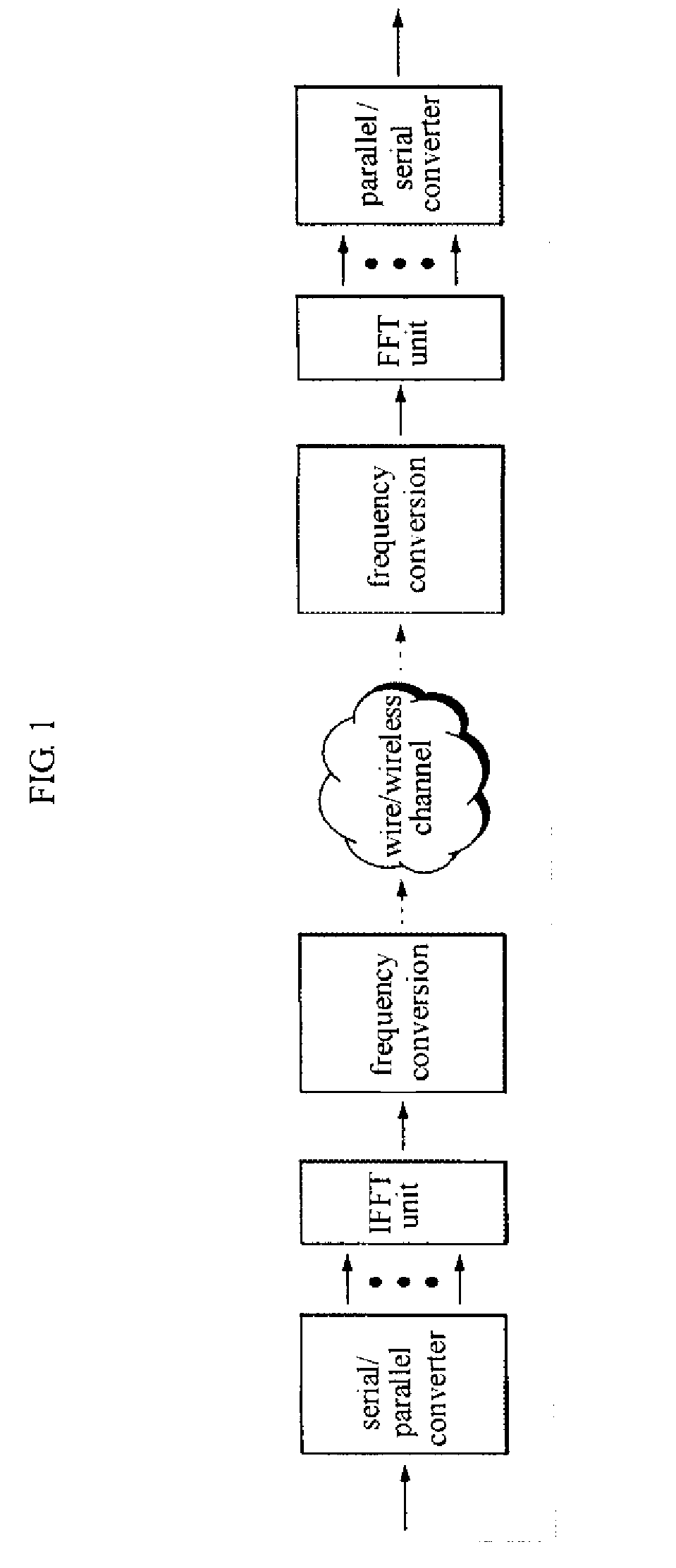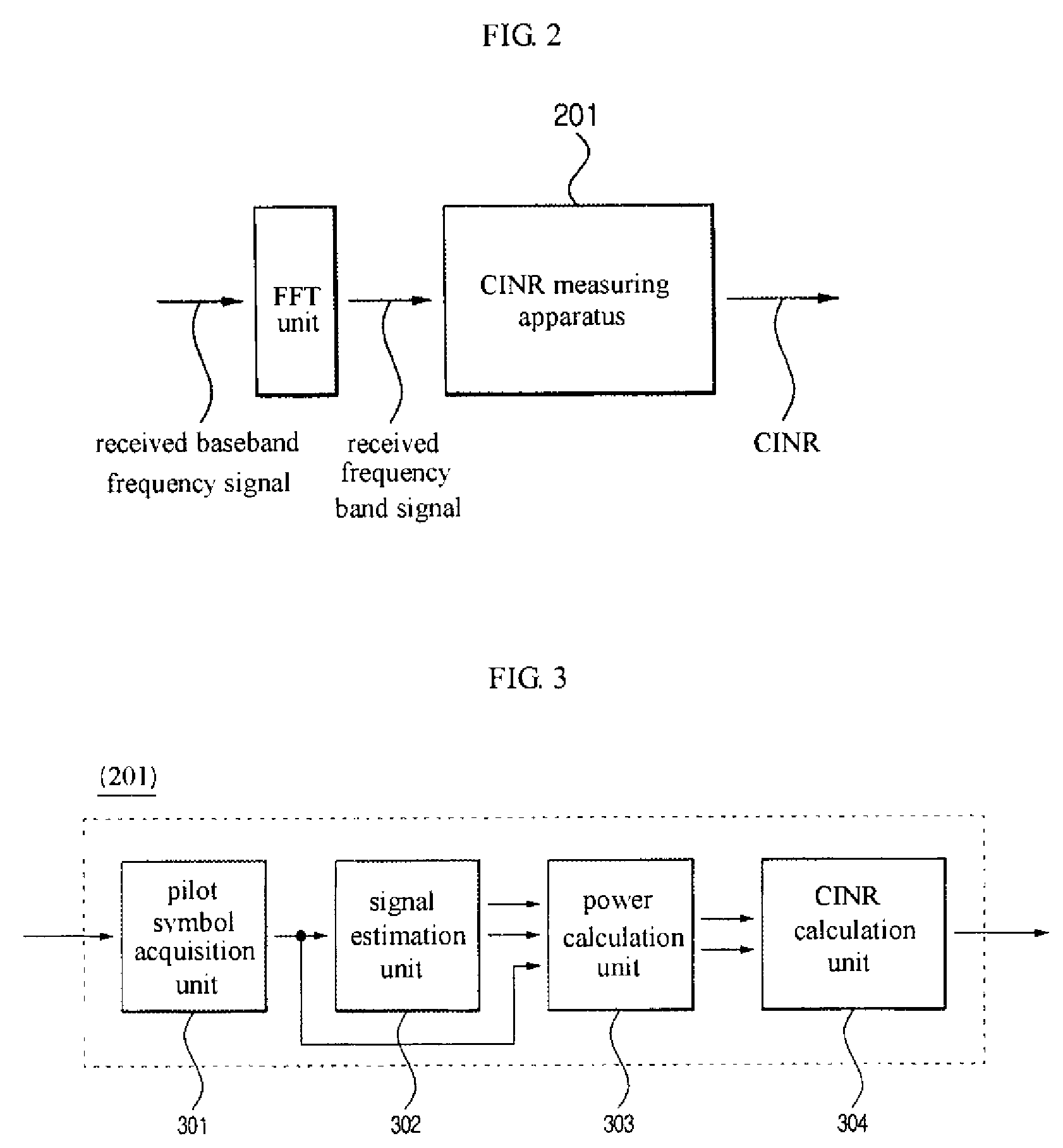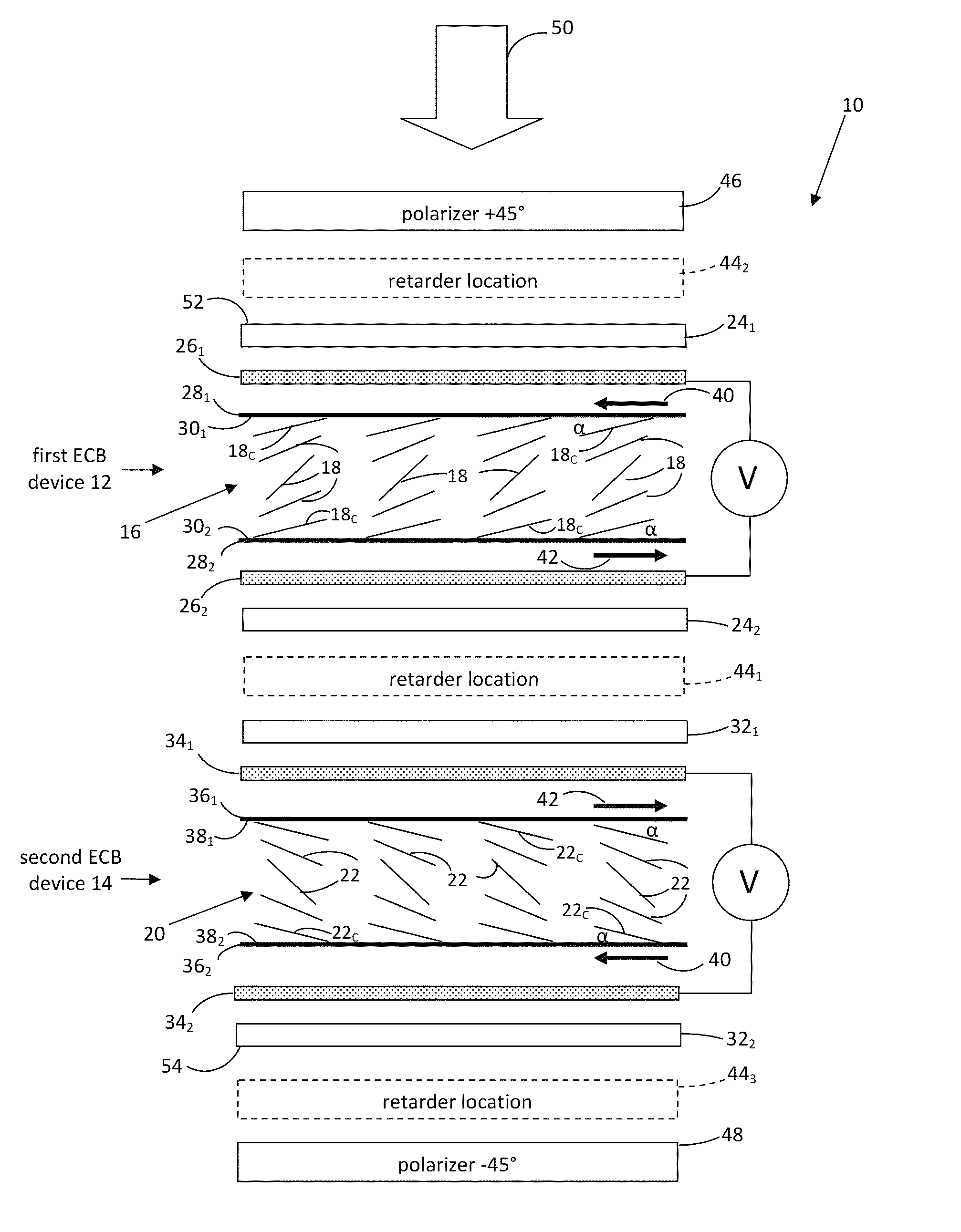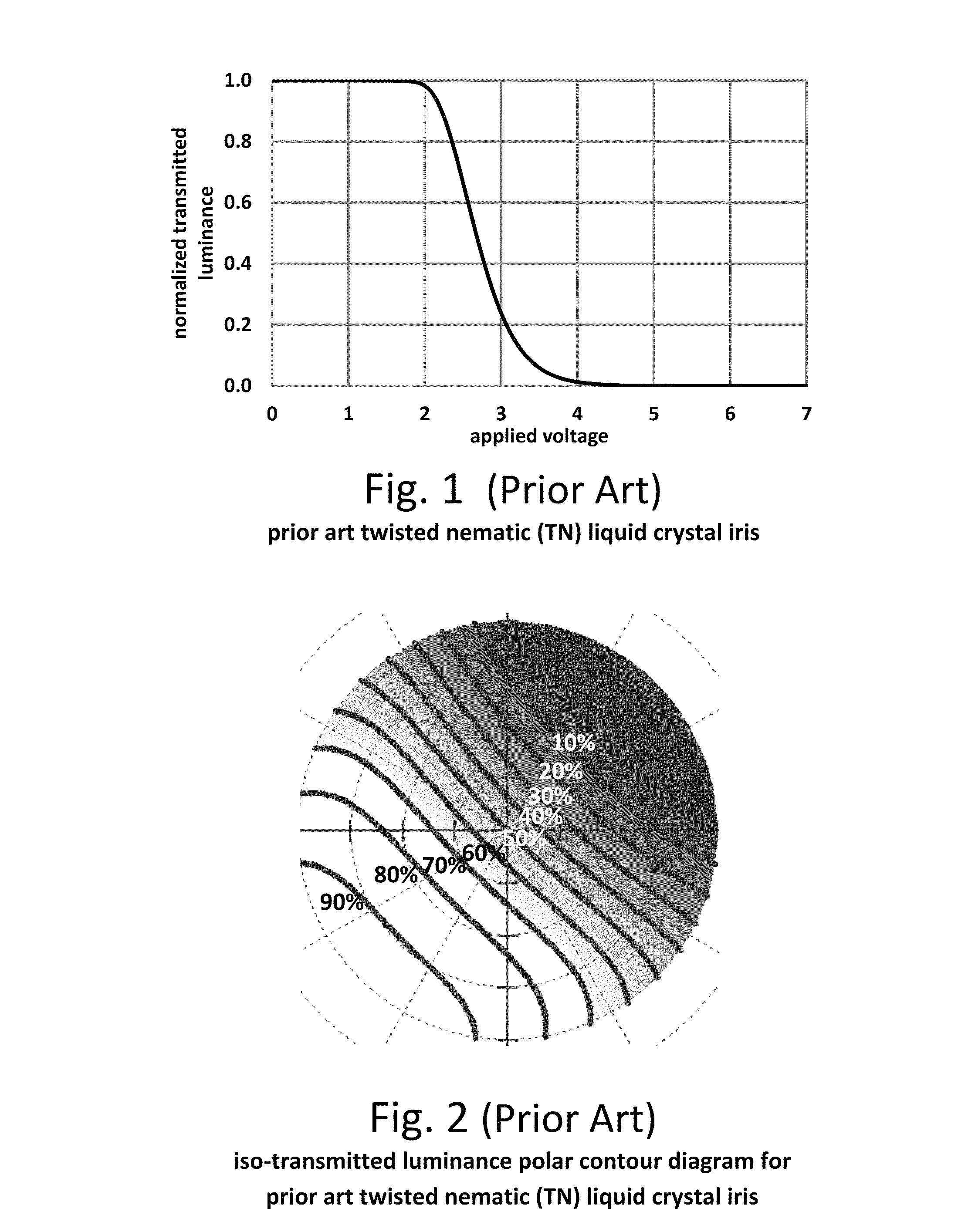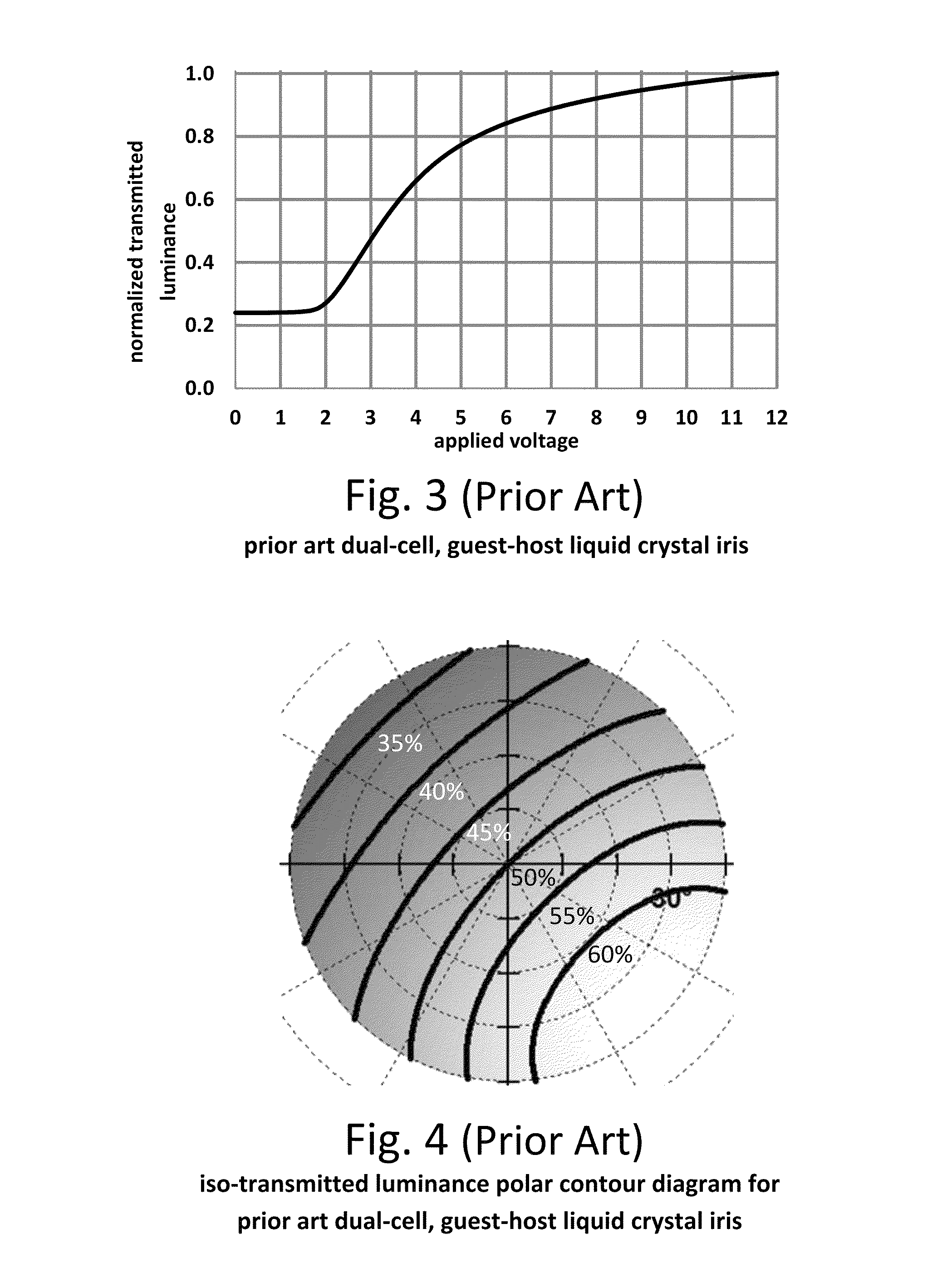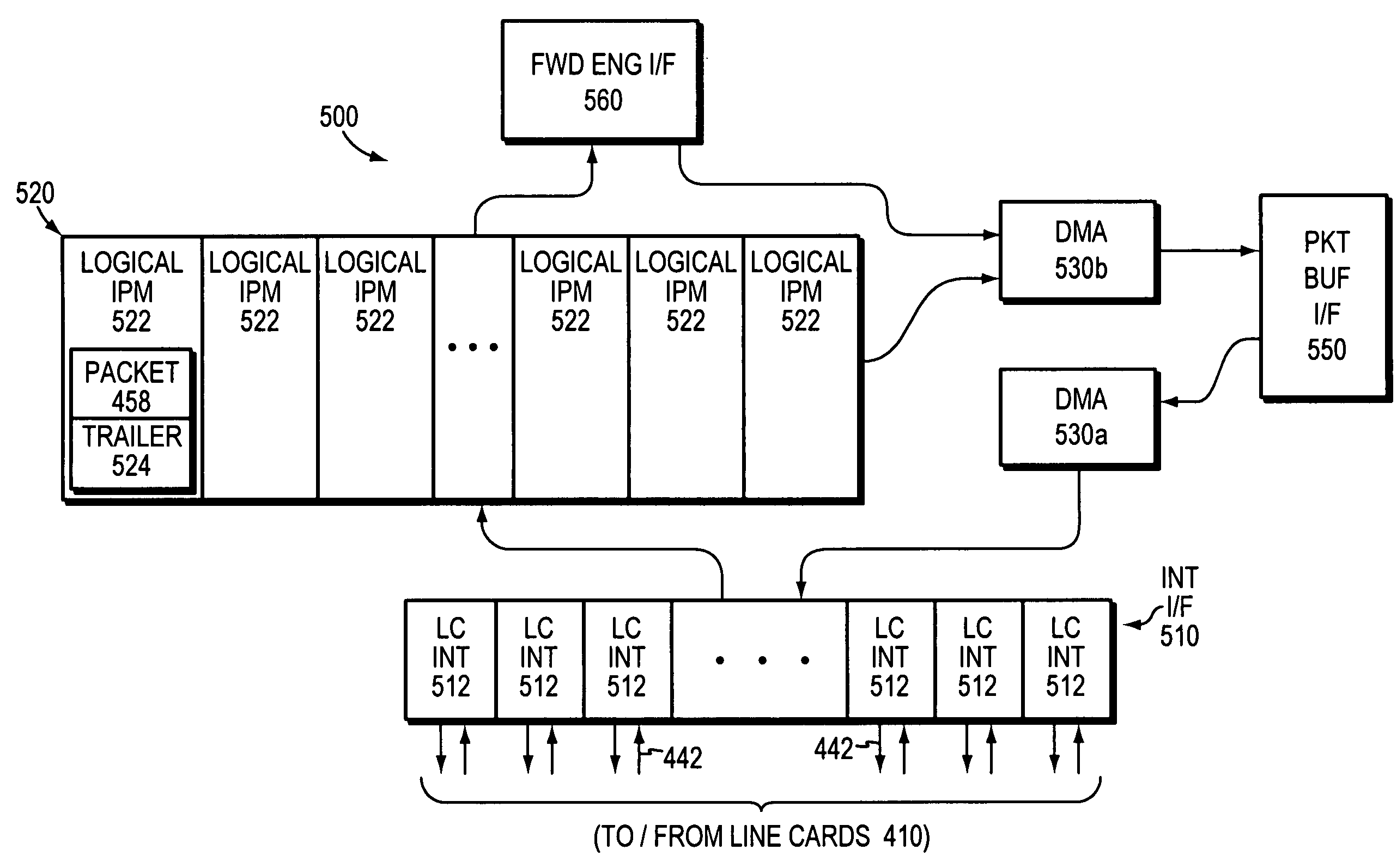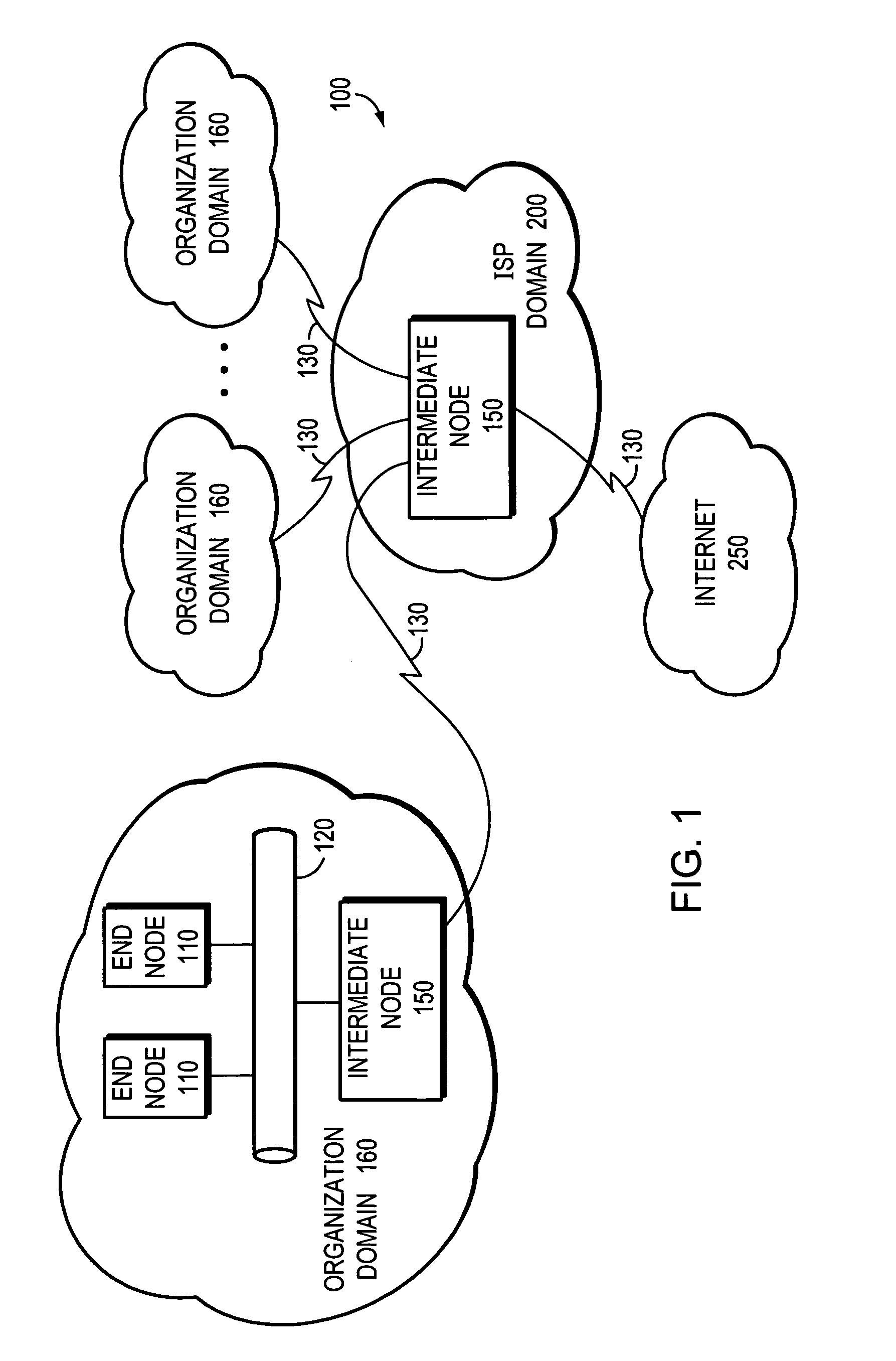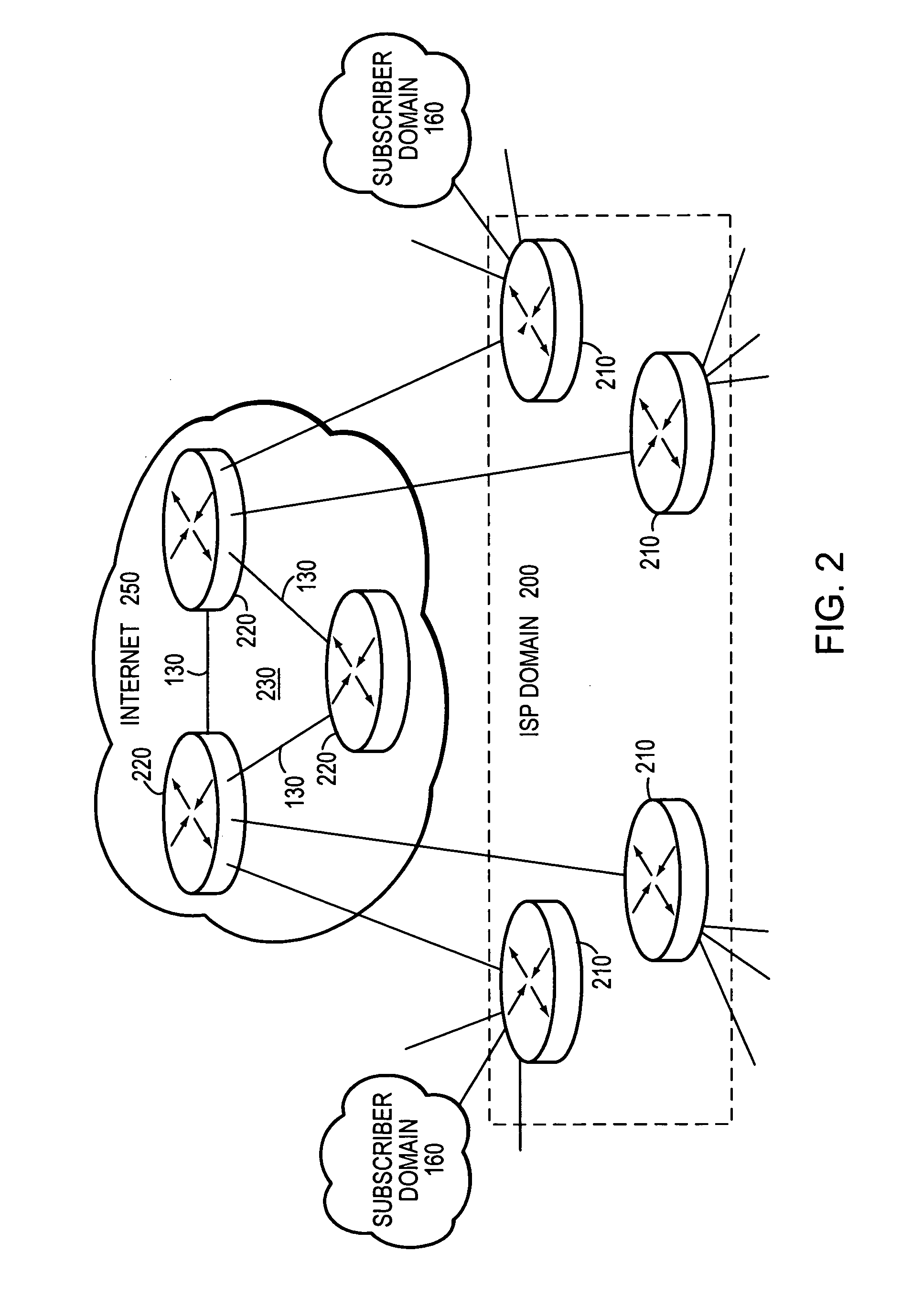Patents
Literature
156results about How to "Large throughput" patented technology
Efficacy Topic
Property
Owner
Technical Advancement
Application Domain
Technology Topic
Technology Field Word
Patent Country/Region
Patent Type
Patent Status
Application Year
Inventor
Assays based on liquid flow over arrays
InactiveUS20060275852A1Highly credible resultLow coefficient of variationBioreactor/fermenter combinationsBiological substance pretreatmentsAssayAnalyte
Cassette (50) performs assays, e.g. multiplexed protein biomarker assays. Wide, bubble-free, slow flows are produced from liquids stored on cassette (50), flowing over wide array (20) of ligand receptors on a capture surface. Flows of Reynolds Number less than about 1, preferably 1×10−1 to 5×10−3, are heated in region (34) preceding and including bubble removal system (128). Analyte is introduced through compressed septum (32). External actuations of displacement pumps (30, 37) and valves (137 A, B, and C) produce flows in response to flow-front optical sensors (150, 152). Elastic sheet provides pump and valve diaphragms and resilient expansion of mixing volume (131). Break-away cover portions are pistons. Heating is by conduction through cassette from external contact heater. Planar cassette body, when tilted from horizontal, enables upward flow from pumped storage (134, 135) to reaction (133) to waste (139), with buoyancy bubble removal before reaction. Reading of fluorescence is by external reader, employing calibration, control and reference features on capture surface. Extensive set of calibration features of differing intensities enables self-calibration.
Owner:AVANTRA BIOSCI CORP
Light-emitting device
InactiveUS7331689B2Large throughputReduce heat dissipationPlanar light sourcesLighting support devicesOptical processingLight emission
A light emitting device is disclosed, in which a body is provided with a first joining portion, light-emitting elements located at a side of the body having the first joining portion for emitting light and an optical processing element disposed at a side of the light-emitting elements having a second joining portion corresponding to the first joining portion for processing light emitted from each light-emitting element, such that even light emission is obtained.
Owner:GRAND HALO TECH
Endoscope
InactiveUS6817975B1Highly aberration correctedReduce sensitivitySurgeryEndoscopesIntermediate imageMagnification
Improved optical devices and methods transmit optical images along elongate optical paths with relatively limited cross-sectional dimensions using an improved objective, relay, and ocular systems. In a first aspect, at least one intermediate image formed within an optical component, rather than being formed in a gap between optical components. In a preferred embodiment, a first intermediate image is formed within glass of the most proximal objective lens, with the first intermediate image extending axially along a curved image location within the glass. The last intermediate image may similarly be disposed within a distal lens of the ocular system. By making use of a first and / or last intermediate image disposed in this manner within a lens, endoscopes can exhibit a significantly larger Numerical Aperture than known endoscopes having similar cross-sectional dimensions. In a second aspect, the ocular system allows independent adjustment of diopters, magnification, X-Y positioning, and rotation orientation of the captured image while introducing minimal aberrations.
Owner:INTUITIVE SURGICAL OPERATIONS INC
III-nitride semiconductor device with trench structure
ActiveUS20050145883A1Large current throughputHigh carrier mobilityTransistorSemiconductor/solid-state device manufacturingElectric fieldDielectric
A III-nitride trench device has a vertical conduction region with an interrupted conduction channel when the device is not on, providing an enhancement mode device. The trench structure may be used in a vertical conduction or horizontal conduction device. A gate dielectric provides improved performance for the device by being capable of withstanding higher electric field or manipulating the charge in the conduction channel. A passivation of the III-nitride material decouples the dielectric from the device to permit lower dielectric constant materials to be used in high power applications.
Owner:INFINEON TECH AMERICAS
Efficient one-to-many content distribution in a peer-to-peer computer network
InactiveUS7593333B2Large throughputEfficiently contentSpecial service provision for substationError prevention/detection by using return channelContent distributionPacket loss
Owner:MICROSOFT TECH LICENSING LLC
Efficient one-to-many content distribution in a peer-to-peer computer network
InactiveUS20060007947A1Maximum possible throughputEfficiently contentSpecial service provision for substationError prevention/detection by using return channelContent distributionPacket loss
A content distribution method and system for distributing content over a peer-to-peer network such that the full potential throughput of the network is achieved. The content distribution method divides the content to be distributed into many small blocks. Each of the content blocks then is assigned to a node, which can be a content-requesting node, a non-content-requesting node or a source node. Content is assigned based on a capacity of the node, where nodes having a larger capacity are assigned a greater number of content blocks and nodes having a smaller capacity are assigned a fewer content blocks. The capacity generally is defined as the upload bandwidth of the node. Redistribution queues are employed to control the throughput of the distribution. This bandwidth control strategy ensures that upload bandwidths of the peer and source nodes are fully utilized even with network anomalies such as packet losses and delivery jitters.
Owner:MICROSOFT TECH LICENSING LLC
Multi-Mode Control Station, Radio Communication System, Radio Station, and Radio Communication Control Method
InactiveUS20080200195A1Improve system throughputLarge throughputNear-field transmissionTransmission control/equalisingCommunication unitTelecommunications link
The overall throughput of the radio communication traffic in a radio communication area in a radio communication environment where a plurality of types of radio communication systems are mixedly used in a neighboring radio communication area is improved. When a multi-mode control station (101) performs communication with a terminal station in a network through a plurality of types of communication systems, a communication link parameter collecting section (10141) collects parameters indicating the states of the communication links. A resource allocation determining section (10143) determines communication resource allocation for which the throughput is the greatest for each resource allocation period according to the parameters. A communication control section (1015) controls a multi-mode communication unit (1012) according to the result of the determination.
Owner:KOHNO RYUJI +1
Dynamic and intelligent buffer management for SAN extension
InactiveUS20060159112A1Maximum throughputLarge throughputTime-division multiplexData switching by path configurationData bufferTransport network
In a network system for transporting GFP-encapsulated Fibre Channel / FICON data across a SONET / SDH transport network between two Fibre Channel / FICON ports, a transport interface for one Fibre Channel / FICON port intelligently allocates the amount of buffers for receiving Fibre Channel / FICON data from the other Fibre Channel / FICON port by determining the latency of travel across the SONET / SDH transport network. The first transport interface inserts a special latency instruction message into the Fibre Channel / FICON data before encapsulation in a GFP frame. After transport across the SONET / SDH network, the receiving second transport interface immediately sends the special latency instruction message back across the SONET / SDH transport network to the first transport interface which times the return of the special latency instruction message. From the time interval, the first transport interface can determine the latency of the SONET / SDH transport network and allocates the amount of buffers appropriately. This latency determination procedure is performed periodically so that the amount of allocated buffers can change as the latency of the SONET / SDH transport network changes.
Owner:CISCO TECH INC
Providing secure network access for short-range wireless computing devices
InactiveUS6851050B2Improve system performanceImprove scalabilityKey distribution for secure communicationUser identity/authority verificationEncrypted functionClient-side
The present invention provides methods, systems, and computer program instructions for providing location-independent packet routing and secure access in a wireless networking environment (such as that encountered within a building), enabling client devices to travel seamlessly within the environment. Each client device uses a constant address. An address translation process that is transparent to the client and server is automatically performed as the device roams through the environment, enabling efficient client migration from one supporting access point to another. The secure access techniques provide user-centric authentication and allow policy-driven packet filtering, while taking advantage of encryption capabilities that are built in to the hardware at each endpoint.
Owner:REEFEDGE
Energy efficient medium access control protocol for IEEE 802.11 WLANs
InactiveUS20060028984A1Improve energy consumptionWaste the scarce energy and bandwidthEnergy efficient ICTError preventionCarrier signalTraffic conditions
IEEE 802.11 power management scheme for an ad hoc network is based on the Carrier Sense Multiple Access with Collision Avoidance (CSMA / CA) access procedure to transmit / receive their data frames. CSMA / CA may waste the scarce energy and bandwidth due to frame collisions and lengthen the frame delay due to waiting backoff time. In addition, IEEE 802.11 power management scheme does not specify how to tune the ATIM window size in a beacon interval. However, the ATIM window size affects the power consumption and throughput of a network considerably. The fixed ATIM window size cannot always accommodate the various traffic conditions. To conquer these problems and to improve the performance of networks, we propose a energy efficient MAC protocol for IEEE 802.11 networks by scheduling transmission after the ATIM window and adjusting the ATIM window dynamically to adapt to the traffic status.
Owner:CHANG GUNG UNIVERSITY
MoCA frame bundling and frame bursting
ActiveUS20090010263A1Easy to optimizeReduces overall per-packet protocol overheadBroadband local area networksMultiple digital computer combinationsPhysical layerClient data
A system and method are provided for aggregating Multimedia over Coax Alliance (MoCA) Medium Access Control (MAC) frames. The method sends a Multiframe Reservation Request (MRR) requesting a transmission time slot, and receives a grant in response to the MRR. Subsequent to sending the MRR, a plurality of MoCA MAC frames are accepted and assembled into a physical layer (PHY) burst packet that is transmitted in the granted time slot. A method is also provided for bundling client data packets into a MoCA MAC frame. The method sends a Bundledpacket Reservation Request (BRR) requesting a transmission time slot, and receives a grant in response to the BRR. Subsequent to sending the BRR, a plurality of client data packets are accepted and concatenated into a bundled MoCA MAC frame. The bundled MoCA MAC frame is transmitted in a PHY packet in the granted time slot.
Owner:MACOM CONNECTIVITY SOLUTIONS LLC
Automated layer picking and storage system
InactiveUS20130177379A1Reduce distanceLoad largeLoadersSemiconductor/solid-state device manufacturingOrder formEngineering
A material handling storage, retrieval and load building system receives source pallets, bearing product loads in full or partial layers, stores them in a variety of locations depending on the frequency of demand for products thereon and builds homogeneous product or similar product full or partial layers on target or order pallets, in both single and multiple layer picks, from products on the source pallets, to order after retrieving the source pallets to a building pallet location. Pallets are transferred within the system on pallet stands which are selectively coupled to automatically guided vehicles, thus providing significant flexibility in the pallet storage locations and in the transfer distance within the system. Apparatus and methods are disclosed.
Owner:KUKA SYST NORTH AMERICA LLC
Exposure apparatus and device manufacturing method using the same
InactiveUS6891175B2Maximize throughputMaximizing numberElectric discharge tubesSemiconductor/solid-state device manufacturingPhysics
A scanning exposure apparatus includes a master stage for scanning a master, a substrate stage for scanning a substrate, a transfer device for supplying / recovering the substrate to / from the substrate stage, a positioning device for relatively positioning the substrate and the master, and a scanning velocity determination device for determining a scanning velocity so as to maximize the number of substrates that can be exposed per unit time.
Owner:OKI ELECTRIC IND CO LTD +1
Wireless communication apparatus and wireless communication method
ActiveUS20090109999A1Large throughputModulated-carrier systemsTime-division multiplexComputer architectureResource block
Provided is a wireless communication apparatus by which the maximum throughput can be obtained while satisfying required reception qualities in multicarrier communication. In the apparatus, a coding section (101) performs error correction coding to all of the plurality of resource blocks at a same coding rate, modulating sections (103-1 to 103-n) generate data symbols by modulating coding data for each of the resource blocks (1 to n), and repetition sections (104-1 to 104-n) repeat the data symbols inputted from the modulation section (103) for each of the resource blocks (1 to n) to generate a plurality of same data symbols. Namely, while the coding rate is same in all of the resource blocks, modulation system and the number of repetitions differ by resource block.
Owner:PANASONIC INTELLECTUAL PROPERTY CORP OF AMERICA
Multiple loadlocks and processing chamber
InactiveUS20060177288A1Large throughputLimiting achievable tool throughputSemiconductor/solid-state device manufacturingStorage devicesDisplay deviceFlat panel display
A system for the processing of large substrates such as those employed in the manufacture of flat panel displays is disclosed. In a first embodiment, a loadlock assembly, comprising two loadlock chambers configured to accommodate a multiplicity of large substrates, is coupled to a processing chamber with an input / output port. The processing chamber and the loadlock assembly are configured to move relative to each other to allow positioning of: either of the two loadlock chambers with said port; and any one of the multiplicity of large substrates for passage through the port. In a second embodiment, input and output loadlock assemblies, each comprising two loadlock chambers, are coupled to a dual-ported processing chamber in a pass-through configuration, wherein the input and output loadlock assemblies each move independently relative to the processing chamber.
Owner:MULTIBEAM SYST
MoCA frame bundling and frame bursting
ActiveUS7817642B2Increase in sizeOptimize networkBroadband local area networksMultiple digital computer combinationsPhysical layerClient data
Owner:MACOM CONNECTIVITY SOLUTIONS LLC
High volume, high speed adaptive data replication
ActiveUS20110153568A1Reduce maintenance costImprove usabilityMemory loss protectionError detection/correctionLarge capacityComputer program
System, method, computer program product embodiments and combinations and sub-combinations thereof for data replication in a database system environment are described. In an aspect, the data replication includes grouping, in-memory, a plurality of transactions to be replicated as a single transaction from a source database system to a target database system. A plurality of net row changes is compiled for the plurality of transactions, and data inconsistency detection and resolution within a command application order are performed. Further included is bulk application of the plurality of net row changes to the target database system.
Owner:SYBASE INC
Multi-mode control station, radio communication system, radio station, and radio communication control method
InactiveUS8355748B2Large throughputReduce distractionsNear-field transmissionData switching by path configurationTelecommunications linkCommunications system
Owner:KOHNO RYUJI +1
Handling and processing of massive numbers of processing instructions in real time
InactiveUS20110004788A1Easy to handleLarge throughputDigital data information retrievalFinanceProcessing InstructionParallel computing
A system is designed for processing instructions in real time during a session. This system comprises: a preloader for obtaining reference data relating to the instructions, the reference data indicating the current values of each specified resource account data file, and the preloader being arranged to read the reference data for a plurality of received instructions in parallel from a master database; an enriched instruction queue for queuing the instructions together with their respective preloaded reference data; an execution engine for determining sequentially whether each received instruction can be executed under the present values of the relevant resource account files and for each executable instruction to generate an updating command; and an updater, responsive to the updating command from the execution engine (for updating the master database with the results of each executable instruction, the operation of the plurality of updaters being decoupled from the operation of the execution engine.
Owner:EUROCLEAR SA NV
Cellulose acetate/nano titanium dioxide mixed media hollow fiber positive osmotic membrane
The invention discloses a cellulose acetate / nano titanium dioxide mixed media hollow fiber positive osmotic membrane. 0.05-4.0% (w / w) of nano titanium dioxide and 0.01-1.0% (w / w) of oxidized graphene are added into a solution composed of N-methyl-pyrrolidone or dimethylacetamide or dimethylformamide and 1,4-dioxane, 3.0-21.0% (w / w) of additives is added, uniform stirring is carried out for 5-60min, then 15.0-40.0% (w / w) of cellulose acetate is added, full stirring is carried out at a temperature of 20-70 DEG C, the mixture is allowed to stand, and a hollow fiber positive osmotic membrane is obtained through spinning. The osmotic membrane employs 1M of NaCl as a drive liquid and deionized water as a raw material liquid, the water flux is 16.5L / m2h, the reverse salt flux is less than 3.5g / m2h, and the contact angle is 60.2 degrees in test time of 1h.
Owner:UNIV OF JINAN
Assays Based on Liquid Flow Over Arrays
InactiveUS20110319279A1Reduce solubilityEasy to usePeptide librariesHeating or cooling apparatusAnalyteFluorescence
Cassette (50) performs assays, e.g. multiplexed protein biomarker assays. Wide, bubble-free, slow flows are produced from liquids stored on cassette (50), flowing over wide array (20) of ligand receptors on a capture surface. Flows of Reynolds Number less than about 1, preferably 1×10−1 to 5×10−3, are heated in region (34) preceding and including bubble removal system (128). Analyte is introduced through compressed septum (32). External actuations of displacement pumps (30, 37) and valves (137 A, B, and C) produce flows in response to flow-front optical sensors (150, 152). Elastic sheet provides pump and valve diaphragms and resilient expansion of mixing volume (131). Break-away cover portions are pistons. Heating is by conduction through cassette from external contact heater. Planar cassette body, when tilted from horizontal, enables upward flow from pumped storage (134, 135) to reaction (133) to waste (139), with buoyancy bubble removal before reaction. Reading of fluorescence is by external reader, employing calibration, control and reference features on capture surface. Extensive set of calibration features of differing intensities enables self-calibration.
Owner:COURTAGEN LIFE SCI
High pressure crystal growth apparatuses and associated methods
InactiveUS20050150444A1Improve growing conditionsQuality improvementUltra-high pressure processesFrom solid stateHigh pressureCrystal growth
High pressure synthesis of various crystals such as diamond, cBN and the like can be carried out using reaction assemblies suitable for use in methods such as temperature gradient methods. The reaction assembly can be oriented substantially perpendicular to gravity during application of high pressure. Orienting the reaction assembly in this manner can avoid detrimental effects of gravity on the molten catalyst, e.g., convection, hence increasing available volumes for growing high quality crystals. Multiple reaction assemblies can be oriented in series or parallel, each reaction assembly having one or more growth cells suitable for growth of high quality crystals. Additionally, various high pressure apparatuses can be used. A split die design allows for particularly effective results and control of temperature and growth conditions for individual crystals.
Owner:RITEDIA CORPORATION
Novel energy efficient and throughput enhancing extractive process for aromatics recovery
InactiveUS20090255853A1Satisfactory aromatic puritySatisfactory recoveryHydrocarbon distillationRefining with acid-containing liquidsSulfolaneExtractive distillation
An energy efficient, high throughput process for aromatics recovery can be readily implemented by revamping existing sulfolane solvent extraction facilities, or constructing new ones, so as to incorporate unique process operations involving liquid-liquid extraction and extractive distillation. Current industrial sulfolane solvent based liquid-liquid extraction processes employ a liquid-liquid extraction column, an extractive stripping column, a solvent recovery column, a raffinate wash column, and a solvent regenerator. The improved process for aromatic hydrocarbon recovery from a mixture of aromatic and non-aromatic hydrocarbons requires transformation of the extractive stripping column into a modified extractive distillation column. The revamping incorporates the unique advantages of liquid-liquid extraction and extractive distillation into one process to significantly reduce energy consumption and increase process throughput. The revamp entails essentially only piping changes and minor equipment adjustments of the original liquid-liquid extraction facility, and is therefore, reversible.
Owner:CPC CORPORATION +1
Three layer cascade adaptive neural fuzzy inference system (ANFIS) based intelligent controller scheme and device
ActiveUS20140087749A1Efficient managementLarge throughputPower managementCriteria allocationNetwork resource managementTransmitted power
Intelligent technique is an effective method to perform the network resource management. A three layer cascade adaptive neural fuzzy inference system (ANFIS) based intelligent controller is proposed for the mobile wireless network to optimize the maximum average throughput, minimum transmit power and interference for multimedia call services. The proposed intelligent controller is designed with a three layer cascade architecture, which mainly contains an ANFIS rate controller (ARC) in the first layer, an ANFIS power controller (APC) in the second layer and an ANFIS interference controller (AIC) in the third layer. The design aim of the proposed three layer cascade ANFIS cognitive engine is maximizing the average throughput of the mobile wireless network, while minimizing the transmit power and interference power.
Owner:YUAN ZE UNIV
Heavy metal ion adsorption type polyvinylidene fluoride (PVDF) hollow fiber membrane
ActiveCN102527261AReduce dosageLow priceSemi-permeable membranesOther chemical processesFiberMass ratio
The invention discloses a heavy metal ion adsorption type polyvinylidene fluoride (PVDF) hollow fiber membrane. The invention belongs to the technical field of membranes and in particular relates to a preparation technology for an organic-inorganic hybrid hollow fiber membrane. The heavy metal ion adsorption type PVDF hollow fiber membrane comprises modified attapulgite, wherein the mass ratio of the PVDF to the modified attapulgite is (1:0.01)-(1:0.1). The heavy metal ion adsorption type PVDF hollow fiber membrane has the advantages that high pressure resistance is achieved, a supporting body is not required, a membrane component has any sizes and shapes and large filling density, and unit volume membrane area and flux are large. In addition, the hybrid membrane is high in spinning performance, the spinning membrane-forming process is simple in process, and cost is low.
Owner:TIANJIN POLYTECHNIC UNIV
Transportation apparatus and methods
InactiveUS7469859B1Highly space-efficientHighly temporally efficientHelicopter landing platformWaterborne vesselsLevel structureRunway
Apparatus and methods for improved transportation functionality. In one aspect, the invention comprises an improved and highly integrated transportation apparatus adapted to bring a plurality of different modalities in close physical proximity for enhanced efficiency. One exemplary embodiment comprises a multi-level structure disposed in a substantially contained low depth body of water (e.g., bay) and proximate one or more land masses to facilitate service via rail, land vehicle, ships, and ferries. Multiple long-length runways are also provided on the substantially planar top surface to accommodate air traffic. A monorail or similar system is also employed to allow ready movement between the various transportation interfaces.
Owner:CAMPBELL LEON EDWARD
Spectrometer arrangement
ActiveUS20120262713A1Small band widthIncrease luminous fluxRadiation pyrometrySpectrum generation using refracting elementsGratingSpectrometer
A spectrometer assembly (10), comprising an Echelle grating (18; 46) for dispersing radiation entering the spectrometer assembly (10) in a main dispersion direction, and a dispersion assembly (16; 40) for dispersing a parallel radiation bundle generated from the radiation entering the spectrometer assembly in a lateral dispersion direction, is characterized in that the dispersion assembly (16; 40) is reflective, and the dispersion assembly (16; 40) is arranged relative to the Echelle grating (18; 46) in such a way that the parallel radiation bundle is reflected in the direction of the Echelle grating. The Echelle grating (18; 46) may be arranged in such a way that the dispersed radiation is reflected back to the dispersion assembly (16; 40).
Owner:LEIBNIZ - INSTITUT FUER ANALYTISCHE WISSENSCHAFTEN ISAS
Apparatus and method for measuring carrier to interference and noise ratio
ActiveUS20090016420A1Easily and precisely measuringAccurate estimateReceivers monitoringError preventionCommunications systemCarrier signal
Provided are an apparatus and method for measuring a carrier-to-interference and noise ratio (CINR) using a pilot symbol in a digital communication system, and more particularly, to an apparatus and method for measuring a CINR by estimating a data signal, noise, and an interference signal from a pilot symbol in a digital communication system using orthogonal frequency division multiplexing (OFDM) / orthogonal frequency division multiplexing access (OFDMA). The apparatus includes: a pilot symbol acquisition unit for acquiring the pilot symbol from a baseband frequency signal; a signal estimation unit for estimating a pilot signal and a data signal from the pilot symbol; a power calculation unit for calculating a power value of the estimated data signal and calculating a power value of a noise signal from a difference between the pilot symbol and an estimated pilot signal; and a CINR calculation unit for calculating a CINR on the basis of the power values of the data and noise signals. Thus, a pilot symbol is used for more easily and precisely measuring a CINR of a received signal, and scheduling of a base station and transmission power control of a terminal are performed on the basis of the measured CINR.
Owner:WIRELESS ALLIANCE LLC
Electro-optic liquid crystal camera iris providing angle independent transmission for uniform gray shades
ActiveUS8891042B1Maximum light transmittanceLarge throughputTelevision system detailsCamera diaphragmsAngle independentAzimuth direction
A high-contrast electro-optic liquid crystal camera iris provides angle independent transmission for uniform gray shades. The liquid crystal iris comprises a combination of first and second liquid crystal devices arranged in optical series and positioned between optical polarizers. The director field of the second liquid crystal device is a mirror image of the director field of the first liquid crystal device, and the first and second liquid crystal devices are placed together so that the azimuthal directions of the surface-contacting directors are in parallel alignment at the adjoining or confronting surfaces of the substrates of the first and second liquid crystal devices. The liquid crystal iris provides, therefore, less angular variation of intermediate transmittances compared with that provided by prior art liquid crystal iris.
Owner:LC TEC DISPLAY
Mapping technique for computing addresses in a memory of an intermediate network node
InactiveUS6976149B1Computationally efficientEasy to operateData switching networksMemory systemsDirect memory accessMapping techniques
A mapping technique allows a forwarding engine of an intermediate node to efficiently compute a starting address within an internal packet memory (IPM) configured to hold a packet received at the node. The starting address is used by direct memory access logic to merge a trailer of the packet stored in the IPM with a modified packet header generated by the forwarding engine. However, the size of the IPM is preferably not a binary number that can be easily manipulated by the forwarding engine when computing the starting address of the packet within the IPM. Therefore, the technique automatically adjusts the starting address to map to a correct location if the address exceeds the size of the IPM, while obviating the need for the forwarding engine to consider a wrap-around condition when computing the starting address.
Owner:CISCO TECH INC
Features
- R&D
- Intellectual Property
- Life Sciences
- Materials
- Tech Scout
Why Patsnap Eureka
- Unparalleled Data Quality
- Higher Quality Content
- 60% Fewer Hallucinations
Social media
Patsnap Eureka Blog
Learn More Browse by: Latest US Patents, China's latest patents, Technical Efficacy Thesaurus, Application Domain, Technology Topic, Popular Technical Reports.
© 2025 PatSnap. All rights reserved.Legal|Privacy policy|Modern Slavery Act Transparency Statement|Sitemap|About US| Contact US: help@patsnap.com
